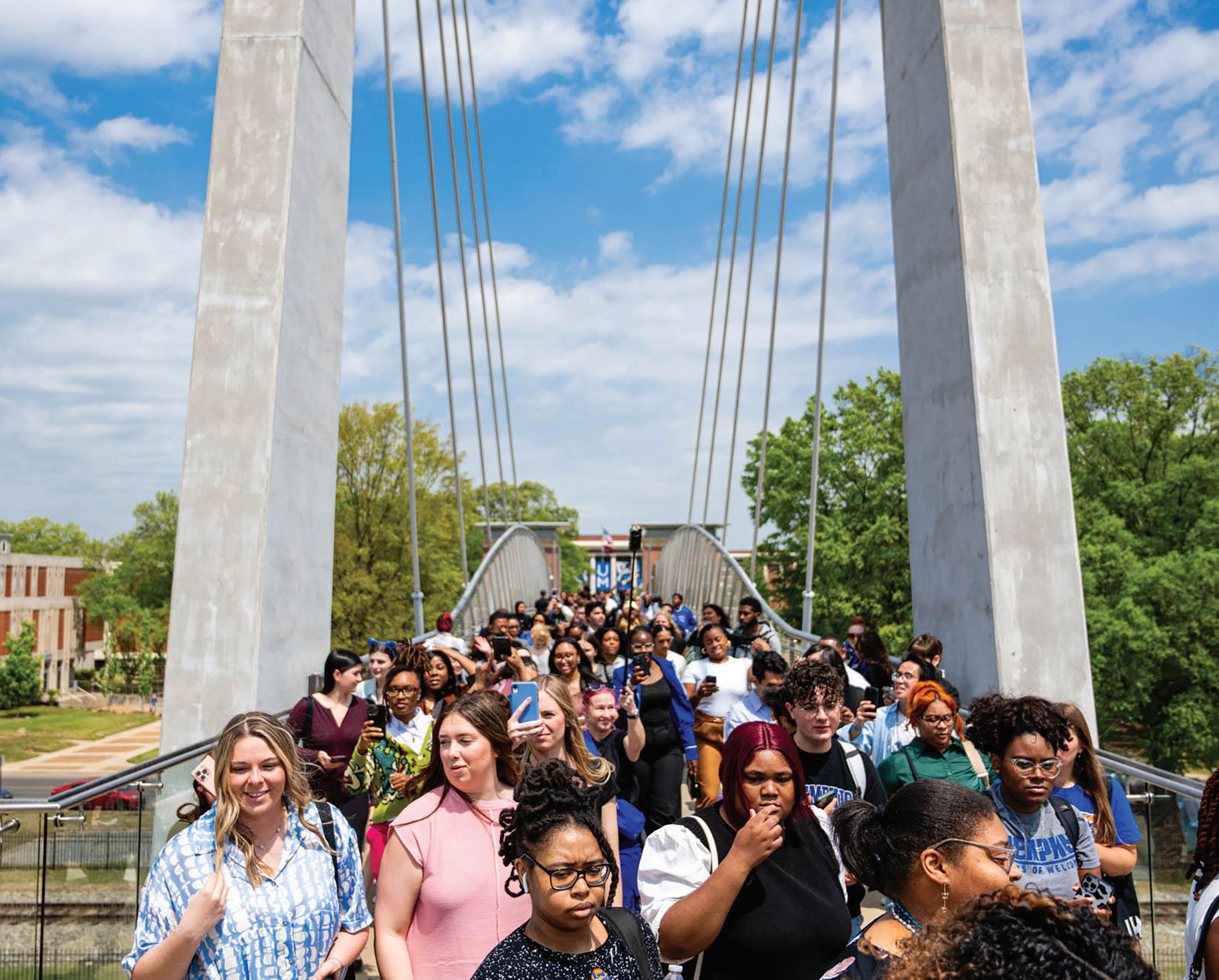
TIGER TRADITIONS




6 CAMPUS NEWS
Read the latest news from the UofM, including our faculty crossing $100 million threshold in research awards and the opening of the Edwards Research and Innovation Center (ERIC).
12 LAMBUTH NEWS
Faculty in the College of Education (COE) announced the completion of a model classroom at Varnell Jones Hall at UofM Lambuth.
16
HOME AWAY FROM HOME
Behind every milestone was a network of support that helped turn obstacles into opportunities at the Center for International Student Services for alumna Dr. Titilola Afolabi.
18 DRESSED FOR SUCCESS Career Closet initiative introduces a sustainable suit rental system.
30 EMERGING LEADERS
UofM celebrated more than 40 years of cultivating student leaders through the Emerging Leaders Program.

More than just events, traditions are at the heart of campus life. They create touchstones that last long after graduation.
32 McWHERTER LIBRARY
Ned R. McWherter Library celebrated 30 years of knowledge and community.
34 LITTLE PROGRAM, BIG IMPACT
The Department of City and Regional Planning celebrated 50 years of impact to the City of Memphis.
38
STREET NAMED AFTER FOOTBALL TRAILBLAZER
Glenn Rogers Sr. honored with street naming.
56 NEW LEASH ON LIFE
University Schools adopts Simone as part of pilot therapy dog program.
60 MAIN EVENTS
Explore photo highlights from the latest UofM Events.
PRESIDENT Bill Hardgrave
SENIOR VICE PRESIDENT AND CHIEF MARKETING AND COMMUNICATIONS OFFICER
Michele Ehrhart
EDITORS
Jackie Denton
Trent Shadid
masscomm@memphis.edu
CONTRIBUTING WRITERS
Robert Casper
Michelle Dry
Bridget Ellis
Heather Hampton
Parker King
Nia Rincon
PHOTOGRAPHY
Wendy Adams
Matthew Smith
ART DIRECTION AND DESIGN
Marlon Van Buren
MISSION
The University of Memphis is a comprehensive, internationally recognized, urban public research university preparing students for success in a diverse, innovative, global environment. Classified as Carnegie R1, the UofM is home to nationally designated centers of excellence in cybersecurity research and education, transportation workforce development, mobile health data as well as five Tennessee centers of research excellence.
The University of Memphis is governed by a 10-member Board of Trustees. The Board consists of eight members appointed by the governor of Tennessee, a faculty trustee elected by the faculty and a non-voting student trustee selected by students and appointed by the Board.
The University of Memphis’ name, seal, logos and Tigers are registered marks of the University of Memphis and use in any manner is prohibited unless prior written approval is obtained from the University of Memphis. The University of Memphis Magazine (USPS-662-550) is published once a year by the Department of Marketing and Communications of the University of Memphis.
POSTMASTER: Send address changes to Alumni & Development Office, The University of Memphis, 120 Alumni Center, Memphis, TN 38152-3760.
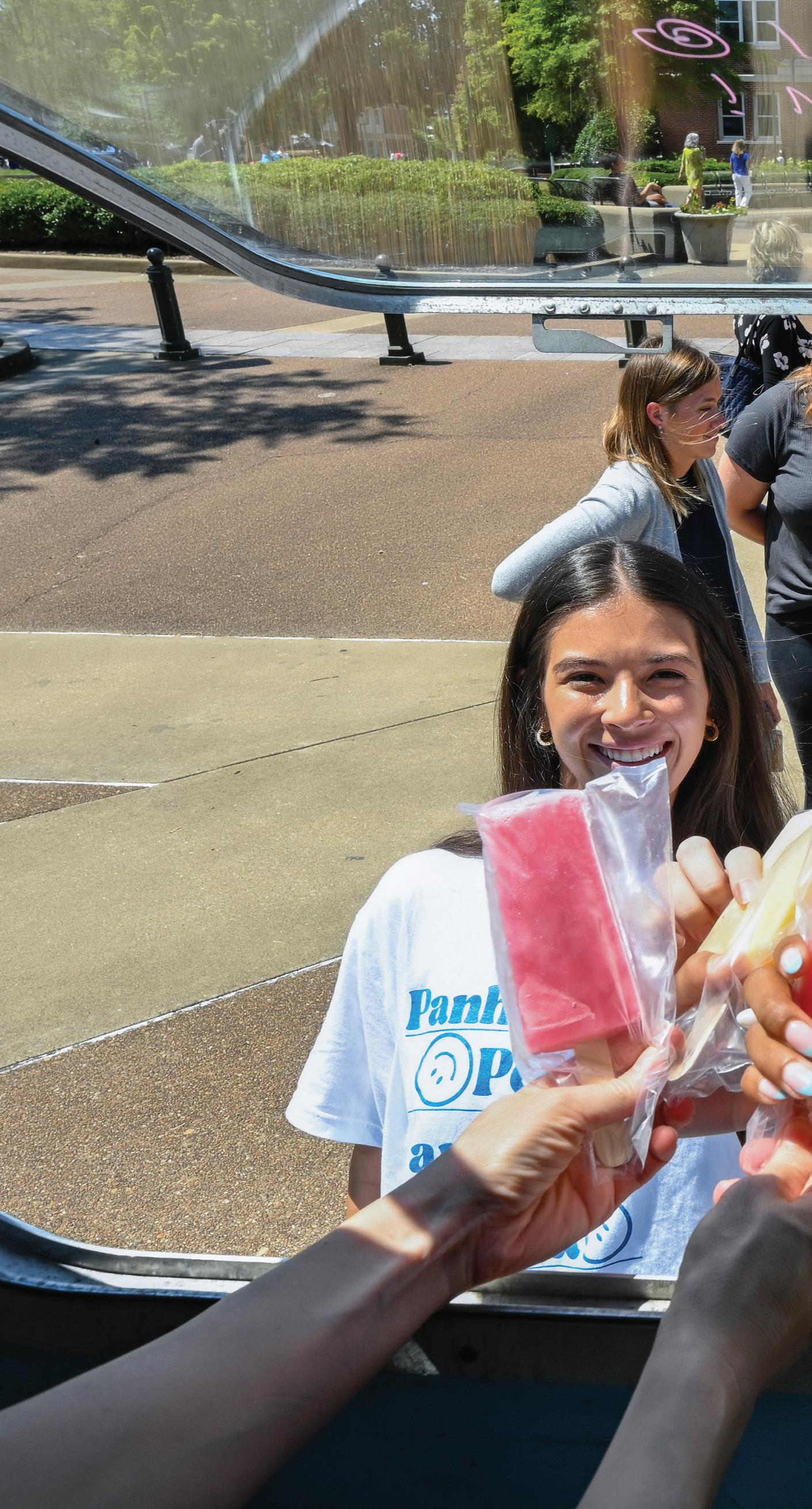
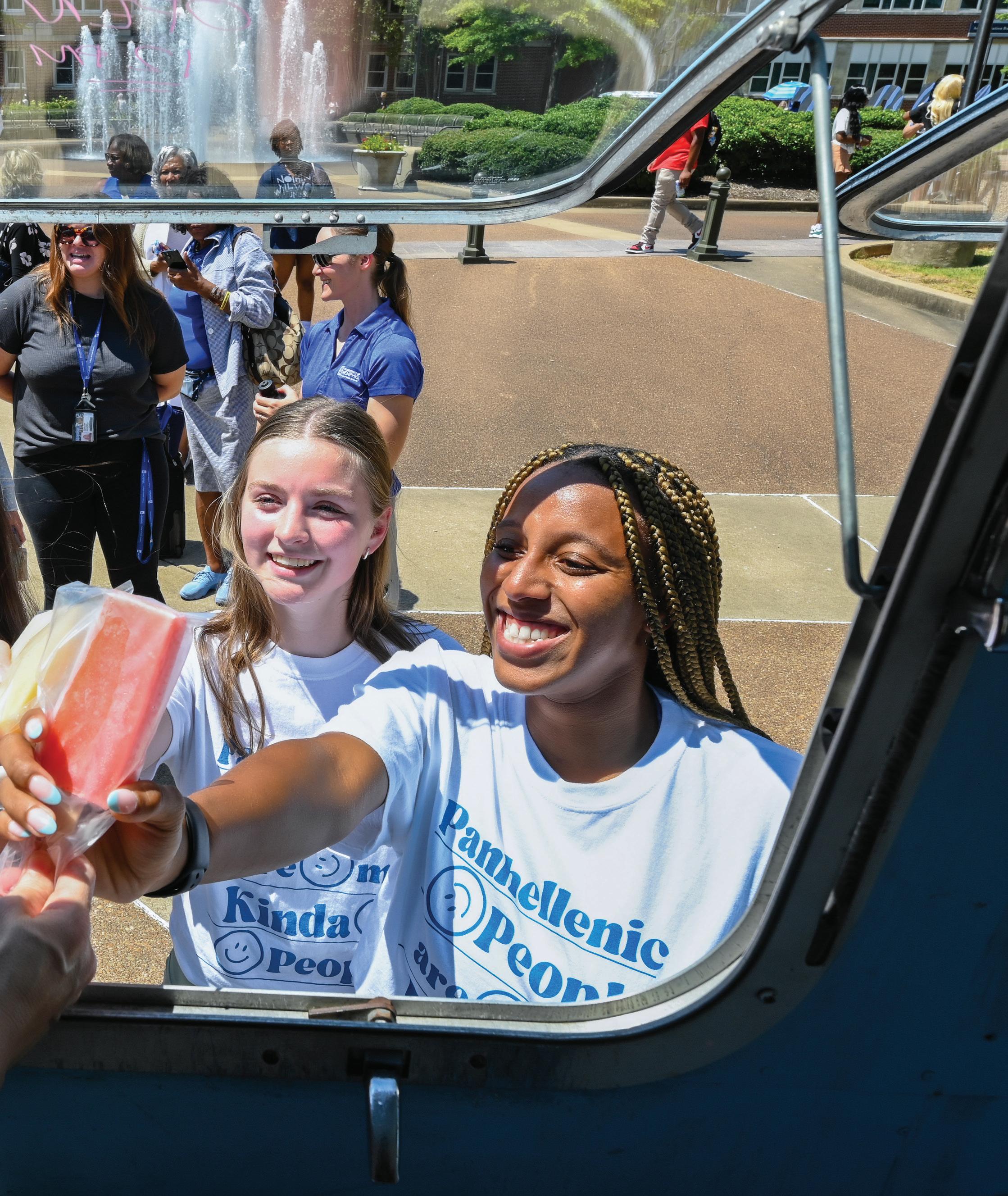

he University of Memphis recently established a commitment to create a successful outcome for every student. While this is an audacious objective, we believe it is the reason our University exists — to serve students.
This commitment starts with our campus community but also extends to our dedicated supporters within our city and beyond. In achieving successful outcomes for our students, we will see improvements in enrollment, revenue, state support and more.
There will not be another university in the country more dedicated to creating a successful outcome for every student than we are here at the University of Memphis. I am confident in saying that because I know the entire UofM community of faculty, staff, alumni and friends is willing to pull in the same direction to deliver on that commitment.
As we work to achieve successful outcomes for our students, we understand the important role traditions play in their higher education experience. We work hard to ensure our students have every opportunity to participate in experiences that will leave a lasting impact and create a true connection to our institution. This edition of the UofM Magazine goes in-depth on our traditions — some of which are wellestablished, and others newly created.
Among our newest traditions is The Walk, which welcomes our incoming students with a walk across the Hunter Harrison Memorial Bridge and into campus on the Luther C. McClellan Alumni Mall to signify the start of their collegiate journey in the fall. The Walk is completed in the spring when we bid our farewell to our graduates as they walk back across the bridge, symbolizing their next chapter as they take what they have learned at the UofM into their future. Both stages of The Walk are portrayed on our front and back cover.
Along with our traditions, research continues to grow and achieve new milestones at our institution. Our status as a Carnegie R1 university was recently reaffirmed, solidifying our place among the top research institutions in the nation. This classification has gone from an aspirational goal to an expectation in short order — a credit to our remarkable research faculty, staff and students who helped set an institution-record of a $101 million in research awards in FY24, more than doubling the amount received just two years prior.
The University continuously works to improve research space and building infrastructures. Last fall, we opened the Edwards Research and Innovation Center (ERIC) — a 65,000-squarefoot, state-of-the-art building housing STEM centers and labs and providing vital space for research collaboration across campus. We also opened the University Crime Information Center (UCIC), a fullservice center staffed around the clock with the capabilities to actively monitor campus safety. With a focus on safety, the University saw a 36% reduction in overall crime in 2024 compared to 2021.
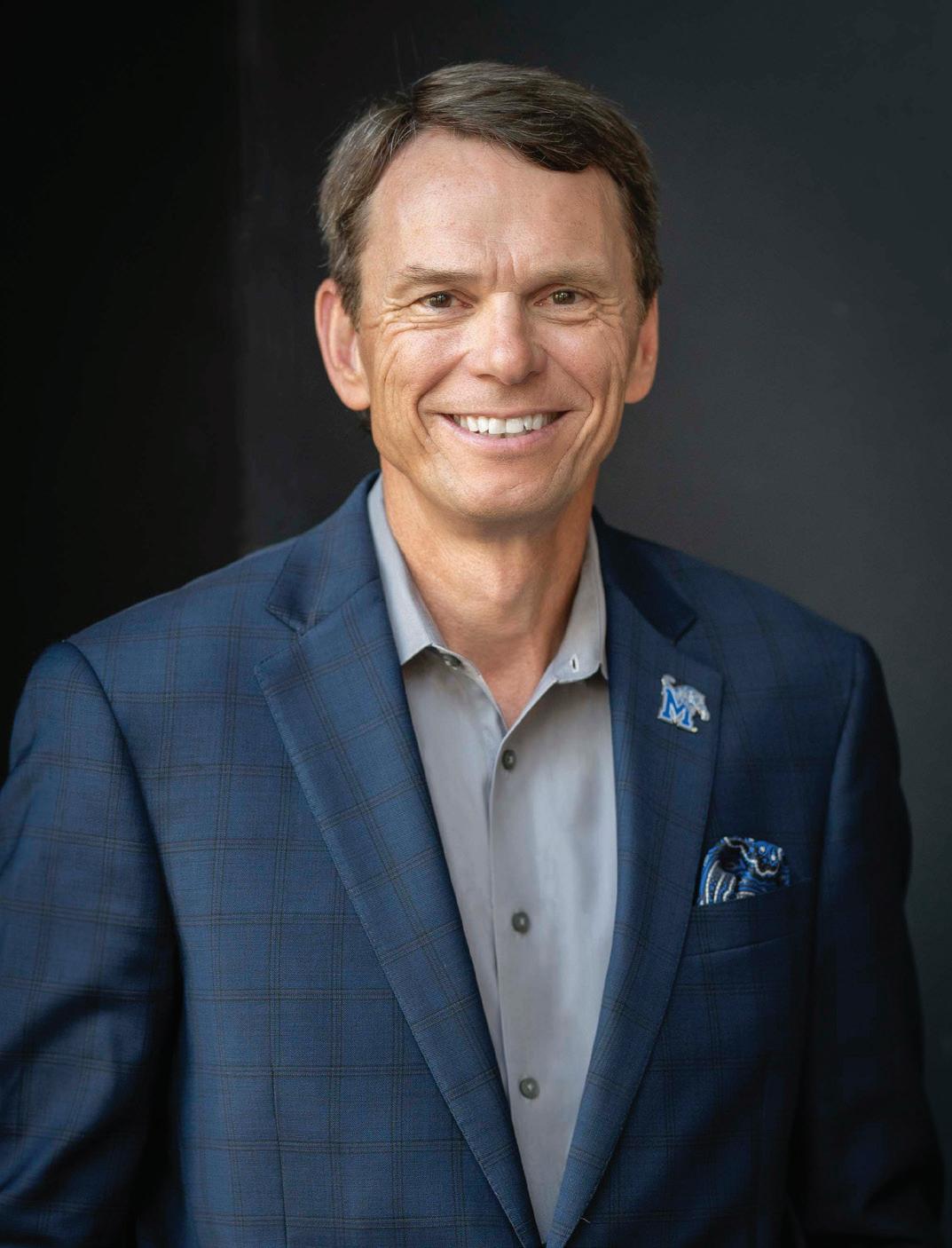
And while these accomplishments are impressive, the best is yet to come as we continue to work toward the goals of the Ascend Strategic Plan. Thank you for your continued effort and dedication to our institution, and for joining our commitment to create a successful outcome for every student.
GO TIGERS GO!
In athletics, our student-athletes combined to record our highest-ever semester GPA with a 3.4 in Fall 2024. Our football and men’s basketball teams finished their seasons in the Top 25 nationally, another first for our Tigers and a feat that only seven other universities accomplished this year.
Bill Hardgrave President
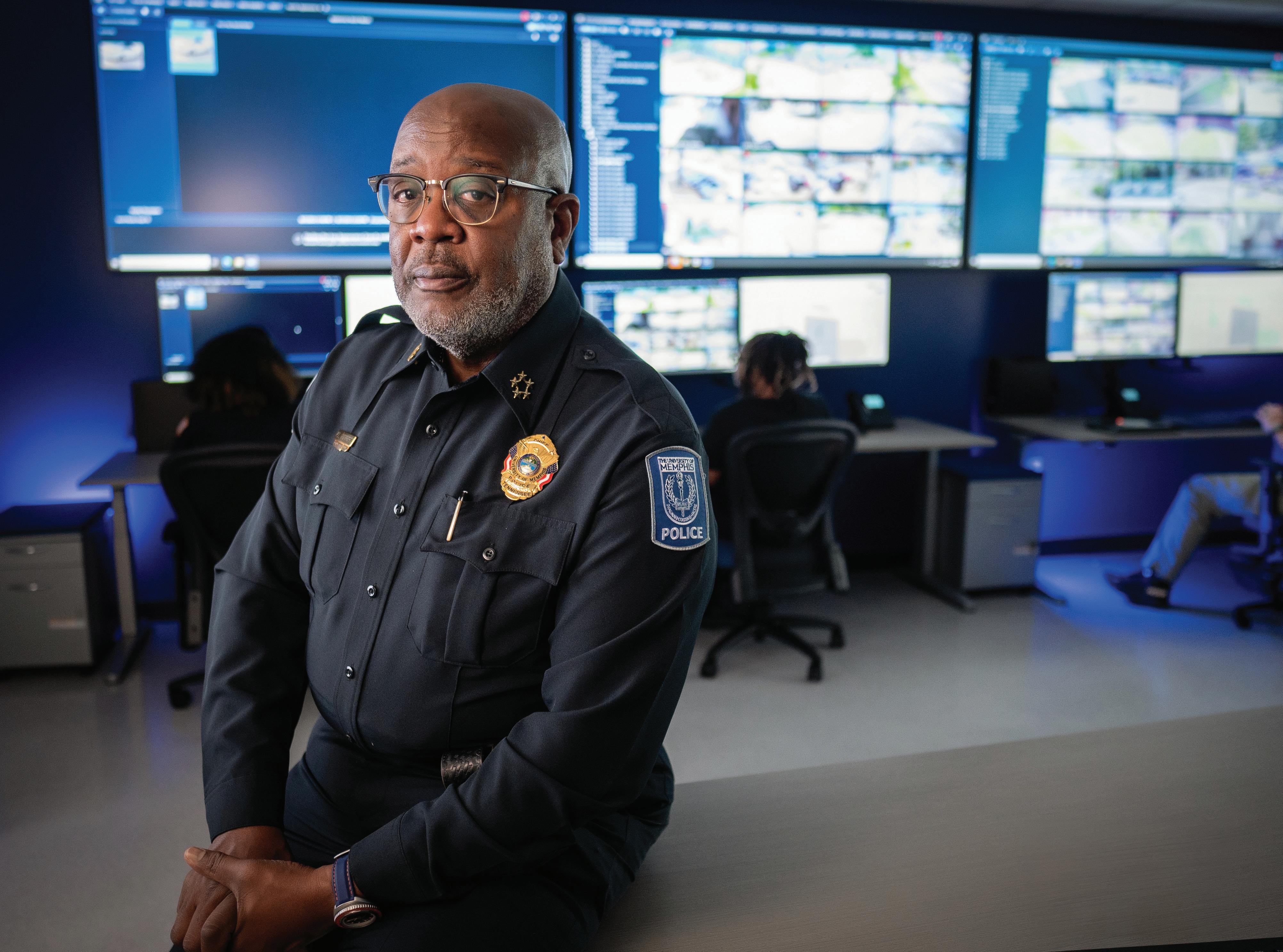
University of Memphis Police Services unveiled its new University Crime Information Center (UCIC), strengthening its commitment to ensure the well-being of the campus community.
The UCIC is a technology-infused hub that operates year-round to provide real-time data, enabling UofM Police Services to respond quickly and proactively to on-campus events and stop crime in its tracks.
“The mission of our University Crime Information Center is to provide our agency with the ability to capitalize on a wide and expanding range of internal technologies, which allows for efficient and effective policing for our University community,” said UofM Police Chief Keith Humphrey. “The center is a repository for technology resources that we utilized to ensure the safety of our campus.”

Students, faculty, staff, supporters and UofM Board of Trustees members gathered as the ribbon was cut on the new Edwards Research and Innovation Center (ERIC), a ceremonial moment ushering in a new era of innovation through interdisciplinary academics and research.
“My family and I are humbled by the recognition of our contribution to this,” said Trustee Douglas Edwards, the building’s namesake. “Our participation to this project came as a result of our belief that our great city deserves a great university, and a great university must have a robust commitment to research.”
A state-of-the-art building, ERIC will house a variety of STEM centers and labs from the Herff College of Engineering and the College of Arts & Sciences (CAS). At 65,000 square feet, ERIC will be the hub for the collection of academic disciplines that will develop economic opportunities, find solutions to the grand challenges we face as a nation, a planet and a people (water, food, energy, security, health and healthcare), and create new jobs for generations to come.
Led by a diverse community of research leaders, the University of Memphis has surpassed a key milestone in research growth for the first time, receiving more than $100 million in annual research awards.
This progress, combined with a total research expenditure of more than $100 million, is a testament to the vibrant and dynamic capacity of the University and its role as a national research leader.
Under the leadership of UofM President Bill Hardgrave and driven by the Ascend strategic plan, the UofM has more than doubled research awards in the last two fiscal years – from $48 million in FY22 to $101 million in FY24. This accelerated growth rate is thanks to the University’s role not only as an innovation ecosystem engine for the region but also its ability to execute federal and state programs in a compliant, fiscally responsible and timely way.
“We are proud of our faculty researchers who continue working hard to win nationally competitive research awards with their cutting-edge ideas, especially from federal research agencies,” said Hardgrave.
The University’s award total is comprised of more than 75% from federal agency sources.
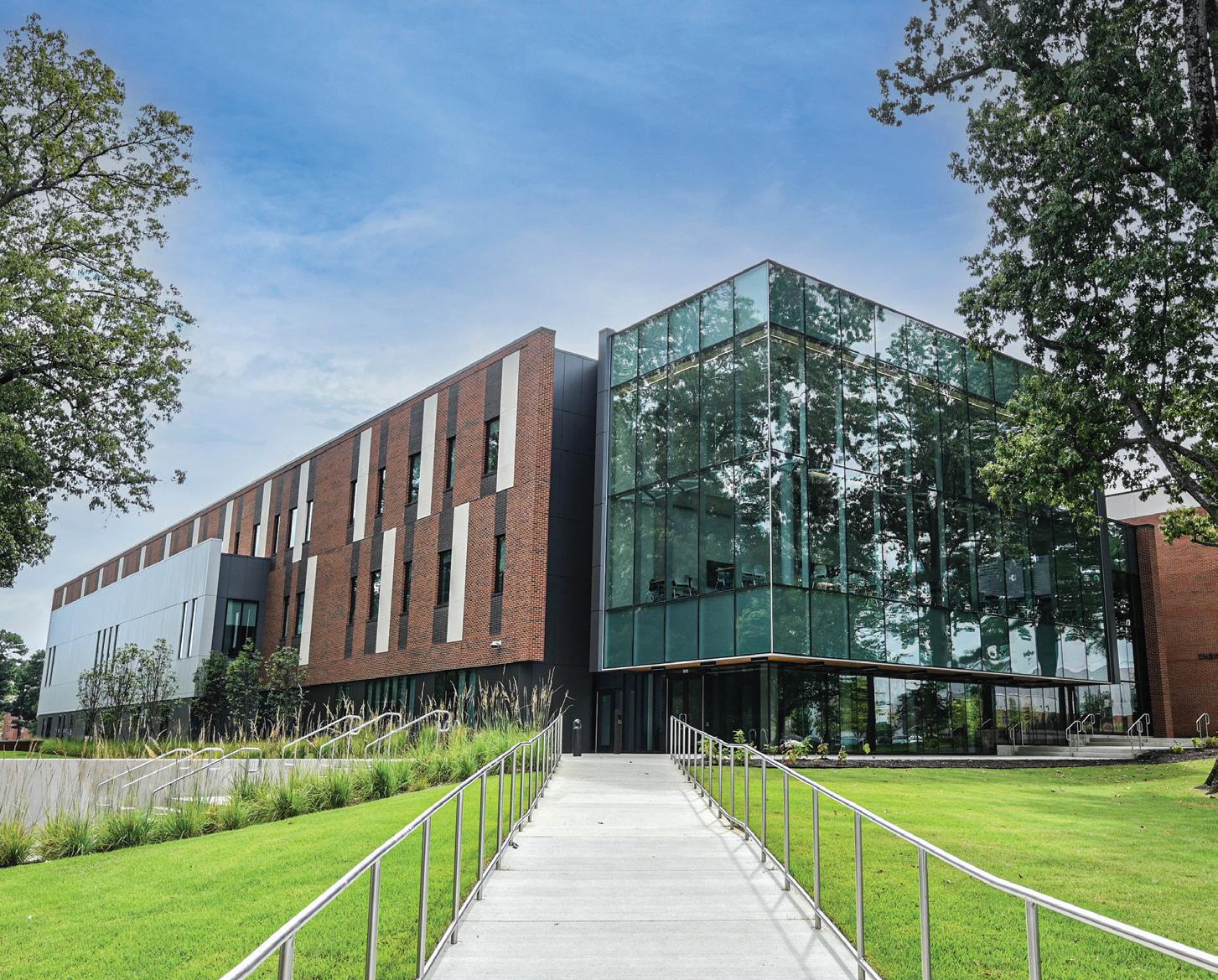
The University of Memphis ranks as the top institution of higher learning in Tennessee for student experience and social mobility, according to a recent Wall Street Journal/ College Pulse project that surveyed verified college students and recent graduates.
In the category of Student Experience, the UofM ranks 43rd with an overall score of 67.7. It was the only university in Tennessee, public or private, to break into the Top 50. The category looked at the best colleges in the U.S. for a student to have a great experience while attending. In the Social Mobility category, the UofM ranks 98th with a score of 35.4, also above its Tennessee peers. The rankings list colleges in order of how much they enhance their students' social mobility, rewarding universities that take in the highest proportion of students coming from lower-income families, while maintaining high graduation rates and having a positive impact on graduate salaries and minimizing the costs of attending the college.

The University of Memphis recently opened the Center for Electrified and Automated Trucking (CEAT) on campus, introducing its first IndustryUniversity Cooperative Research Center (IUCRC).
Sponsored by the National Science Foundation, CEAT is poised to lead the advancement of electric and autonomous vehicle technologies in the freight and transit sectors. Bringing together academia and industry, CEAT aims to address the complex challenges facing the trucking industry, with a strong focus on electrification, automation and workforce development.
“My background has been spent working at the intersection of the academy and industry and I understand the value when you get those two groups together,” said UofM President Bill Hardgrave. “To me, this is the type of thing where the magic happens.”
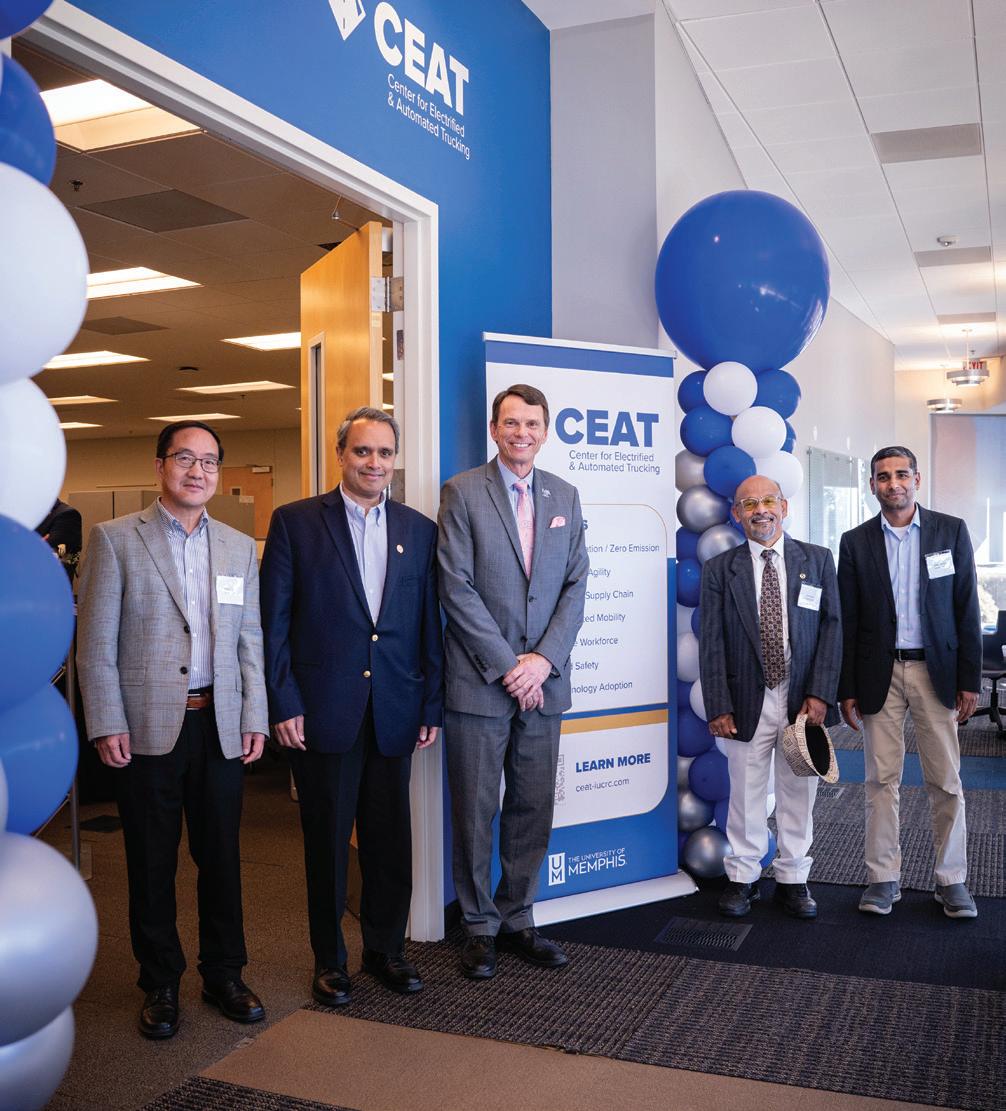
University of Memphis officials and supporters gathered under a clear fall sky, to break ground on what is only the second project of its type approved in Tennessee — a publicprivate partnership that will introduce true apartment-style housing to campus, expanding residence life options for UofM students.
The complex, which will open in the fall of 2026, is a partnership between the University and The Annex Group, a national developer.
The student housing development, which will include 540 beds, will be part of the Park Avenue Campus. The housing available to students and student-athletes will consist of four-bedroom, two-bedroom and studio-style units. It will include study spaces, social spaces and outdoor living areas along with other amenities such as grab-and-go dining options. This new project will provide unparalleled residential experiences for students to learn, study, play, relax and grow.

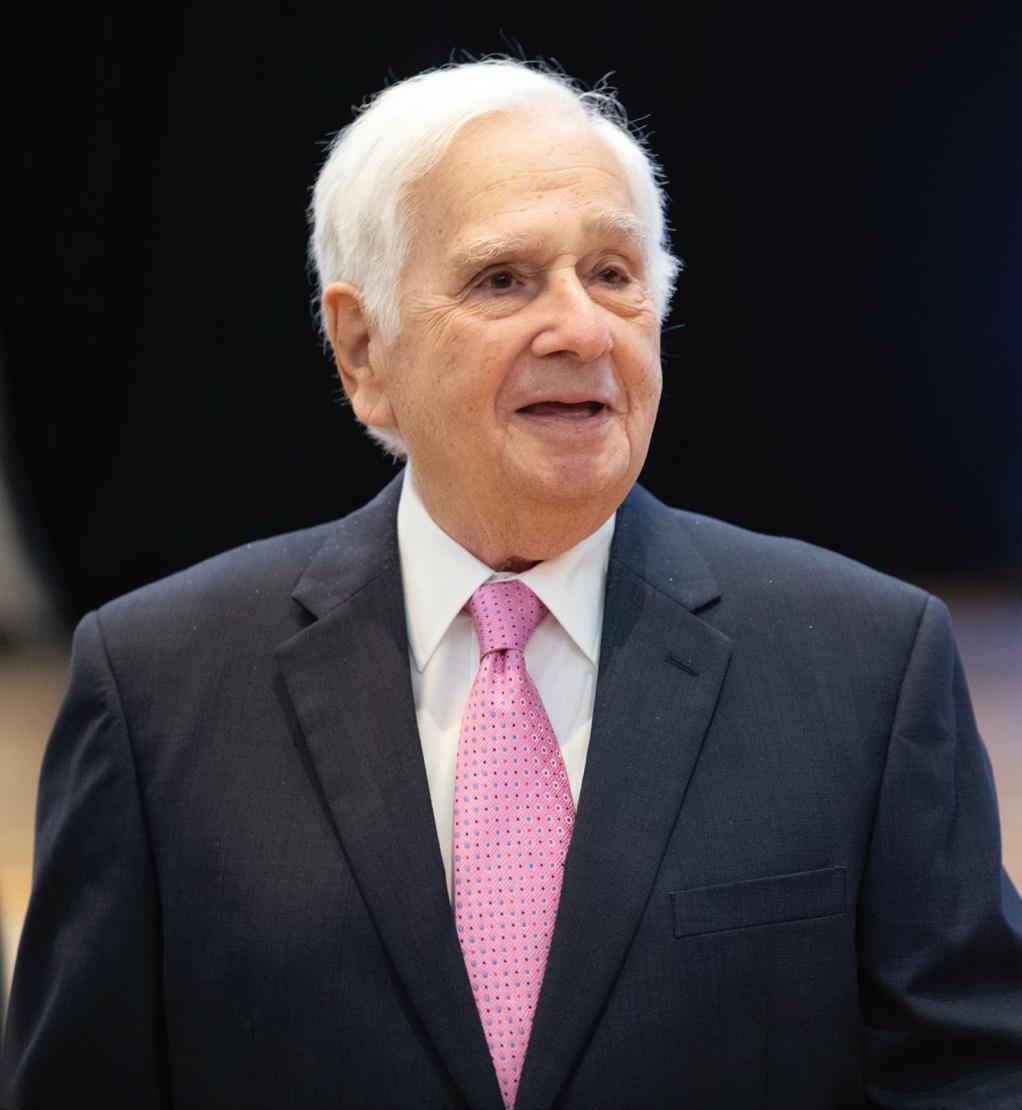
Longtime University of Memphis supporter Avron B. Fogelman is committing $10 million toward the future modernization of the Fogelman College of Business & Economics (FCBE). This marks the single largest commitment FCBE has ever received and one of the largest commitments in the history of the University of Memphis.
Fogelman’s generosity helps elevate FCBE to national prominence and serves as a catalyst for others to join in shaping the college’s future.
Avron B. Fogelman, Founder and Chairman of Fogelman Properties, has a long legacy of impact at the UofM. Starting in 1973, Avron and his brother, Bobby, first supported the University by endowing the Morris S. Fogelman Chair in Real Estate. In 1980, in honor of their continued commitment, the College of Business Administration was officially renamed the Fogelman College of Business & Economics. Avron has also supported the UofM through the Avron B. Fogelman Center for Professional Career Development, the Avron B. Fogelman Scholarship Program, the Fogelman Executive Center, which now houses the University Middle and High Schools, and the FedExPark Avron Fogelman Field.
The University of Memphis presented the launch of the new workforce-focused Polytechnic initiative at the UofM during its first quarterly Board of Trustees meeting of 2025. Pending approval from the Tennessee Higher Education Commission (THEC), The Polytechnic @ UofM initiative will be a subunit within the Herff College of Engineering slated to launch July 1.
The Polytechnic @ UofM will expand the University’s applied technology degree portfolio and will be housed within the Herff College of Engineering in collaboration with the College of Professional and Liberal Studies (CPLS) to provide enhanced pathways to enter UofM applied technology programs including students attending Tennessee Colleges of Applied Technology (TCATs), community colleges as well as returning learners.


University Schools and St. George’s Independent School have partnered to transition the St. George’s Memphis Campus to the University’s new Innovative School District, beginning with the 2025-26 school year. The University of Memphis Board of Trustees voted to approve the acquisition of St. George’s location at 3749 Kimball Avenue in Memphis, Tenn.
The elementary school will operate under the new name “Campus School Kimball.” This marks the first elementary school opened by the University of Memphis since the founding of the Training School, alongside the founding of the University, in 1912.
The launch of Campus School Kimball was made possible by last year’s Innovative School District Act, a bipartisan legislative effort (SB 2557 and HB 2678) led by Representative Mark White (R-83) and Senator Brent Taylor (R-31) which authorized the University of Memphis to operate a local education agency, or LEA, as the state’s first Innovative School District.

Socialize, network and reminisce through our REGIONAL NETWORKS or AFFINITY CHAPTERS - it’s easy to find a group that’s right for you.
Enrich your University experience through multiple events each year that serve to connect you with old friends and forge new connections.


By Parker King
The pre-residency teaching candidates at the University of Memphis Lambuth Campus now have a tool to better prepare them for advanced coursework and residency. Faculty in the College of Education (COE) announced the completion of a model classroom at Varnell Jones Hall, creating an atypical classroom for education students.
“The connection of the immersive experience is what’s going to make this place unique,” said Dr. Tiffany Lonoza, a clinical assistant professor at UofM Lambuth.
Dr. Sandra Cooley-Nichols, chair of COE’s Department of Instruction and Curriculum Leadership (ICL), came up with the idea during a department faculty meeting. Lonoza and fellow Lambuth faculty member Dr. Torre Kelly acquired funding from now retired COO and Dean of Lambuth Campus Dr. Niles Reddick and went to work putting together a setting


that looks nothing like a college classroom — and that’s the point. Interactive presentation boards, table groupings, even a small library with children’s books help students feel, as Lonoza puts it, “more connected to the profession.”
“(Pre-service teachers) now have access to modern classroom technologies and are encouraged to use these tools in their instruction. Teaching in this environment gives them the opportunity to sharpen their skills,” she said.
Currently, UofM Lambuth offers two Bachelor of Science in Education (BSEd) programs: Teaching All Learners (TALN), which gives dual licensure in Elementary (K-5) Education and Special Education for K-8 or 6-12 settings, and Educational Careers, a non-licensure program for students interested in working in education without earning a teaching license.



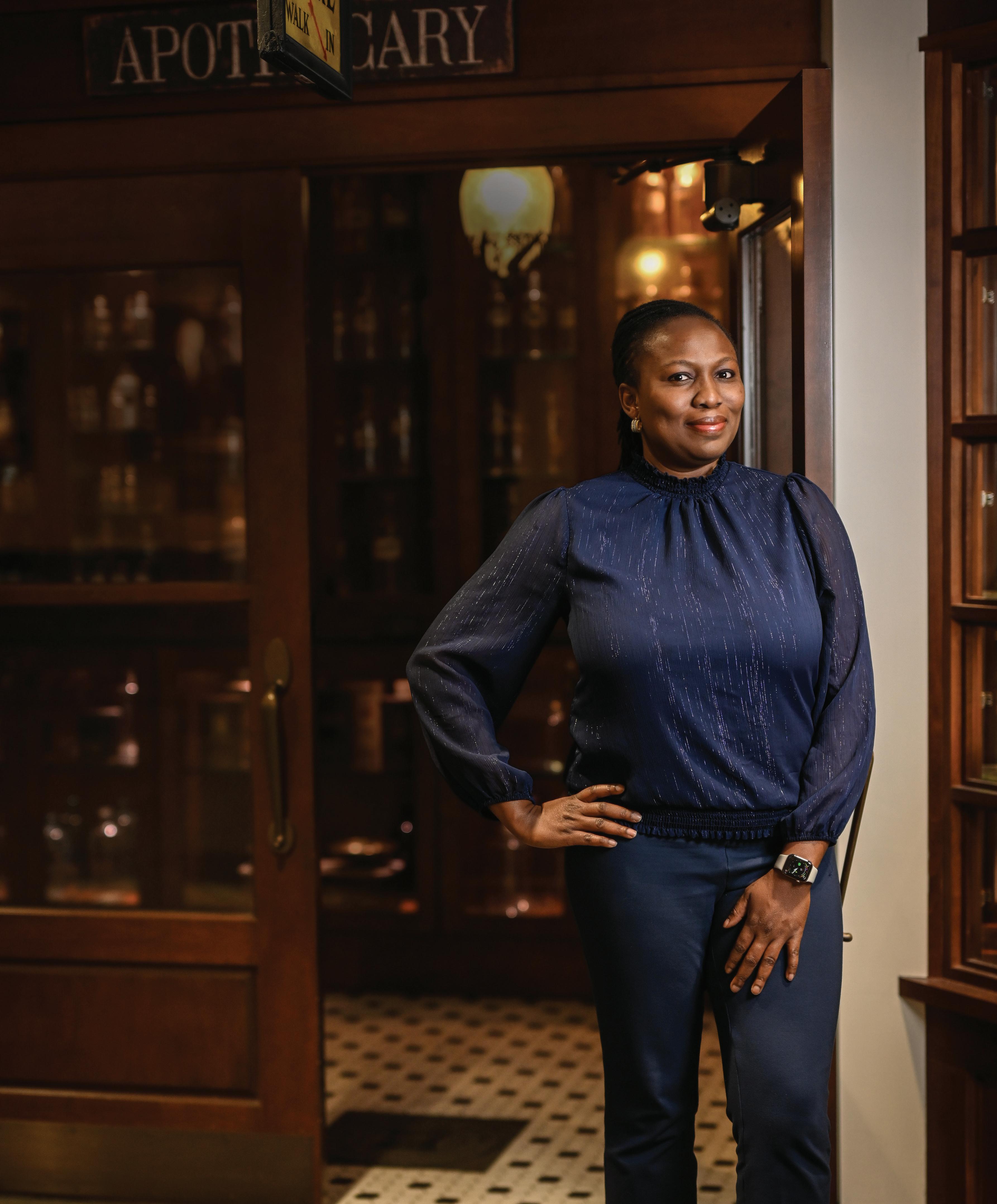
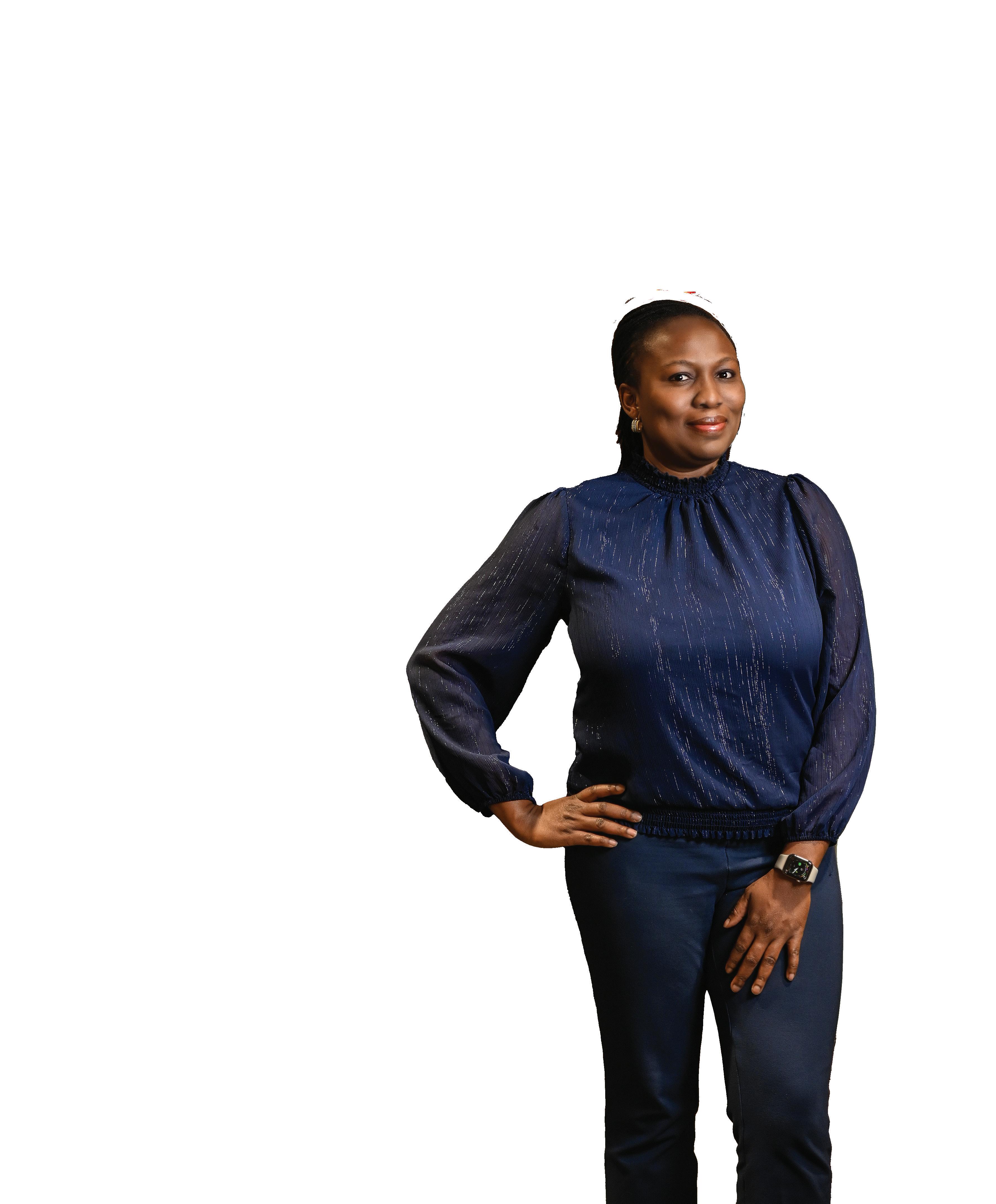
Behind every milestone was a network of support that helped turn obstacles into opportunities. That support came from programs like the Center for International Student Services (ISS) at the UofM. The center is designed to guide students like Afolabi through the unique challenges of studying far from home. While her story is deeply personal, it echoes a broader experience shared by many international students navigating life at a new university.
If you were thousands of miles away from home and in need of support, what would you do? Who would you turn to if your family and friends were unreachable, and you were immersed in another language? This is the reality for hundreds of international students who attend the University of Memphis. Thankfully, these students can turn to the ISS. From the moment they’re enrolled, they have support, resources and a distinctive community waiting for them on campus.
It's so crucial that the University continues to support the ISA and the ISS to encourage diverse groups to be a part.
-
Dr. Titilola Afolabi
ISS’s mission of fostering multicultural connections and promoting global perspectives creates opportunities for all students to learn from one another about different cultures and new perspectives. The result is a more dynamic, welcoming campus where students from all backgrounds can share ideas and experiences. In an increasingly interconnected world, the ability to understand and engage with different cultures is more important than ever.
“Growing up in a homogeneous society where most people looked like you, most people spoke the same language as you did, and coming to a place where you have individuals from every aspect of life,
different racial groups and different cultural backgrounds, I think that was one thing that really struck me about the United States,” Afolabi said. “It is such a great environment to meet people not like you and explore different cultures. Some of my closest friends are from South America or from Asia, and we've maintained close relationships since our time at the University of Memphis.”
The connections and support through ISS allowed Afolabi to explore the ways she could make an impact on campus. The ISS staff encouraged her to maximize her leadership potential and build on the connections she had already made.
“As international students, loneliness, feelings of isolation, mental health care and not being able to advocate for yourself because you just don't know how are major struggles,” she explained. “That was something that I felt like I understood very clearly.”
With the support of the staff, Afolabi became a resident advisor and helped other students navigate the ups and downs of university life. She credits this experience with the development of her leadership skills.
“Through this connection, I've been able to expand my mind beyond what I grew up knowing, and I think that has made me a better professor,” she said. “I have students from all over the world and because of my experiences with the International Student Association and the various countries that were represented, I'm able to interact with students and say, ‘Oh yeah, I've tried that food before and I love it,’ and they're able to better relate with faculty.”
The benefits of the ISS don’t solely affect students attending from other countries. Forming friendships with international students offers domestic students a chance to think bigger and challenge assumptions. Through changing perspectives, students have the ability to step outside their comfort zones, question what they think they know and appreciate different perspectives that can reshape the way they view problems, opportunities and even themselves. Whether it’s a casual conversation about traditions, a debate on global issues or simply learning a silly phrase in another language, these interactions broaden perspectives in ways that textbooks never could.

“It's so crucial that the University continues to support the ISA and the ISS to encourage diverse groups to be a part,” Afolabi said. “It’s really good that Americans can also learn and get a piece of the world outside the country without having to leave. Because I was a resident advisor, I met so many different individuals where we were able to share my home country's Jollof rice together, cook together, learn about each other and learn about Memphis.”
Afolabi has even witnessed friends who met through the ISS get married and have children. To maintain their close-knit circle, the group takes annual trips and explores the world together. Through it all, Afolabi and her friends have maintained a deep love for the UofM and for the city that brought them all together.
“That's the legacy of the ISS and International Student Association, and it reflects positively on the University of Memphis,” she said. “We're always going to be Tigers, no matter where we are. Every time we go out and people see an Indian, a South American, a European and an African hanging out together, I promise you somebody's going to ask, ‘How'd you guys know each other?’ That's when we talk about the University of Memphis as our home for establishing such strong friendships.”
The Career Closet initiative, spearheaded by the University of Memphis Office of First-Generation Student Success (OFGSS), has unveiled its next chapter — a sustainable suit rental system. It was announced at the OFGSS’s First-Gen Panel on March 27.
The new Resources for First-Generation Success and Employment (R1SE) initiative includes a suit checkout system designed to provide free access to professional attire for all UofM students. Whether a student is preparing for an important interview, heading to an internship or simply wanting to look their best, everyone should have the opportunity to present themselves with confidence.



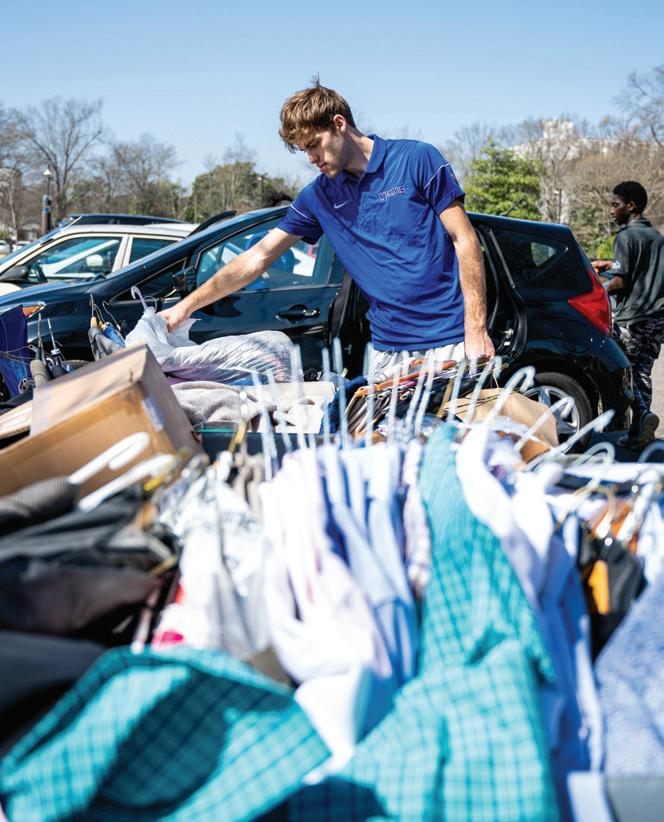


Jacki Rodriguez, director of The Office of First-Generation Student Success, has successfully grown the UofM First-Gen office and its initiatives and helped it to become nationally recognized as a First Forward Champion university. A designation afforded to only 14 universities out of a First Forward network of over 400 universities. As a first-gen student herself, Rodriguez navigated the unfamiliar landscape of college without guidance or practical expertise. Her work with UofM first-gen students provides the support and knowledge they need to have a meaningful and successful college experience.
“I didn't really know what I was doing, didn't know what a major meant or what career to pursue,” Rodriguez explained.
“I did a lot of exploring, a lot of mistakes here and there, but what I did discover is it did prepare me for this role.
The mistakes are actually part of the opportunity.”
The career closet is a lifeline for students who can’t afford professional attire, but it’s just one part of a much larger, deeply impactful support system — the OFGSS.
“I love being first generation, but I knew there were so many barriers, and I wanted to have an opportunity to be part of that process to help students that are coming through,” Rodriguez said.
The creation of the Career Closet came from understanding these unique barriers. Rodriguez works closely with first-gen student mentors who come through the office as freshmen and then eventually show fellow first-generation students the ropes.
The initial Career Closet idea was born to meet a growing need to provide students with business attire who couldn’t afford them.

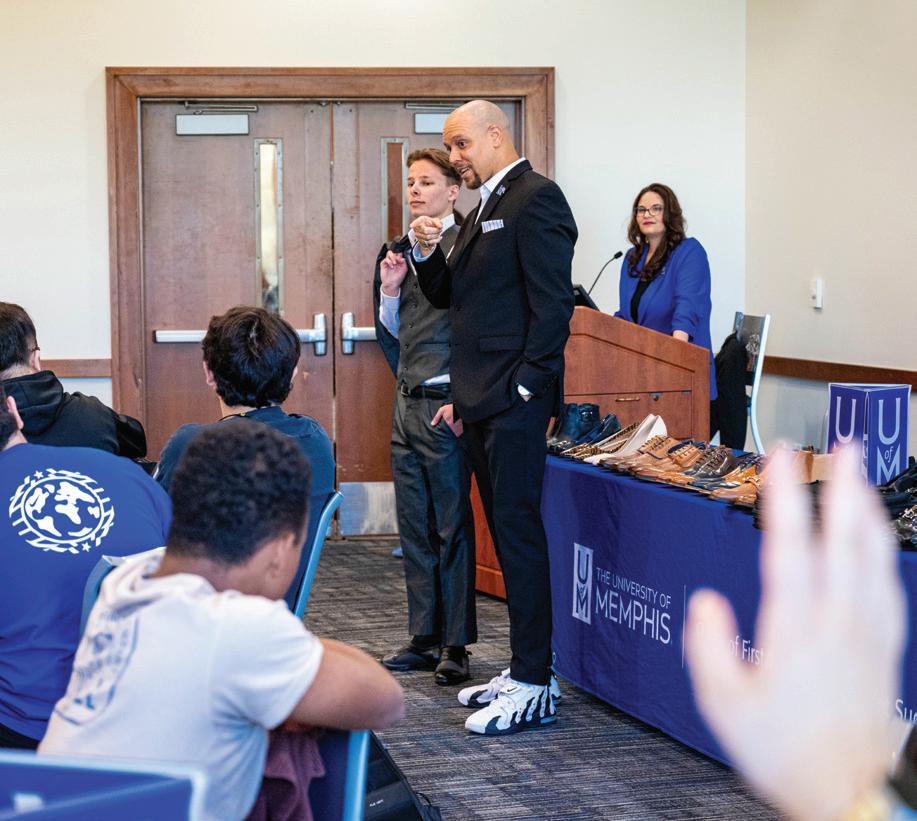

“A student who wanted to go to a career fair had seen fliers that said you have to wear formal attire,” Rodriguez said. “Well, they couldn't afford the formal attire, so that was one of the reasons they felt like they couldn't go. But a suit is also for internships and for confidence.
“Growing up First-Gen and not having the money for a suit, I understood that. So, something that I talked about with my peer mentors is that it's a community. We come together and we say, ‘OK, what's the need? How can we meet it?’ We knew that we had enough alumni that we could start the donation drop-off process.”
The Career Closet is a success thanks in part to the donations. More than 10,000 donations were made by alumni, friends and other members of the community in the fall of 2024. The monumental turnout of the first drive left Rodriguez and her student mentors with more clothes than they knew what to do with. Meeting this often-overlooked need opened the door to creating more connections and helped spread the word about the office around campus.
These articles include suits for men and women, dress shirts and

blouses, pants, purses, ties, belts and shoes in a variety of sizes.
“We have to continually fill those donations, and sometimes we run out of the sizing, so we wanted to make sure that we had enough sizes for every UofM student who has a need,” Rodriguez said.
The next step was to make the career closet sustainable. A donation from longtime UofM supporter Hal Fogelman allowed for the purchase of brand-new suits and the beginning of a suit checkout system.
“We were able to purchase in bulk from JCPenney four suits in each size for men and women,” Rodriguez said.
“JCPenney gave us an excellent discount. We got half off on the suits and we were able to buy them in bulk and get them shipped here. Now, we have to implement the checkout system. We're going to be working with ITS and our Computer Science and Engineering students in the OFGSS to get it on our website and to create an inventorybased system so that we can always see how many sizes we have and where they're at,” Rodriguez explained.
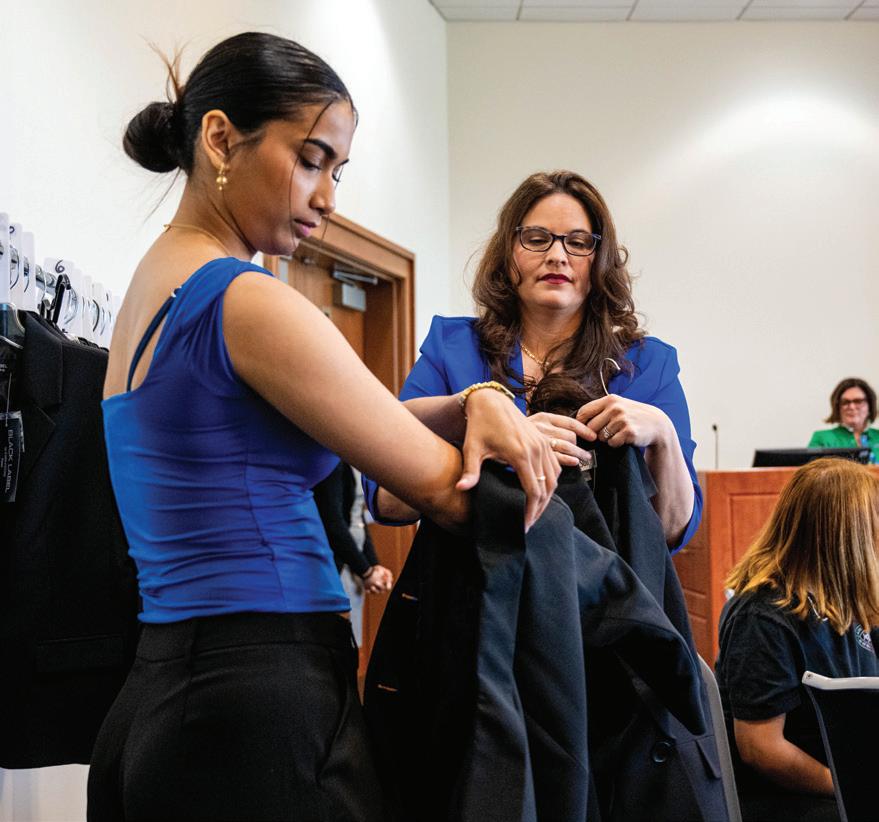

Students can checkout suits for up to four days, even over the weekend.
Additional funding from the donor will help initially cover the dry cleaning cost between rentals. The success of OFGSS’s MomentUM campaign purchased the hanging racks to house the suits in Mitchell Hall.
The career closet is an essential resource that offers more than just clothes; it gives students confidence in themselves and their ability to succeed. It strengthens the bonds between the Tiger community and serves as a reminder of what the power of compassion can make possible.
To learn more about ways to support the Career Closet or to schedule a clothing donation, contact OFGSS at firstgen@memphis.edu .
Nia Rincon and Bridget Ellis contributed to this story.





by Nia Rincon
A group of wide-eyed freshmen sit huddled around a campfire together. Absent of concrete, cars and cell phones, they are surrounded only by the forest and their peers. This is the first experience many of them have ever had in the wilderness, and some of them are unsure of themselves.
An older student excitedly shows them the steps to a stroll known only to the participants of this beloved UofM tradition. The students loosen up and begin to joke around as they practice the stroll for themselves. This is the beginning of Frosh Camp, an annual camping excursion designed to help new students feel comfortable and empowered on campus.
Through this experience, these students will come to campus with new friends and new confidence in themselves. They will carry the memories of this time with them for the rest of their lives. Some will remain friends with their cabinmates long after graduation, and some will even find their future spouses thanks to Frosh Camp. And this program is just one piece of a larger history.
More than just events, traditions are at the heart of campus life. They create touchstones that last long after graduation. These moments shape the college experience for countless Tigers. The same chants, rituals and celebrations that once made freshmen feel at home continue to unite alumni decades later.
When a new student learns the fight song or a professor walks in the same Homecoming Parade they have attended for years, they follow in the footsteps of the thousands that came before them and become a part of something larger than themselves.
As one of the UofM’s longest-standing traditions, now in its 30th year, Frosh Camp has touched the lives of thousands of students.
Sara Thatcher — a former head camp counselor, current director of corporate communications at Medtronic and member of the UofM Alumni National Board — credits traditions like Frosh Camp and Up ’til Dawn with helping her forge lifelong connections and memories.
“When you are at Frosh Camp, they have fireside chats. The campers would sit with the lights off in their cabin and light their little candle and have time for facilitated conversation with the counselors. Just asking the freshman every night, ‘How was your day? What did you learn? What are you thinking?’” she recalled.
“I think it was in those small moments where you actually feel the fabric of people really coming together, the relationships really starting to form and the connection to the University of Memphis starting to grow. I think that it makes people more successful when they're actually in school. They have somebody they can turn to. They don't feel alone when they're coming in, and they have a sense of the type of school that they have signed up to attend, and they feel confident about the choice that they made.”
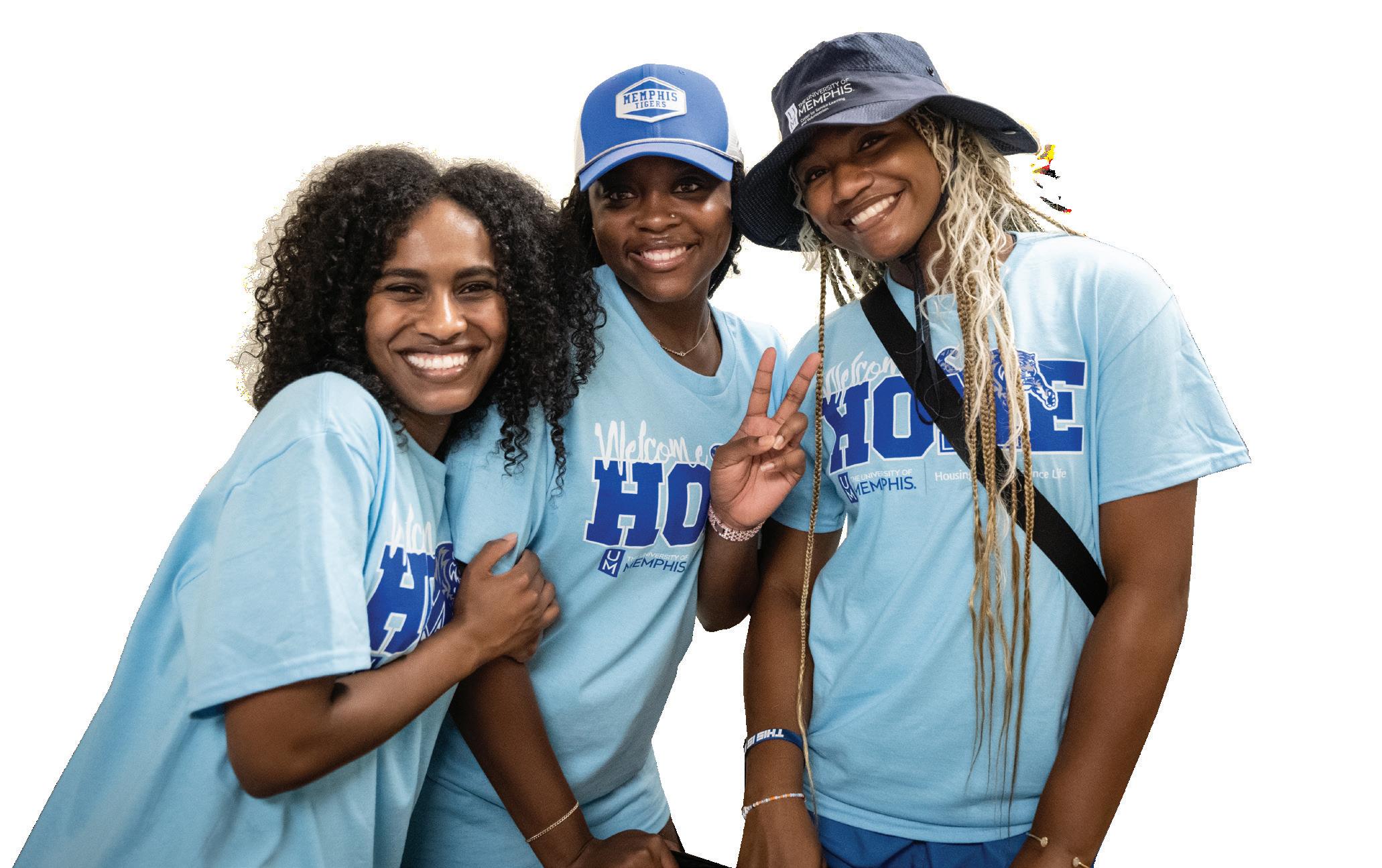






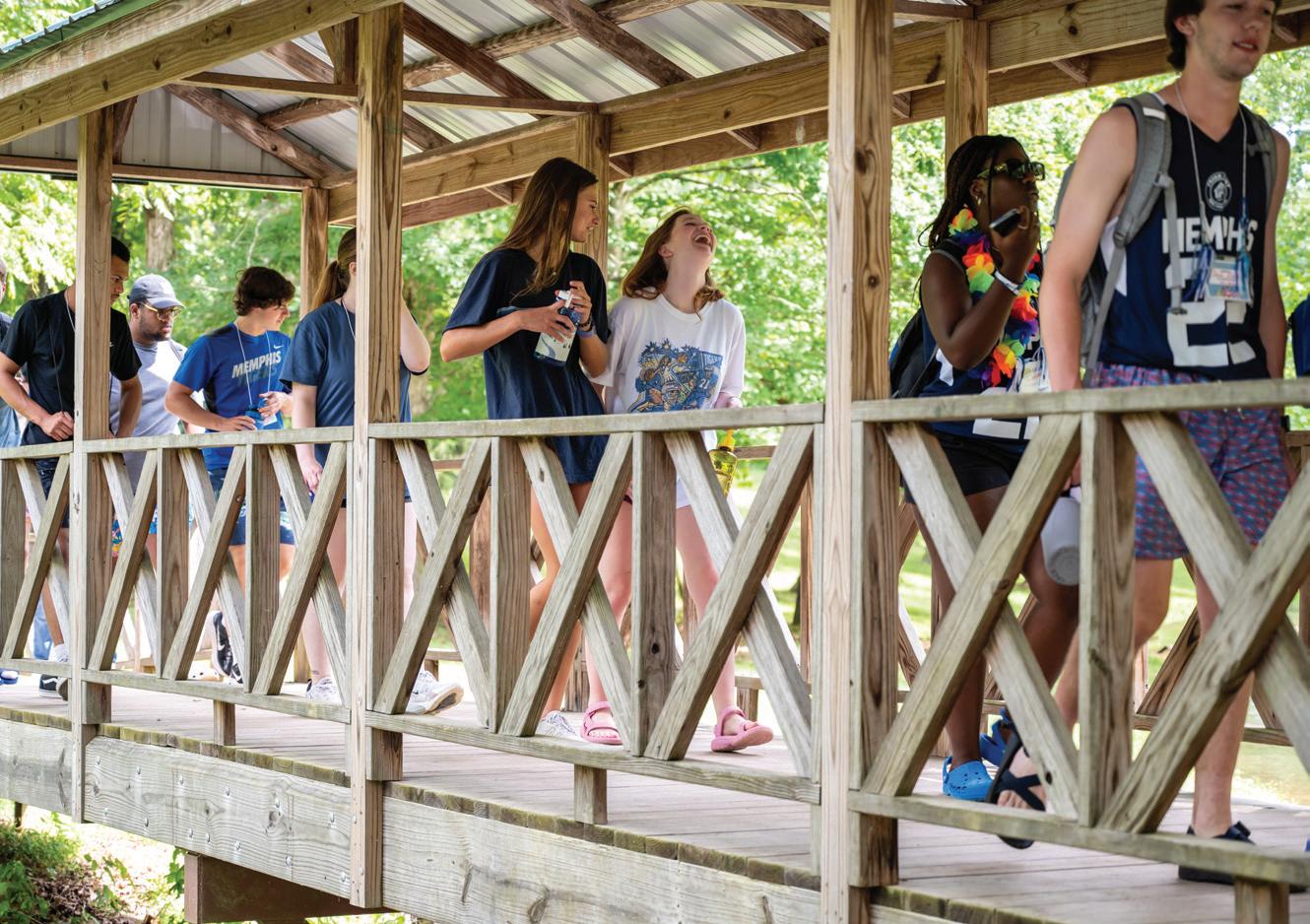


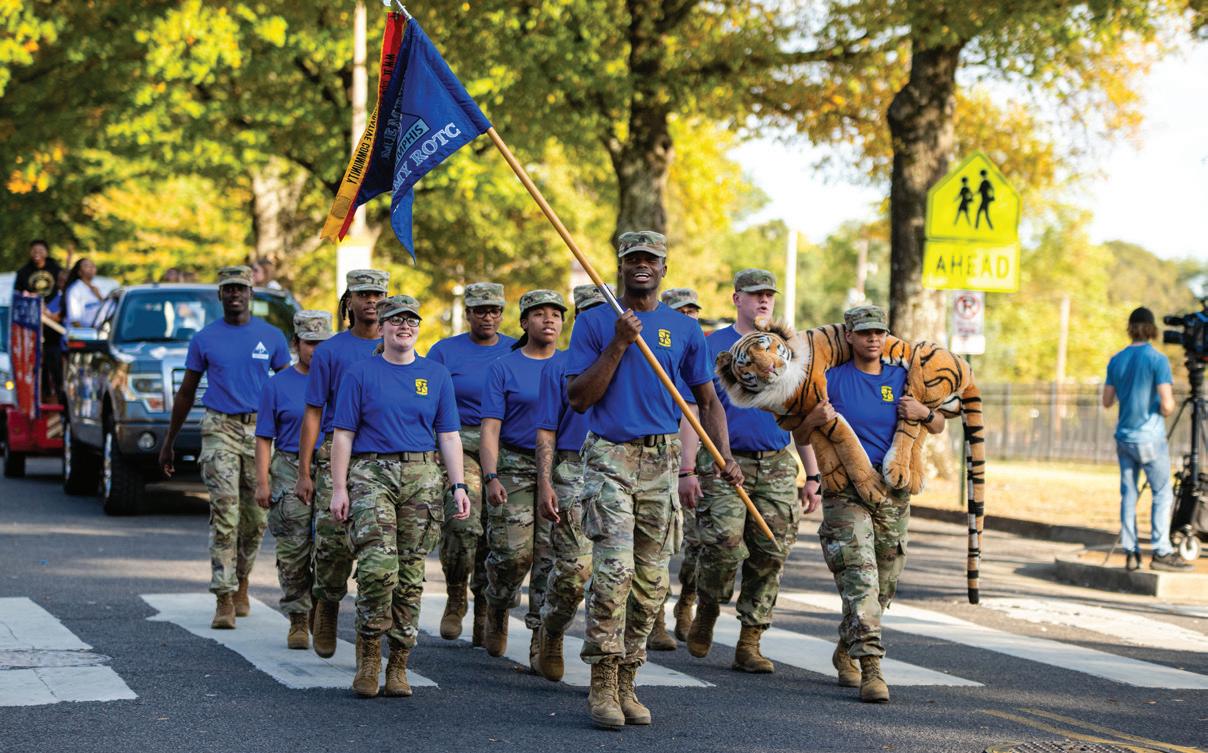

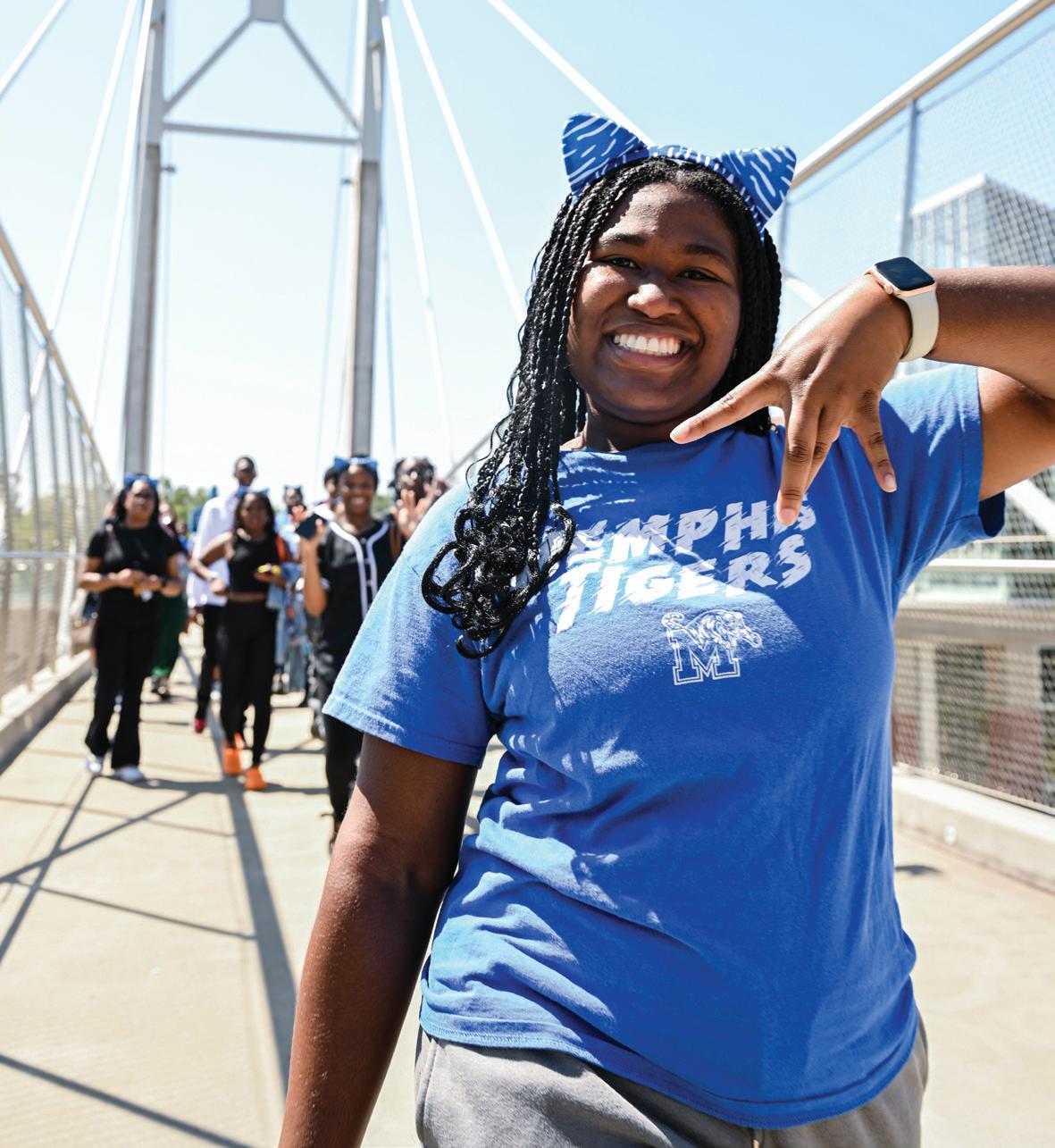
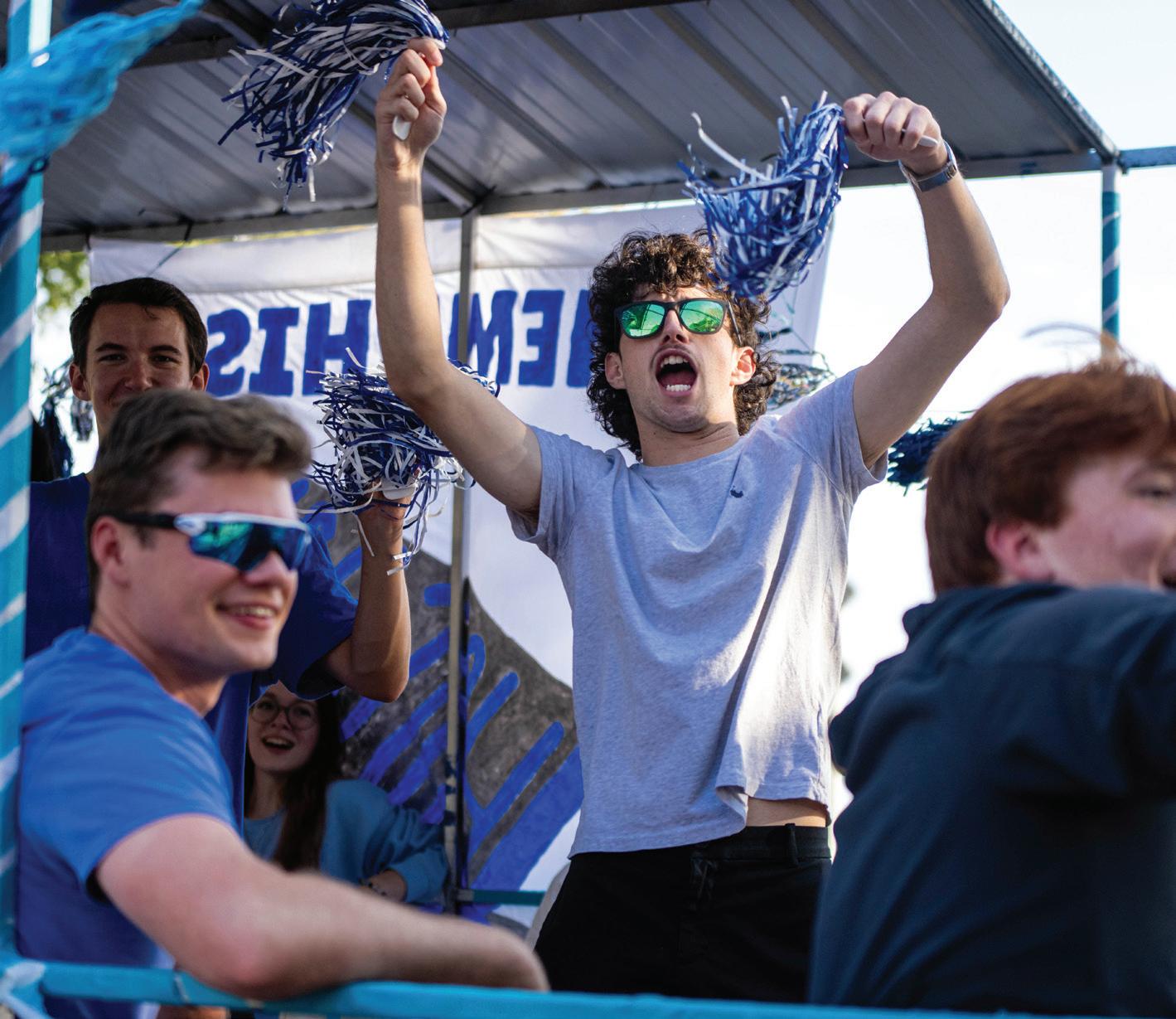



While long-standing traditions anchor the University’s culture, new traditions are shaping what it means to be a UofM student today. With each passing year, these experiences evolve to reflect the changing student body.
Matty Bailey, former Frosh Camper and current senior director of community engagement for Student Leadership & Involvement, recalls how the evolution of old traditions fosters growth for new ones.
The next chapter of campus traditions is well underway. Fall 2024 marked the UofM’s firstever "The Walk: Bridge Your Future" — a new tradition that saw the incoming freshmen class walk across the Hunter Harrison Memorial Bridge and onto campus flanked by cheering faculty and staff. This spring, the senior class of 2025 made their way back across the bridge and toward the Alumni Center as new graduates.
From the thrill of seeing the president running through the fountain with the SGA president and vice president year after year at the “President’s Fountain Run” during Weeks of Welcome to the shared pride of Homecoming Week, these moments of togetherness create memories and connections that extend long after the lectures fade and the textbooks are shelved.
“When you hear people talk about college and their experience and how fun it was, or how they made some of their best memories, they're not talking about going to class and doing their assignments and getting their degree,” Bailey explained.
“They're talking about all the in-between moments of being on an executive board and having a meeting that goes until 7 p.m. because you're trying to plan an event for students or going to this event with friends and learning these dances. Those are the moments that matter.”
With so much to experience, the UofM invites alumni and friends to participate in both longstanding traditions as well as new ones. Because, in the end, it's the experience of celebrating these traditions where the heart of the University is found.




Driven. Ambitious. Change Makers. These are just some of the words used to describe the student scholars of the Emerging Leaders Program at the UofM which celebrated more than 40 years of cultivating student leaders at the University of Memphis campus. This scholarship program is among the highest institutional scholarships awarded to students. The scholarship currently offers $5,500 annually, yet for the many students who participate in the program know it's true worth goes well beyond this monetary amount.
Through a cohort-style program, students receive leadership training and development throughout their four years in college. Connections are made early in their college experience through a residence hall community created specifically for freshman and community service projects throughout their Emerging Leaders journey.
The program began as a vision by Donald Carson, who served as Vice President for Student Affairs for 28 years, as an initiative to bring students to campus so they could get involved and contribute to a vibrant student life.

Since then, Emerging Leaders has developed more than 1,000 student leaders through its leadership competencies curriculum.
UofM Magazine spoke to two leaders of the program, one a student and one an alumnus.
Among the program’s emerging leaders is Macon, Miss. native Reagan Williams. She is a senior majoring in biomedical engineering with a minor in community action and social change. Williams interned at St. Jude Children’s Research Hospital and has been involved in the UofM Frosh Camp Program for several years, most recently serving as its executive director where she managed and organized camps for incoming freshman. Under her leadership, she trained 42 counselor team members, helping connect them with future Tigers. Williams was also crowned Ms. UofM during Homecoming Fall 2024.
Q: How did you become involved with the Emerging Leaders Program?
A: I became involved with the Emerging Leaders scholarship program upon entering the University of Memphis in the fall of 2021. I participated in the scholarship application process which included an online application and an interview. Once I received the scholarship offer, I got acquainted with the requirements and leadership development benchmarks required to stay up to par with the program. I have been thoroughly involved for seven semesters.
Q: What’s your favorite thing about the program?
A: My favorite thing about the program is the two classes that are required. The classes educate thoroughly about the depths of leadership and provide valuable connections within the community.
Q: How has Emerging Leaders benefited you personally and professionally?
A: I have grown in my self-reflection efforts and my ability to lead in different organizations and in the classroom — which all stem from my increased understanding of leadership provided by this program. Also, completing competency reflections allow us to further understand the meaning and key takeaways that lie in our many experiences that we have on campus.
Q: What is your favorite memory from the program?
A: My favorite memory of the program is the Emerging Leader Friendsgiving that was held in the LEAD center. It allowed us to fellowship and be able to interact with all cohorts.
Native Memphian and City of Memphis leader, Cortney Richardson (’11), serves as the CEO of the Peer Power Foundation. Peer Power is a non-profit organization whose mission is to provide youth with high-quality, life-enhancing tutoring and mentoring services that ensure personal, partner and provider success. Richardson joined the organization in 2005 serving in many roles including tutor, program director and chief marketing officer. Since 2004 Peer Power has provided more than 1,900,000 hours of tutoring and mentoring and has employed 2,130 college students. The organization is a recent recipient of the Ascending to Excellence Award from the University of Memphis.

Q: How did you first become involved with the UofM Emerging Leaders Program? What years were you involved?
A: Dr. Shawn Boyd was the recruiter for my high school in 2007. My teacher, Dr. Sharron Hightower, heard about the Emerging
Leader (EL) Scholarship through April Jones, who was an EL scholarship recipient and alum of my high school, East High School. Drs. Boyd and Hightower worked together to get me to apply to UofM. Mrs. Hightower ensured that I applied for EL on time. I submitted the application to the post office at Airways and Shelby Drive after 11:50 p.m. (maybe later) on the deadline date. My grandmother made sure I did what Mrs. Hightower said back in 2007. I was accepted and participated from 2007-2011.
Q: What was your favorite thing about being involved with the program?
A: I enjoyed the dialogue with my classmates and the instructors at the time. We would complete activities, readings and involvement hours and then talk about how those things shaped our personal leadership philosophy. Hearing the perspectives of classmates from different backgrounds than me helped shape my leadership worldview. The perspectives also helped shape our presentations at local youth conferences for high school students, which were always fun.
Q: How did being involved with Emerging Leaders benefit you personally and professionally?
A: Personally, EL expanded my mind beyond my experiences by exposing me to different kinds of people and content that helped me move beyond my own limiting beliefs.
Professionally, I am committed to helping shape the next generation of leaders, no matter what my role is in the community or at work. EL solidified for me that leaders are not born but can be made. Consequently, I am always of the mind that leaders create leaders, and I pride myself on creating a leadership pipeline. I believe the true sign of success is your successor.
Q: You are now the CEO of Peer Power; how did being involved with Emerging Leaders prepare you for what you do now?
A: WOW! Meeting high expectations and learning goals that culminated in a personal leadership philosophy showed me the importance of being structured in planning and always being clear on the purpose and direction of activities with which I am involved and with which I have others involved. I try to never lead or do anything without clear direction. I also still bump into “Lunch N’ Learn” speakers who imparted their knowledge into my life while in the program. Cary Vaughn and Nancy Coffee are still a part of my life and network today.
Q: Are you still involved with Emerging Leaders in any way?
A: I still promote the program and help students prepare for the interview. I also love hiring EL’s to work at Peer Power. They/we are the cream of the crop!
To learn more about the Emerging Leaders Program Scan QR Code
BY MICHELLE DRY
In 2024, the Ned R. McWherter Library celebrated its 30th anniversary, offering an opportunity to reflect on its history, contributions and evolving role in the UofM's academic landscape as part of the University Libraries.
Dr. Kenneth Haggerty, associate dean for Innovation and Scholarly Engagement of the University Libraries said, “McWherter Library’s 30 years at the University of Memphis marks a testament to the University Libraries’ unwavering commitment to supporting the learning, teaching and research needs of the University of Memphis community and beyond.”
When its doors opened on Sept. 1, 1994, nearly two years after breaking ground and surviving the devastating 1994 ice storm, McWherter Library was a long-awaited and much-needed upgrade to the University’s library system.
Named after former Tennessee Governor Ned Ray McWherter, who played a pivotal role in securing funding for the project, McWherter Library became a cornerstone of academic and campus life.

The building’s architecture, with its two-story four-columned entrance, domed rotunda with an oculus and granite flooring, and study spaces featuring natural light; was designed to inspire imagination, learning and collaboration. Its four floors house an extensive collection of books, journals and research materials while offering abundant spaces for study, group work and emerging technology.
Long-time Government Publications Department employee Betsy Eckert said the opening of McWherter Library was, “An exciting time — new building, new furniture and more space but it also came with the challenges and anticipation of learning and being a part of a new era with computers and the World Wide Web.”
For those who remember card catalogs and microfiche, it’s no secret that the internet has redefined how libraries operate.
In 1994, McWherter offered the most current technology and resources, and as the years have passed, the library has kept pace by incorporating the latest tools available to academic libraries. Today, its digital collections feature thousands of databases, e-books and academic journals available to UofM students and faculty worldwide. A more recent addition is an online digital repository, the Digital Commons, accessible to anyone anywhere.
McWherter now offers computers on every floor, printers, scanners, Wi-Fi and creative production studios, as well as online services and resources, underscoring its commitment to integrating technology into the academic experience and serving students and faculty.
More recently, McWherter established a creator space and creative production studios. In the fall of 2019, a maker/creator space called the sandbox opened, featuring 3D printers, a Glowforge laser cutter, a Cricut (smart cutting machine) and a computer lab featuring Adobe Creative Cloud software. Workshops and orientations are held regularly to support students and faculty in their academic endeavors.
The production rooms include a podcast studio, a recording studio, a video recording studio and a practice presentation space.
Two of McWherter’s departments help the library stand above a typical academic library and reach beyond the campus: Special Collections and Government Publications.
Special Collections houses rare books, manuscripts and archives, offering a glimpse into the storied history of the University, the City of Memphis and the Mid-South. It
receives requests from all over the world due to its unique holdings. Government Publications provides online and public access to federal and state government information as a Federal Regional Depository Library for the state of Tennessee and a depository for Tennessee state documents.
As McWherter Library embarks on its 31st year, Dr. Gerald Chaudron, executive director of the University Libraries, said, “Since its modest beginnings as a room in the Administration Building, the University Libraries have been the information hub of the campus. It currently serves thousands of students and faculty in ways unimaginable back in 1912 when the University was founded. The University Libraries continue to evolve as the technology of knowledge changes and expands to provide the best experience to all its stakeholders.”
McWherter Library embodies the values of the University of Memphis: student success, service, innovation, knowledge discovery and dissemination and commitment to collaboration and accountability.
To learn more about the University Libraries as well as McWherter Library, visit memphis.edu/libraries.




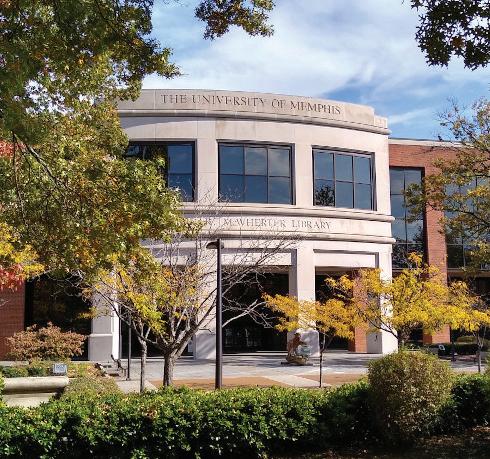


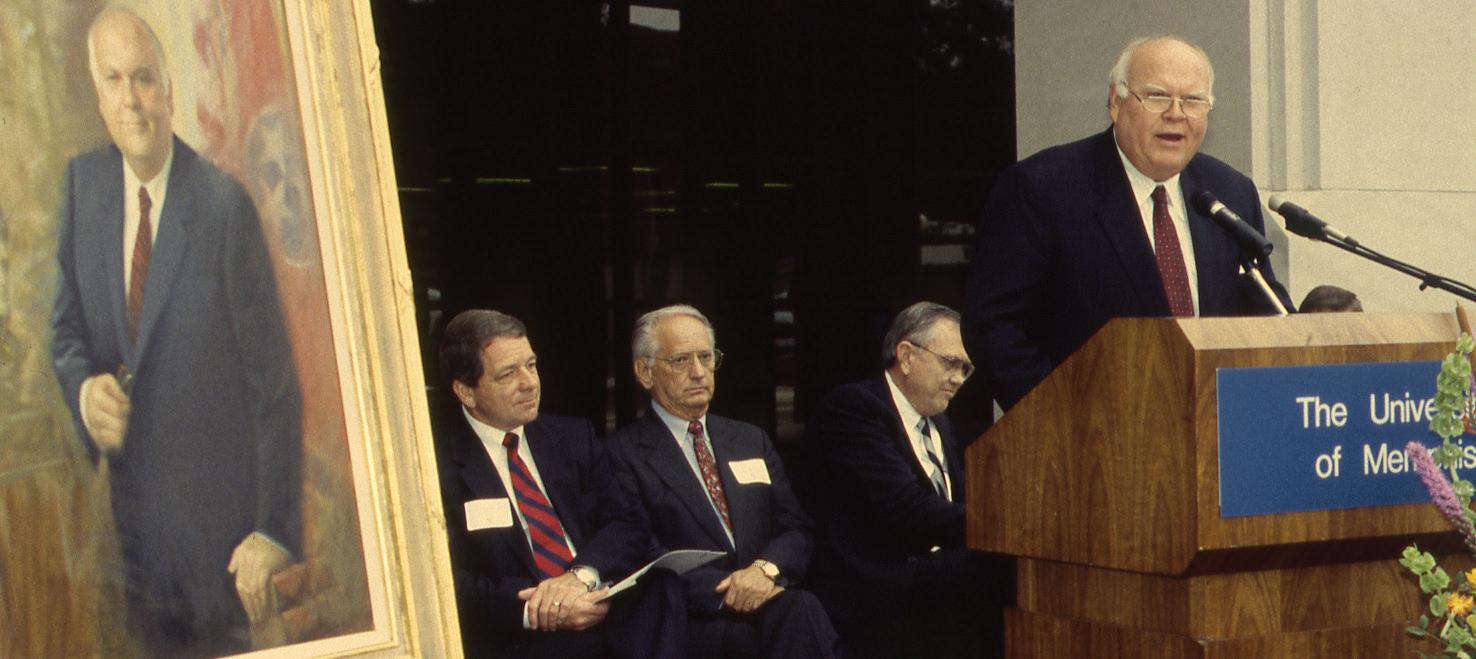
Select historical images courtesy of McWherter’s Special Collections Department. Special Collections is interested in receiving memorabilia of the University’s history from its early days in 1912 to current times. The department also maintains the University Heritage Room in Brister Hall, the original library, built in 1927.
To donate items, call Special Collections at 901.678.2210 or email: specialcollections@memphis.edu.

Few realized in 1973 when the Tennessee Higher Education Commission approved the UofM’s Master of City and Regional Planning (MCRP) degree, or even the next year when it launched with its first cohort, just how influential the program would become to the City of Memphis and throughout the Mid-South.
THE UNIVERSITY OF MEMPHIS DEPARTMENT OF CITY AND REGIONAL PLANNING IS CELEBRATING A MILESTONE — 50 YEARS AT THE UNIVERSITY OF MEMPHIS.
BY JACKIE DENTON
associate director of the School of Urban Affairs and Public Policy. “From Shelby Farms Park to the downtown historic trolley system, from the Memphis Slim House in Soulsville to the transformation of the Medical District. If you’ve used a bike lane in Memphis or ridden on the Hampline, you’ve benefitted from the work of our graduates.”
This is in part through intentional community partnerships — a hallmark pillar of the program’s mission and values established by Gene Pearson who led the graduate program as director for 25 years. In addition to serving as the program’s director, Pearson played a pivotal role in the creation and structure of Shelby Farms Park in which he served as chairman of the advisory committee. He also conducted numerous studies that contributed to the restoration of the trolley system in downtown Memphis in the early '90s.
“When you consider the work of faculty, classes and alumni of the program, the impact of the program can literally be seen all over the city and region,” said Charlie Santo, chair and associate professor of the Department of City and Regional Planning and
Among the programs in which the department was involved was Memphis 3.0, approved in 2019, it was the first comprehensive plan for the City of Memphis since 1983.
It outlined a plan to improve parks, housing, roads, transportation, public services and more to create an inclusive roadmap for city growth and development. The program was led by alumni John Zeanah (’05), director of Planning and Development for Memphis and Shelby County and Ashley Cash (’11), who served as administrator of the City’s Office of Comprehensive Planning at the time, and now serves DR. CHARLIE
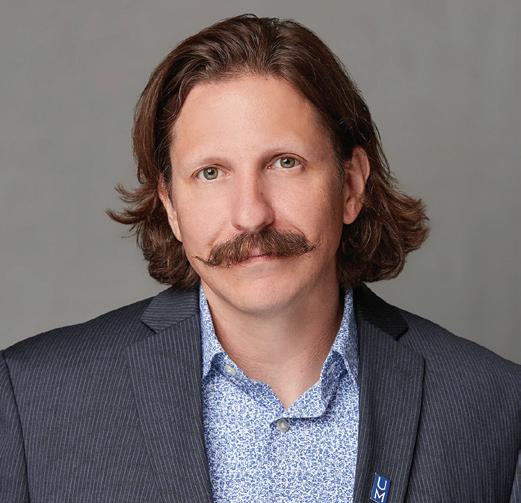
SANTO
as director of Housing and Community Development, in collaboration with city partners and UofM faculty, students and staff of the department.
City of Memphis Mayor Paul Young (’05, MBA ’10), an alumnus of the program said, “Done right, planning is progress. Our current Memphis 3.0 plan marks a catalyzing moment for the city, signaling a shift in our urban planning priorities. Unlike the comprehensive strategic plan of the early ’80s, which focused on geographic expansion, Memphiss 3.0 emphasizes sustainable growth and increased population density.” He highlighted the importance of building the city together in a recent blog post.
Through partnerships with the community and courses taught within the program, UofM faculty, students and staff have been instrumental in the development of many programs throughout the city.
Memphians today and generations to come will benefit from these programs, including the revitalization of neighborhoods such as the Broad Avenue Arts District and the Memphis Medical District.
Another key program involved two courses taught in 2008 and 2009 that created a partnership with a South Memphis neighborhood and the Soulsville community to develop the Memphis Slim Collaboratory through a grant from ArtPlace and the Kresge Foundation. The plan envisioned the restoration of the home of Blues legend Memphis Slim, located in the historic Soulsville neighborhood, into a functional space for the community to gather, tell their stories and write and perform music. The Slim Collaboratory opened in 2014 at the Stax to the Max Festival and continues to thrive thanks to a membershipbased model and recording studio.
If you’ve enjoyed fresh produce and local fare from the South Memphis Farmers Market, you’ve experienced first-hand another venture that was led by UofM faculty within the Department of City and Regional Planning.
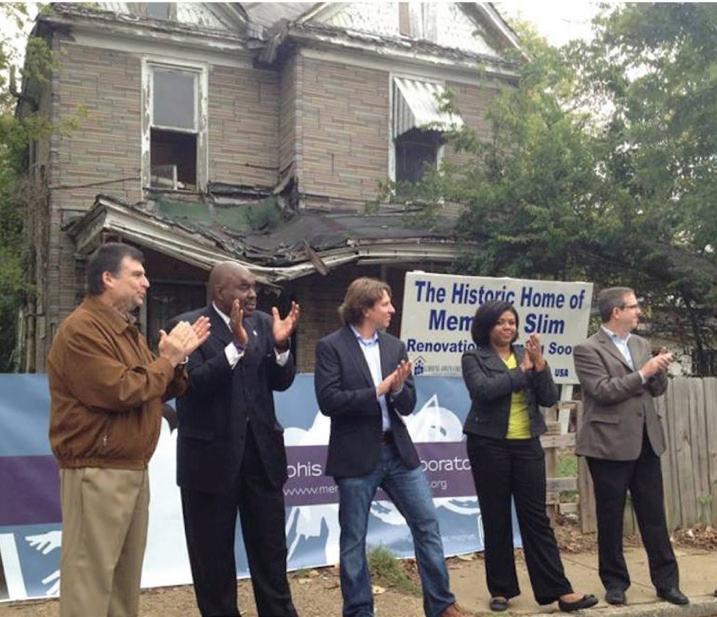

An alumnus of the program is also credited with revitalizing the Memphis Medical District. The late Tommy Pacello (JD ’05), who was a respected leader in the community in urban planning, served as the past president of the Memphis Medical District Collaborative. Under Pacello’s leadership, the collaborative was able to transform the Medical District into a walkable neighborhood with thriving businesses; through its efforts
I AM GRATEFUL TO THE UNIVERSITY OF MEMPHIS FOR PROVIDING ME WITH THE EDUCATION AND INSPIRATION TO WORK HARDER FOR MY CITY. THE KNOWLEDGE AND INSIGHTS FROM MY GRAD SCHOOL PROGRAM CONTINUE TO INFORM MY WORK AND REINFORCE MY COMMITMENT TO DRIVING POSITIVE CHANGE IN MEMPHIS.
- Paul Young City of Memphis Mayor


the project has also impacted the surrounding neighborhood, the Edge District. Because it produced lasting change in such a short period of time, this project is recognized as one of the most successful city planning projects in the City of Memphis.
“As an international student from Bangladesh, pursuing higher studies in City Planning at a U.S. university has always been my dream. While researching programs, I found that the Department of City and Regional Planning at the University of Memphis stood out as one of the few APA-accredited institutions,” Joyanta Basak, graduate assistant and community development fellow at Clean Memphis said. “I was particularly drawn to the renowned expertise of the faculty and their dedication to sustainable and resilient city planning, a field I am deeply passionate about. This focus resonated with my aspirations to contribute meaningfully to future urban development, and it solidified my decision to join the program.”
“We structure our classes and research to support long-term community engagement projects,” Santo said. “This means that our students work with
community members to address real challenges. We offer planning studio courses each year in which faculty and students work in partnership with a community client.”
Recently, the long-term community engagement project model has benefited students enrolled in the Comprehensive Planning Studio course in gaining hands-on working experience near the new Ford BlueOval City where they were able to partner with elected officials and the towns of Stanton and Mason, Tenn.
“The program has been a trailblazer in the integration of realworld experiential learning opportunities into the curriculum, with impacts such as the community-student collaborative planning of the Green Machine Mobile Food Market and the Slim Collaboratory,” Abby Parrill, dean of the College of Arts & Sciences said. “Expect more impacts as the Department of City and Regional Planning guides rural communities to vision how they will maintain their small-town character while reaping benefits of from their proximity to the new Ford BlueOval plant.”
Santo, who moved to Memphis from Portland, Ore., in 2005, said he was drawn to the department’s close-knit feel and its connection to the community. He would later lead the program in 2012.

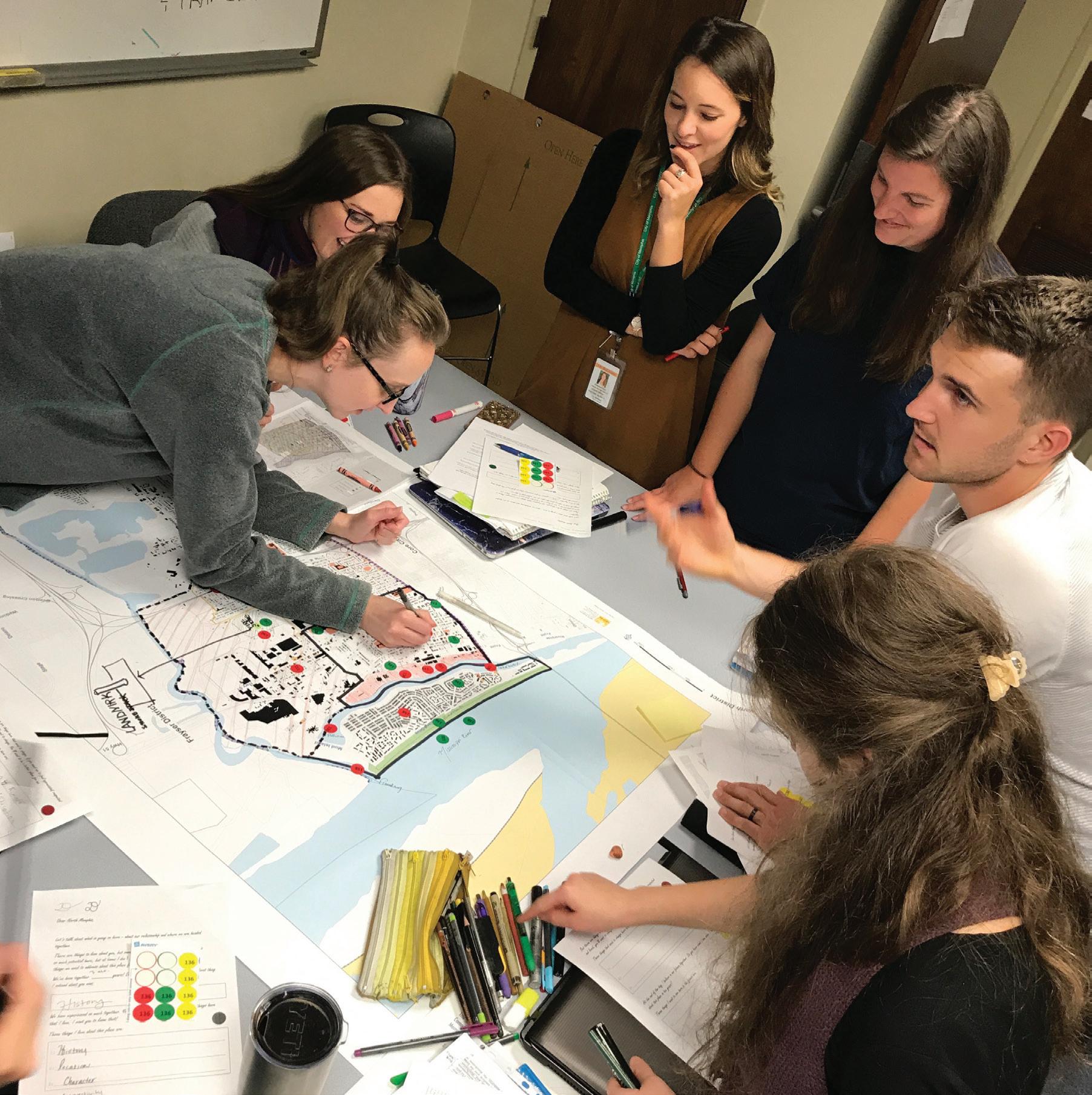
“Memphis felt like a place with authenticity, and a place where I could make an impact,” Santo said. “We’re like a family. We are and have always been a small program.”
The master’s program cohorts traditionally consist of just 12 to 15 students and is overseen by only five faculty members. “Students in the program become very close, and tend to stay close after graduation, which helps create a strong network of planning professionals who work together for change,” he said. A total of 95% of graduates find jobs in city planning withing six months of graduation.
“I adore the program, especially the sense of community,” Truus Apoanaba Abuosi, second year master’s student said. “It feels like family here. The professors are incredibly supportive; you can just pop into their offices to chat about class or get advice. One of my favorite aspects is how practical the program is. I've worked on projects that truly impact the Memphis community, and we’ve had so many fun hangouts exploring the city — after all, as planners, we know all the coolest spots.”


By Jackie Denton
As a walk-on player, Glenn Rogers Sr. broke barriers in 1968 as the first Black football player to play for then Memphis State. He played for the Tigers from 1969 to 1971.
Fifty-six years later, he broke another barrier, becoming the first living person in the City of Memphis to have a street named after him.
Located on Hollywood Street between Southern and Union avenues, the newly named Glenn Rogers Sr. Street was unveiled on Friday, Oct. 25.
“From the bottom of my heart, I appreciate everything everyone has done, and I want everyone to know I appreciate you,” Glenn Rogers Sr., said.
Glenn Rogers Jr. echoed his father’s sentiment, “This is a blessing. For you all to witness this, this is history. When we saw the sign, I just got chills. When you see your dad’s name on a street sign, it’s amazing.”
events that would lead to honoring his father’s legacy at the University. This included inviting Rogers Sr. to speak to the football team during one of their practices in 2018, being honored with the M Club Hall of Fame Billy
A testament of a great life is when your sheer presence on this Earth has made someone else’s life better.” “
Like his father, Rogers Jr., played for the Tigers football team from 1987 to 1990. He said a conversation in 2018 with former Tigers coach Mike Norvell began
J. Murphy Award in 2000 and Coach Ryan Silverfield and Tiger Athletics honoring Rogers Sr.’s legacy at a football game in 2022 against Tulsa.
Senior Vice President and Director of Intercollegiate Athletics Ed Scott said, “Glenn Rogers, he's made a path for people like myself, Tim Duncan (UofM senior deputy athletics director), who's on my administration, who also played basketball here, he's made our paths just a little bit easier. And I know if
it wasn't for people like Mr. Rogers, I wouldn't have the opportunity to be the first minority athletics director.”
Many in attendance thanked Rogers Sr. for paving the way for other Black athletes, coaches and administrators. Rogers Sr., coached for 14 years at Southside High School, later becoming an administrator at Hillcrest High School and Tunica Middle School where he coached and mentored thousands of students and players over the years and opened the pathway for those after him including NFL players Isaac Bruce, DeAngelo Williams and his own son, Rogers Jr.
Councilman Chase Carlisle, who spoke at the street sign unveiling, described Rogers Sr.’s football coaching tree as being vast and far reaching, challenging the crowd in attendance to ask themselves who is in their coaching tree.
“A testament of a great life is when your sheer presence on this Earth has made someone else’s life better,” City of Memphis Mayor Paul Young said. “I didn’t have the same history as some of you in the room, but I can feel his impact as someone that has grown up in Memphis, and I just think about all the players that have come through this University since you were the first African American to play football right here at the Liberty Bowl. We’re on hallowed ground.”
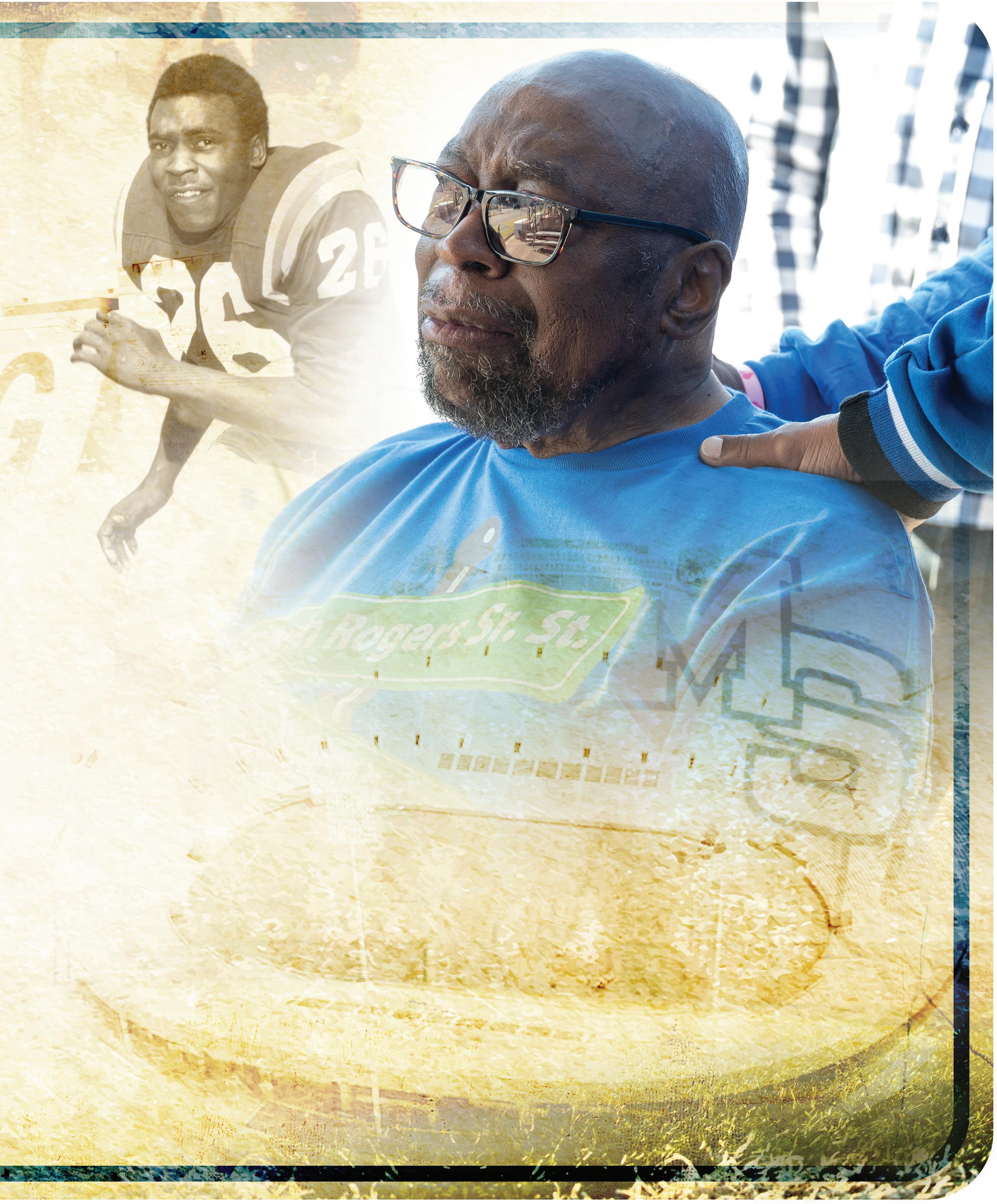
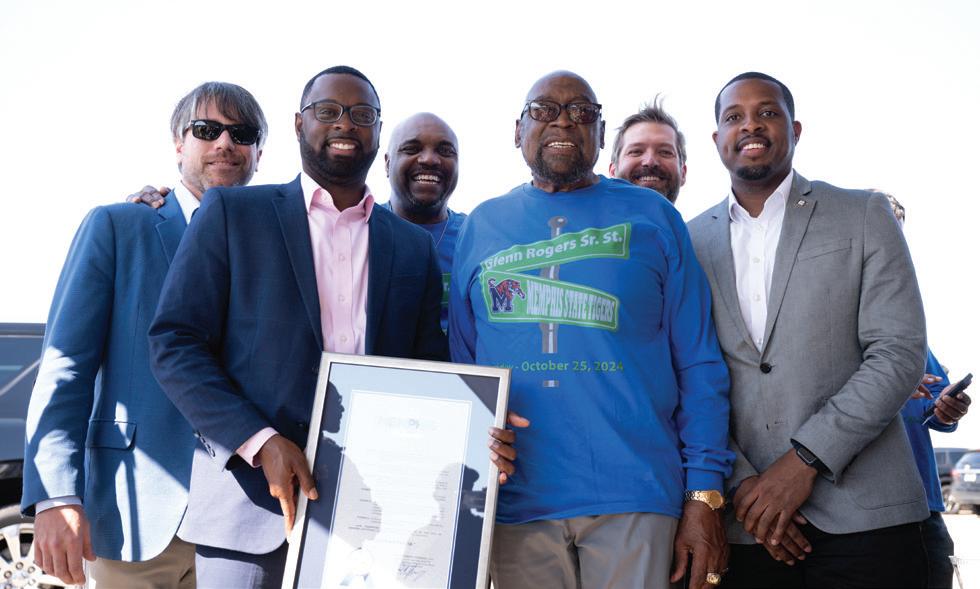
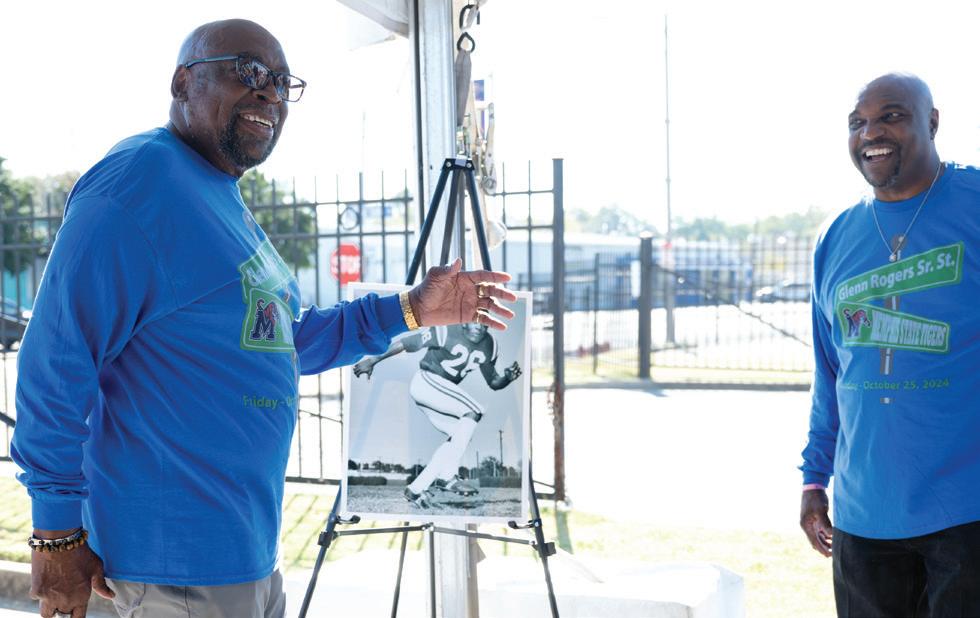


PARTNERSHIP BETWEEN SLPs AND NBA, NATIONAL CHAMPION STAR
MICHAEL KIDD-GILCHRIST
By Jackie Denton

It was not until college that Michael Kidd-Gilchrist met another person who stuttered.
Growing up in New Jersey, the former NBA player who was the second pick of the 2012 NBA draft by the Charlotte Hornets and owner, Michael Jordan, remembers being teased as a kid and throughout his teenage years at school for his stuttering.
“I want to let those know that do stutter, you know, you have a family. It is OK,” Kidd-Gilchrist said to a room of children who receive speech language services as well as students training to become speech language pathologists at the UofM School of Communication Sciences and Disorders during a campus visit in the fall.
According to the American Speech-Language-Hearing Association it’s estimated that approximately 2% of children ages 3–17 years stutter. An estimated 70 million people stutter globally.
“It’s great to have increased awareness of stuttering and what we do here at the University of Memphis,” Dean of the School of Communication Sciences and Disorders and Director of the Memphis Speech and Hearing Center Linda Jarmulowicz said. “It’s a great opportunity for our students to meet an advocate in the community and to see the things they are learning here at the UofM really affecting people’s lives. It’s really inspiring for them.”
It was also in college when Kidd-Gilchrist first started seeing a speech language pathologist (SLP). During that time, he played basketball at the University of Kentucky and would later win a men’s national basketball championship under Coach John Calipari.
Through his relationship with an SLP and future speech therapy sessions, Kidd-Gilchrist learned how to better manage his stuttering blocks.
“It was like study hall at first, but I needed it,” he said. “I kept going and really liked it. She was open to accepting a challenge with me.”
He credits the therapy sessions and the importance they played in his journey as a person who stutters to help fuel his mission driven Change & Impact nonprofit to be the voice for those who stutter, personally advocating for health care insurance coverage for speech language services, expanding services and increasing resources for people who stutter.
The Memphis community receives services like those Kidd-Gilchrist mentioned during his talk at the UofM Memphis Speech and Hearing Center located in the Community Health Building at 4055 N Park Loop, Memphis, Tenn., which serves as a full service, billing clinic to the community. All patients are seen by a faculty member and student clinician. The clinic, which treats patients of all ages, see more than 600 patients monthly.
The School of Communication Sciences and Disorders faculty are focused on researching the development and persistence of stuttering. Naomi Eichorn, associate professor, who joined the faculty in 2016 helped bring Kidd-Gilchrist to campus.
“Like many in our field, I learned about SLP through experiences of family members,” Eichorn said. “I have two close relatives who stuttered as young children. Both eventually outgrew it but were frustrated, anxious and incredibly self-conscious about their speech while the stuttering persisted. I was intrigued by the way their stuttering came and quietly went; it made me want to
learn more about how stuttering develops and why it continues in some children but disappears in so many others.”
Early interventions in stuttering therapy have shown an increased likelihood of recovery in children. It also helps them better manage their stuttering, lessening its severity and impact on them developing negative attitudes toward communication or themselves.
“SLPs can help speakers modify aspects of speech production, but a more fundamental part of treatment focuses on helping the person who stutters develop a healthy perspective related to stuttering, embrace stuttering as a form of verbal diversity, advocate for themselves and communicate with confidence,” Eichorn said.
Along with his SLP, supportive teammates also helped Kidd-Gilchrist both on and off the court. He credits his community, both in sports and in the clinics, for his success.
“I advocate because I was an athlete, and I had that bridge, but for people that don’t have that, I’m passing it forward,” he said.
Navigating the field of policy change has been a whirlwind according to Kidd-Gilchrist, but that’s not stopping him. Since the founding of Change & Impact in 2021, he’s visited middle and high schools, universities, hospitals and lawmakers in more than a dozen states.
“I like to bring them to the table, and we can talk about the issue at hand and go from there,” he said. “I’m changing the narrative at the highest level.”
Part of that work involves improving access and coverage for speech therapy services, as well as eliminating the restrictions on the quantity of treatment sessions individuals receive.
According to Eichorn, stuttering that persists beyond early childhood is a lifelong condition and can impact a person in profound ways. Stuttering commonly leads to teasing, bullying, self-consciousness, shame, anxiety and social isolation. It can result in a reluctance to participate in class, poor academic performance, withdrawal from social interactions, professional underachievement, avoidance of relationships and even suicide.
“Access to effective therapeutic support from an SLP at all ages and without restrictions is critical for facilitating successful communication and ensuring optimal social, psychological, academic and occupational outcomes for people who stutter,” she said.
Recently, Kidd-Gilchrist hit a slam dunk in his legislative efforts through the passing of two bills in Kentucky and Pennsylvania. Both bills will require insurers to cover speech therapy for stuttering treatment.
To a room full of future speech language pathologists and faculty instructing their curriculum, Kidd-Gilchrist said, “Everybody has something that they deal with, and I want to thank you guys because without you, it’s very, very hard for us.”
To learn more about services offered at the Memphis Speech and Hearing Center, visit: memphis.edu/mshc/services/
Photos courtesy of Ross Richards, Change & Impact




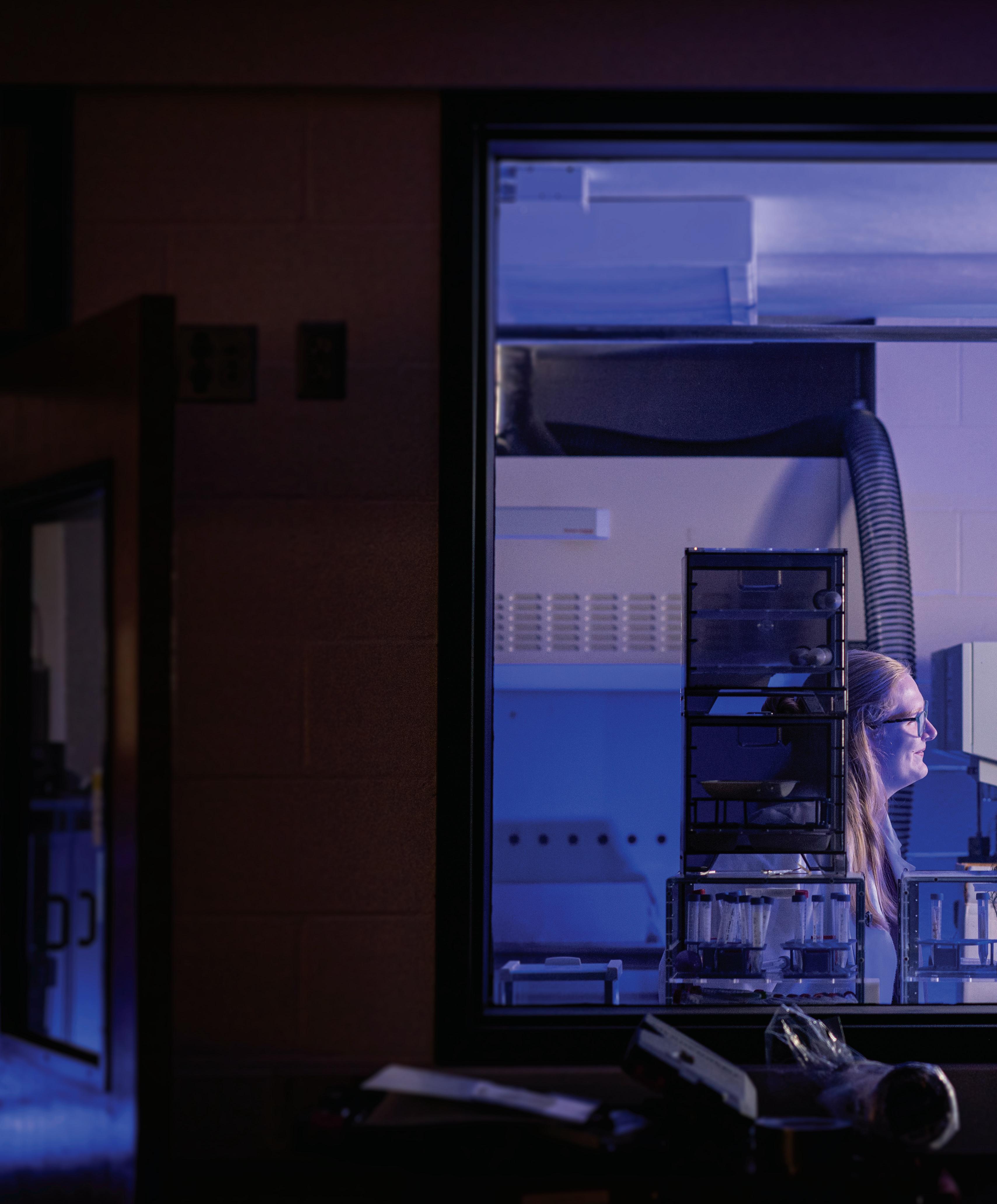


By Bridget Ellis
The surrealness of the moment that Christopher Kourvelas (’04, ’07) was named Middle School Louisiana Teacher of the Year by Bossier Parish Schools and the Louisiana Department of Education with the Dream Teachers Foundation is not lost on him. The honor of receiving this award is a testament to his role as an educator and an opportunity to reflect on those who empowered him to teach.
“I give a ton of credit to the UofM for helping me get the foundations of teaching and stirring up the passion of education,” he said.
A Memphis native, Kourvelas grew up a Tiger fan, attending football and basketball games. He recalls how excited he was to attend games in the Mid-South Coliseum, noting that the tickets were called “Golden Circle.” As he got older, he tried to figure out what direction he wanted to take into the next phase of his life.
“I did apply to other places, but I always knew at the bottom of my heart that I wanted to be at Memphis. Once I visited the campus, I was sold,” he said.
Campus life was an important aspect of Kourvelas’ Memphis experience, which began in 1999. In addition to being in a fraternity and serving as an orientation guide, he took on the important role of UofM mascot — Pouncer. He graduated with his bachelor's degree in individual studies with a concentration in sports promotion and leadership in 2004 and his master’s in instruction and curriculum leadership education in 2007.
Kourvelas' journey to become an educator and empower students was not a clear decision initially. He credits his high school teachers for setting him on the path to becoming an educator. Sports have always played a significant role in his life, and Kourvelas wanted to coach basketball. As he started his master’s program, he had several UofM professors who
profoundly impacted his career choice. Kourvelas remembers the late Ed Orio in the College of Education for pushing him to do his best and remain accountable for his actions.
Dr. Cathy Meredith, a retired professor in the Department of Instructional Curriculum and Leadership and Kourvelas remained close after he graduated. After becoming a finalist for the Middle School Teacher of the Year award, he contacted Meredith and thanked her for her impact on him and his career.
“Read to your children every day,” he said. Noting that even though he teaches middle school, Meredith’s mantra on how critical reading is to children is essential to his role as a teacher.
Meredith enjoys maintaining connections with former students. She believes educators play a vital role in the lives of their students and require passion and grit.
“Your impact is knowing how you have helped or influenced a student’s life,” Meredith said.
Learning that Kourvelas was awarded Teacher of the Year for being a successful educator is rewarding. Being aware that there are “still [former] students making a difference in the lives of [current] students is rewarding because it’s one of the most important jobs,” she said.
In 2009, Kourvelas settled in Louisiana and began teaching. He teaches seventh grade American history, is the athletic director for his school and coaches the middle school boys' basketball team. The Teacher of the Year Award for Louisiana is a rigorous process that began in the fall of 2023 for Kourvelas. Louisiana has 64 parishes (counties) and several hundred middle schools. An extensive application process followed Kourvelas’ nomination. Semifinalists were announced in early 2024, and nine teachers and principals were selected as finalists and participated in a final
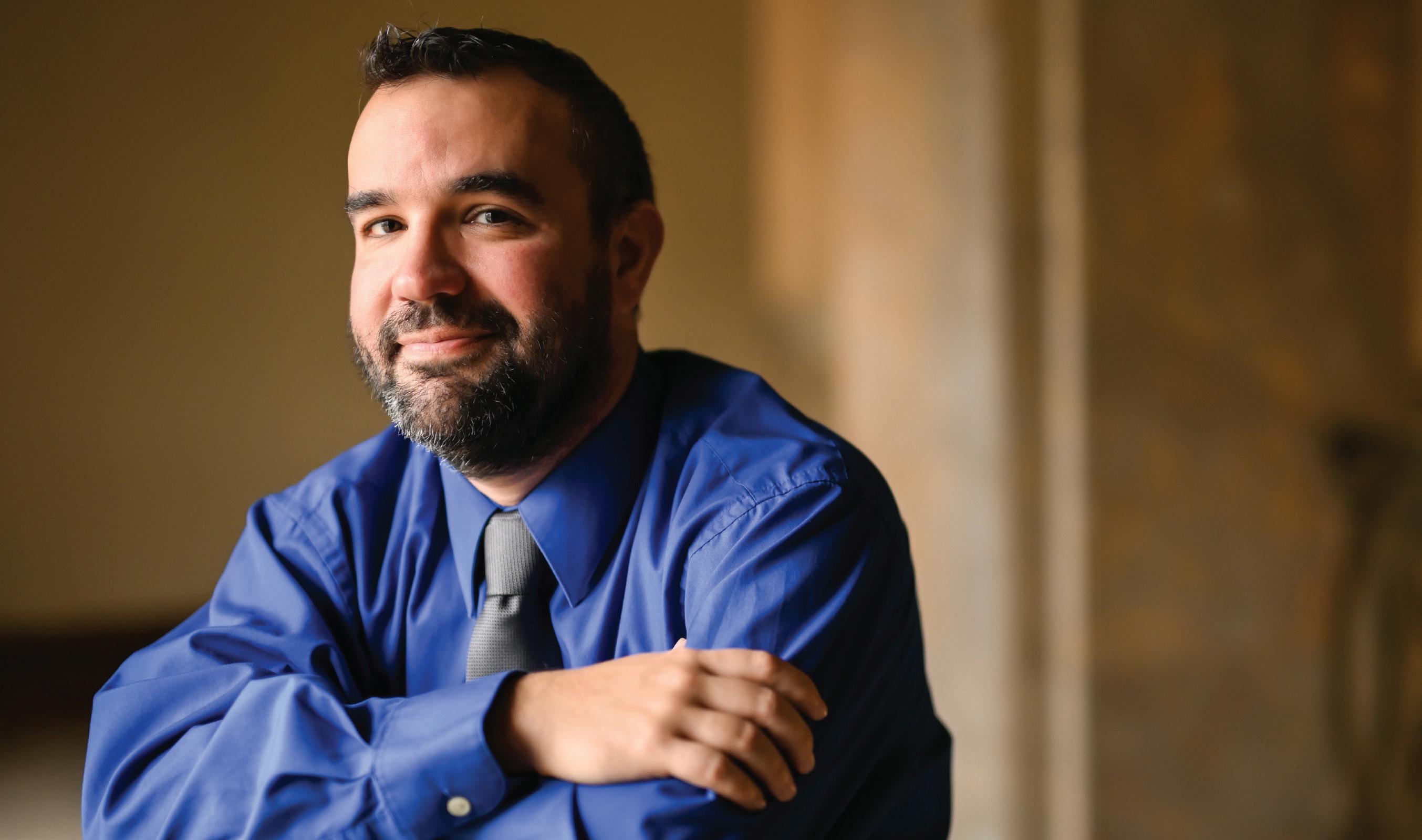
interview in June. He was one of three finalists for the middle school level. The winners were announced at the Louisiana Department of Education (LDOE) 18th Annual Cecil J. Picard Educator Excellence Awards Gala held in New Orleans in July 2024. Kourvelas was stunned to hear his name announced.
Kourvelas recalled the process as a humbling experience. He said his teaching style was inspired by many who shaped his experience as an educator.
"I tell my students all the time, if something doesn't work for you, it's OK to fall as long as you fall forward, get back up and keep trying,” he said.
In October 2023, he was named teacher of the year at his school, Elm Grove Middle School, and since that moment Kourvelas has spent a lot of time reflecting on the process.
“Not just reflecting on what happens in my classroom or on the basketball court — but also just self-reflection of me as a teacher, a coach, a parent — to see where I came from, where I am now and even where I want to be in the future,” he said.
“I would encourage everybody to be a dreamer, be a believer and then be a doer,” he said. “And it kind of goes
“I TELL MY STUDENTS ALL THE TIME, IF SOMETHING DOESN'T WORK FOR YOU, IT'S OK TO FALL AS LONG AS YOU FALL FORWARD, GET BACK UP AND KEEP TRYING.”
- Chris Kourvelas
back to the thing that the University of Memphis had when I was there,” Kourvelas said. “Dreams are only a step in the process. The next step is to put your dreams into action.
“When you put an action with a dream, you have something to work for, but guaranteed you're going to fall at some point. Fall forward and learn from your mistakes. And the biggest thing is don't give up. You have to trust yourself, trust others, learn from everyone and don’t be afraid to fail. Keep moving forward and trust your process because the day that you give up is the day that you quit, and you can't do that. You're going to have to keep moving forward, no matter what the process is.”
Kourvelas hasn’t stopped learning, either. He recently completed a Master’s in Education Administration while encouraging current students to start thinking about their future and focus on doing something valuable with their lives. He encourages those exploring a degree in education to never stop learning.
“Don't be afraid to try new things in your classroom, and don't be afraid to challenge your students and push them to where you believe that they can be,” Kourvelas said. Students want and need expectations to succeed. Educators can assist students with achieving their dreams. Kourvelas added, “Don’t be afraid to do that.”

By Robert Casper, UofM BBA, '75
"As a close friend and classmate, I find it remarkable to reflect that when Ruth performed as the Queen of the Night in a 1968 University of Memphis Opera production of Mozart’s “The Magic Flute,” she likely could not have imagined that 25 years later, she would reprise that iconic role in her final performance at the Metropolitan Opera in New York City." - Robert Casper
Ruth Lynn Welting (1948–1999) was born in Memphis, Tenn., and went on to dazzle audiences as one of the top coloratura sopranos of her time. Known for her stunning vocal range, incredible technical skill and captivating stage presence, she performed in the most prestigious opera houses around the world.
What many people don’t know is that before Welting's star rose, she was a proud Memphian who studied at the UofM (then Memphis State University) from 1966 to 1969. It was here that her extraordinary journey began.
Welting grew up in the Sherwood Forest neighborhood near the UofM as the third youngest of four daughters born to William and Mary Welting. Music ran deep in the Welting household. Her older sister, Patricia, also became a celebrated opera singer, performing with the Metropolitan Opera.
Welting's musical gifts were evident early on. At 19 months old, she could play “Mary Had a Little Lamb” on the piano with one finger, and by age five, she had already mastered the piano, organ and accordion. Soon she added flute and guitar to her repertoire and won numerous awards. At 12 years old, she appeared on Ted Mack’s “Original Amateur Hour,” and at 15, she won the Mid-South Fair’s Youth Talent Contest Finals.
In high school, Welting shone in “The Sound of Music” and “Carnival,” but her true calling awaited her in opera.
Welting earned a full music scholarship to the UofM, intending to be a concert pianist. But during her time there, she discovered her passion for singing. Guided by her voice teacher, Jerome Robertson, Welting began to explore opera, diving into the demanding coloratura repertoire.
In 1968 she portrayed the Queen of the Night in a UofM production of Mozart’s “The Magic Flute” (Die Zauberflöte) under the direction of George Osborn, then the UofM director of opera. Her flawless execution of the demanding aria “Der Hölle Rache,” with its iconic high Fs, foreshadowed the brilliance she would later bring to this role at the Metropolitan Opera.
Ironically, she reprised the role in her last performance at the Met on November 20, 1993.
In a UofM opera workshop performance in 1968, she charmed audiences as Miss Wordsworth in a production of Benjamin Britten’s “Albert Herring.”
In 1969, Welting's talent earned her a win at the Metropolitan Opera National Council Auditions, a pivotal moment that secured her a spot at the Juilliard School in New York City. Her Julliard studies soon took her to Italy, where, at the urging of composer and conductor Gian Carlo Menotti, she began her voice studies with the celebrated voice coach Luigi Ricci of Rome. Welting once said, “If I climb the ladder of success, I owe it all to him.”
Welting spent much of her career studying with voice instructor Daniel Ferro in New York City and worked with Janine Reiss in Paris for a period. Early in her journey,
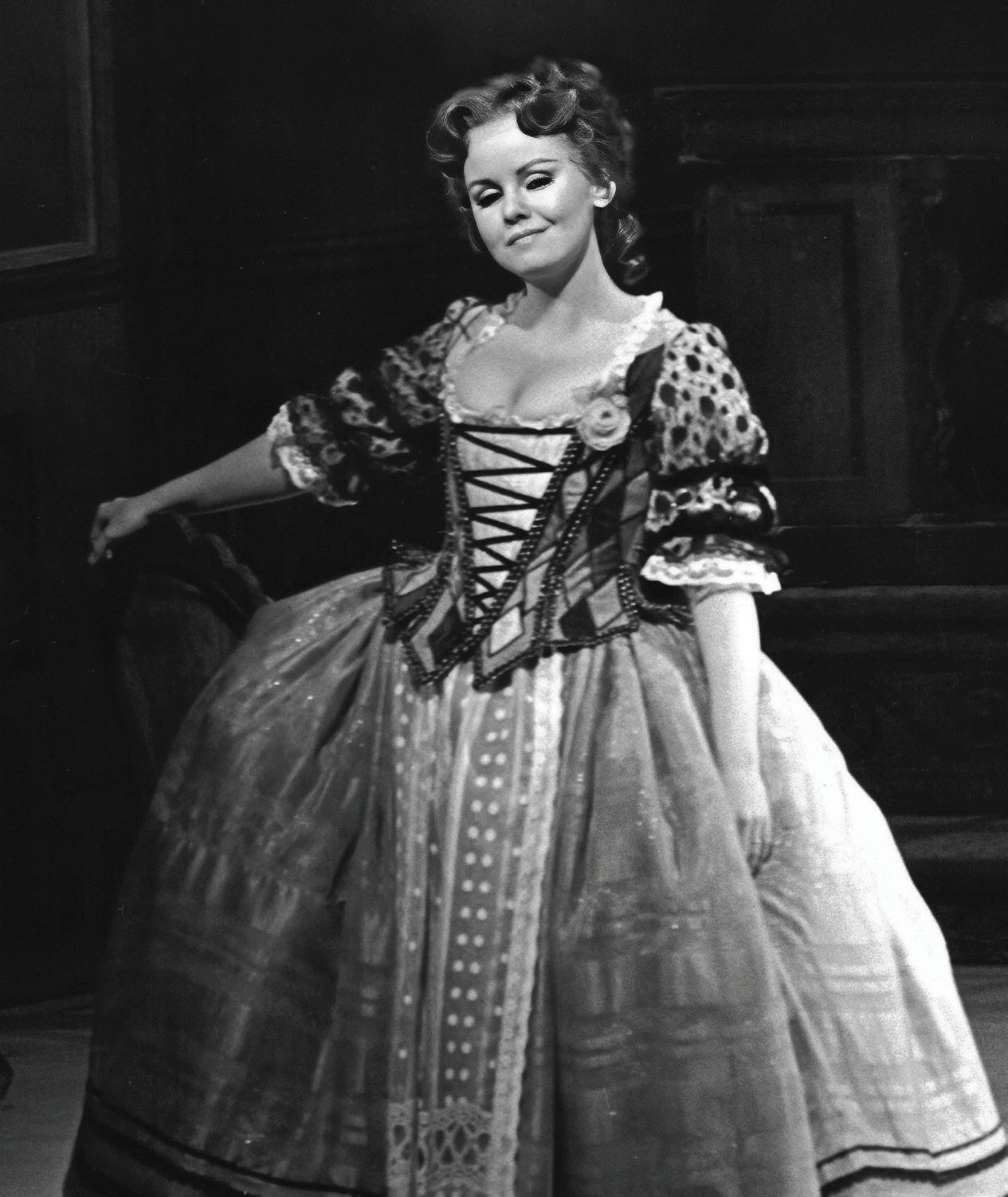
she had the privilege of studying briefly with the legendary cellist, composer and conductor Pablo Casals, who praised her voice for its "remarkable purity and flexibility."
Her career took off in 1971 with her debut at the New York City Opera as Blondchen in Mozart’s “The Abduction from the Seraglio.” Soon after, she made her mark at the Metropolitan Opera in 1976, playing Zerbinetta in Strauss’ “Ariadne auf Naxos.”
Welting became an international star, performing in iconic venues like La Scala, the Royal Opera House, San Francisco Opera and the Vienna State Opera. She was celebrated for her dazzling high notes, agility and emotional depth in roles like Lucia (Lucia di Lammermoor), Olympia (Les contes d’Hoffmann) and Lakmé (Lakmé).
She would sing the role of Lucia in “Lucia di Lammermoor” in the original key of F Major, which is rarely done. According to Welting, "The key change gives the Mad Scene a lighter mood. The reality of madness has drawn Lucia into her own world, a childlike, beautiful one in which everything's just the way she wants it to be."
One of her most memorable performances was as Baby Doe in Douglas Moore’s “The Ballad of Baby Doe” during the New York City Opera’s 1976 Live from Lincoln Center broadcast. She collaborated with artists like Luciano Pavarotti, Sherrill Milnes, Frederica von Stade, Marilyn Horne, Julius Rudel,
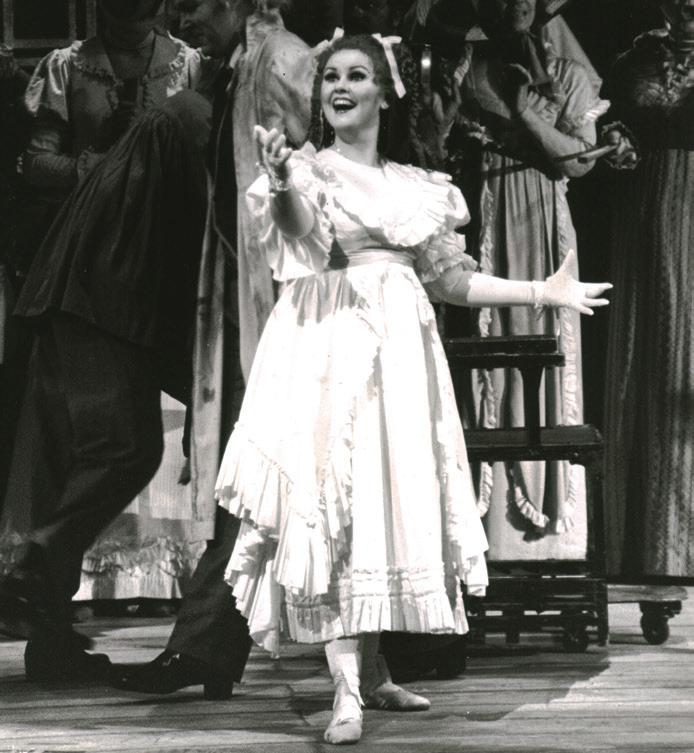


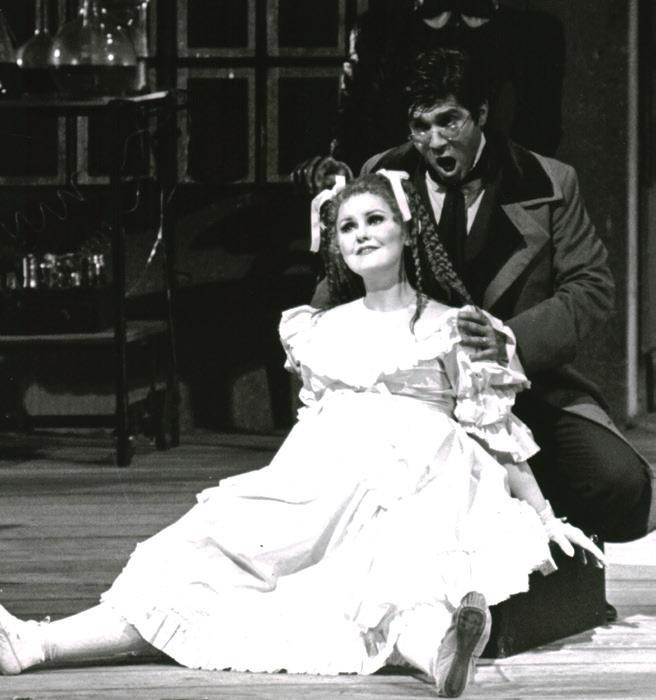
Jose Carreras, Daniel Barenboim and Plácido Domingo, earning the admiration of colleagues and fans alike.
Despite her fame, Welting remained down-to-earth. She once said, “If God so wills that I’m a ‘big name,’ then fine, but it’s not the end of the world if I’m not. I’m grateful for the gifts I have.”
By the mid-1990s, Welting had retired from her operatic career and shifted her focus to public service. She earned a degree from Syracuse University in 1998 and continued her education at its Maxwell School of Government.
Welting left behind an incredible legacy of artistry and inspiration and several acclaimed opera recordings that showcase her extraordinary vocal talent.
She rests in Pleasant Hill Cemetery near Memphis, alongside her parents and two of her sisters. Welting's remarkable journey from a musically gifted child in Memphis to a UofM music scholarship student to one of the world’s leading sopranos remains a testament to her talent, passion and indomitable spirit.
Photos courtesy of the Met Opera Archives and Robert Casper

By Jackie Denton
teve Ash (MS ’12, PhD ’17) remembers writing code for the first time as a first grader at Dogwood Elementary School in Germantown, Tenn.
He said a book in the library written for kids on the language basics of coding opened his imagination and the excitement of creating something that he could then use was an incentive to keep learning code.
His father also worked for IBM (International Business Machines) when he was growing up. “I feel extraordinarily lucky that even in the ’80s we had a computer in the house which was not a common thing at the time,” Ash said.
After earning a computer science degree at Rhodes College, followed by his master’s and doctorate degrees from the University of Memphis Department of Computer Science, Ash began his software career as a junior developer in banking tech. Throughout his many jobs while in school, Ash was learning software development and some type of machine learning along the way.
In 2017, he set his sights on a job inside of big tech, which meant moving outside of Memphis. It was then when he was recruited to a job in Seattle with Amazon.
Now as a Principal Engineer for Amazon Web Services (AWS), Ash is advancing generative AI for business intelligence with Amazon Q in QuickSight.
The program allows customers in a broad range of industries such as healthcare, banking, tech, along with users such as developers and engineers, to work with a generative AI assistant that’s akin to “supercharging your work.”
It began as a question answering system in 2020. “We wanted to give you a way through natural language, to be able to ask questions against your databases,” Ash said. “We knew that there were a lot of exciting science
breakthroughs happening in natural language processing, the early seeds of what eventually became ChatGPT were already being published and discussed in 2020-21.”
“Every once in a while, we have these great breakthroughs that really open people's minds to something that may be possible.”
He knew that they could leverage generative AI for their customers and came together with a team to build Amazon Q in QuickSight.
Over the previous 20 years, AI and natural-language based solutions were designed on very complex model pipelines and were expensive to build and maintain. Each was traditionally tailored for specific use cases and needed a deep background in computer science to understand and then use those systems.
“With generative AI the ability for a user to use language to do something complex is becoming real for the first time,” Ash said. “It's been a really busy couple of years, and I don't see it slowing down too soon.”
With new technology inevitability comes new changes in the workplace that shake up the industry. Ash believes generative AI can assist many jobs and industries that need improved insights into their business models and better access to information that's actionable and that can help businesses make decisions.
“We really see ourselves as trying to empower everybody,” he said. “To be able to get the insights that they need, and dive deeper into those insights so that they are not just stuck waiting on IT or others.”
There is also hesitancy as AI evolves that it may replace jobs traditionally done by humans.
“None of the AI that exists right now that people are talking about completely replaces what humans do,” Ash
“EVERY ONCE IN A WHILE, WE HAVE THESE GREAT BREAKTHROUGHS THAT REALLY OPEN PEOPLE'S MINDS TO SOMETHING THAT MAY BE POSSIBLE.”
- Steve Ash
said. “Creativity and complex reasoning; we have a number of features that actually do not exist in those models yet, despite what some people say. We love to discover stuff. We as humans. It's that part of what we do that AI doesn't do well yet.”
As technology evolves, so does the need for guidelines, compliance and ethical responsibility. Major tech companies have implemented responsible AI initiatives within their organizations and it’s something Ash and his team take very seriously, which follows an internal governance process to understand the risks of the features being built.
Ash said the UofM Computer Science program gave him the foundational knowledge that he uses every single day. Through the doctorate program he learned how to clearly articulate technical ideas, which, as a principal engineer, is vastly important.

“If you're in a job like mine, most of your work is going to showing the path and empowering other people to be able to do things, and that is all about technical communication,” he said. “Even though I didn’t realize it at the time, I think that the program did a phenomenal job of making me a good technical communicator. It's a superpower of mine that I've leveraged a lot at Amazon.”
Ash said he hopes that the technology he’s helping to develop continues to empower and supercharge people to spend most of their time on their most important and impactful problems.
*The opinions above reflect Ash's personal opinions and not necessarily those of his employer, Amazon.
School of Social Work | Class of 2024



Life has thrown its share of challenges my way, but I’ve learned to embrace the struggle, to rise above it and to grow stronger because of it.
I’ve been placed in over 30 foster homes, endured unimaginable tragedy and faced the loss of my father.
But I pushed on.
And more than that, I turned those hardships into fuel for something greater.
My story isn’t just one of survival — it’s a testament to resilience. I’ve learned to use my past to propel me forward instead of letting it hold me back. I’m proud of my journey and the adversity I’ve faced.
Now, I want to share it. Not just for me, but in hopes of inspiring others.
This is my story.
Looking back on my childhood, there’s one thing I want people to understand: even though I grew up in the foster care system, I was still just a kid — with dreams, struggles and feelings like anyone else.
It’s easy for people to forget that. But I want others to know that while the system is hard and isolating, it doesn’t define us.
I was separated from my siblings early on, so I had to figure things out on my own. Sports and activities became my escape, a way to distract myself from the chaos around me.
At 16, I got a job at McDonald’s and worked constantly, trying to create some sense of stability for myself. Without a strong home life, I sought connection and purpose wherever I could find it.
And then, my very last foster parent entered my life — a woman who became the mother I desperately needed.
She was my light.
She didn’t just take me in; she guided me. She helped me decide on schools, figure out transportation and even made it possible for me to have my first car.
Her belief in me changed everything. She saw me, really saw me, and gave me the tools to succeed.
I owe so much of who I am to her. Without her support, I wouldn’t be where I am today.
IT’S NOT WHAT I DO, BUT WHY I DO IT
Growing up, I didn’t exactly have a soft spot for social workers.
They were a constant presence in my life, often associated with the most difficult moments. So, the idea of becoming one myself wasn’t even on my radar.
I almost didn’t attend the ceremony because my soon-to-be sister-inlaw had passed away, but my family insisted that I go. When my name was announced, I broke down in tears. It was a culmination of all my hard work and perseverance paying off.
Beyond academics, I immersed myself in volunteer work during college.
My favorite role was at Youth Villages, where I’d walk and talk with kids in group homes, seeing myself in their stories and wanting to make a difference.
into my life, I wasn’t showing up the way I should have been — skipping class, avoiding responsibilities.
But her arrival flipped a switch in me. Suddenly, I knew I had to step up to build a better future, not just for me but for her. She’s been my motivation every step of the way, and I’m endlessly grateful for her — and for her dad, my boyfriend. He’s been my rock, holding me accountable and reminding me to keep pushing forward. Together, they’ve made me stronger, more focused and more determined than ever.
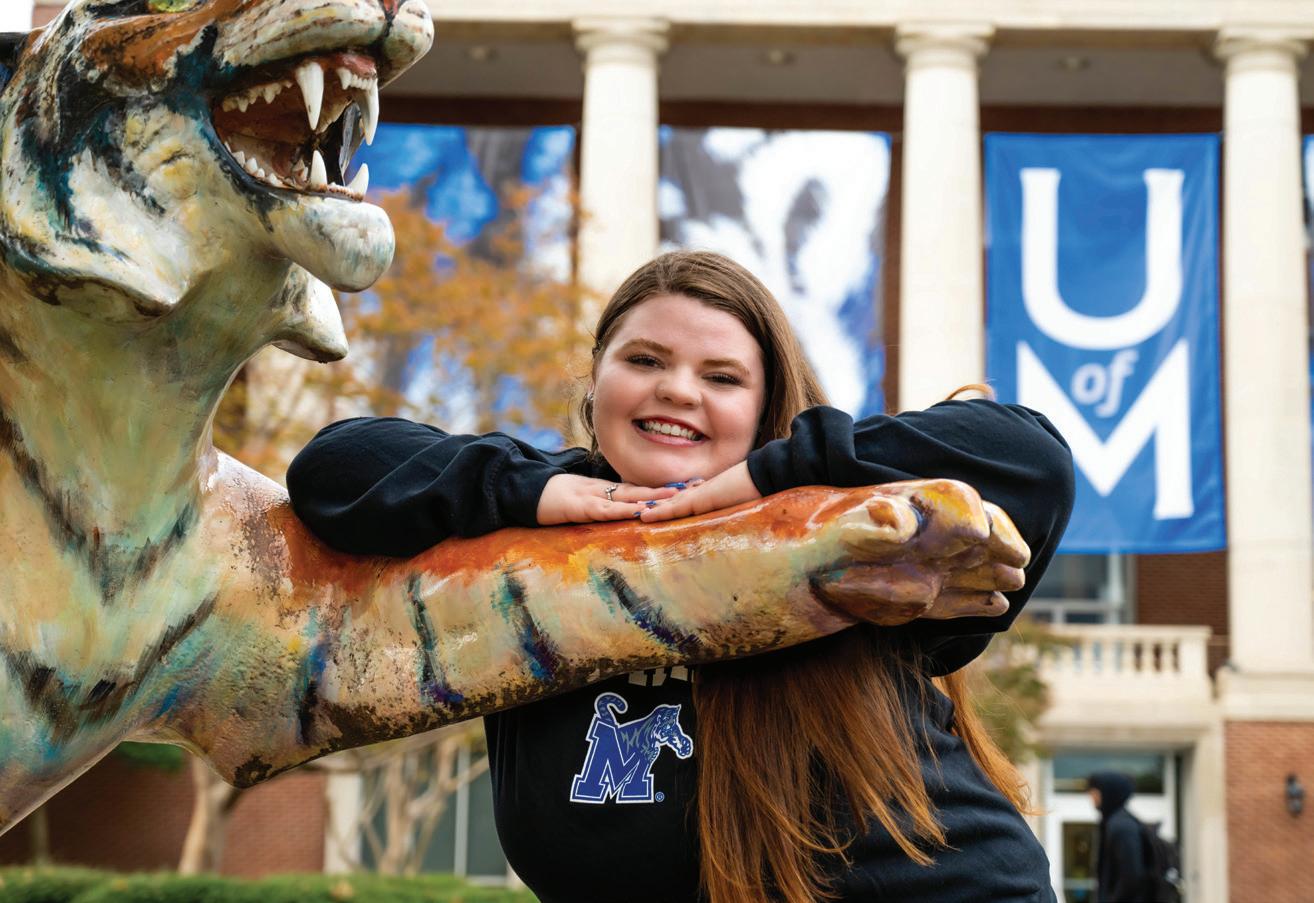
This past summer, I lost my dad, and, with him, a part of my heart. But even in that loss, a new chapter began.

But one night, I watched a documentary about child abuse, and something clicked. I realized that there were kids out there who needed someone who truly understood them — someone who had walked in their shoes.
That’s when I decided to apply to the School of Social Work at the University of Memphis.
Getting accepted was just the beginning.
I made the Dean’s List three times, maintained strong grades and was honored as Social Work Student of the Year. That award meant everything to me.
I also volunteered at a homeless shelter, unofficially doing social work before I even had the title. I helped people regain access to bank accounts, apply for housing and more — often driving them to appointments in my own car.
It wasn’t about recognition or accolades. It was about doing the right thing. For me, it’s never been about what I do, but why I do it.
My daughter, Ce'Anna, is the greatest gift I’ve ever received. She saved my life.
When I look at her, I see the little girl I once was, and I feel an unshakable responsibility to be the mother I always needed. Before she came
I met my little sister for the first time — a sibling I didn’t even know growing up because her mom kept us apart. After my dad’s passing, DCS reached out, and now she lives with me. It’s a fullcircle moment. Now, I’m not just a mother to my daughter — I’m also a foster parent to my sister. They’re both my "why" reason to keep going.
I used to be hesitate to share my story, but I’ve come to realize its power.
There are so many kids out there facing similar challenges, and if my story can give even one of them hope, then it’s worth sharing. As Nelson Mandela said, “Do not judge me by my success, judge me by how many times I fell down and got back up again.”
That’s what my life has been about — getting back up. And I’ll keep getting up, not just for me, but for the people who depend on me.


Fogelman College of Business & Economics and College of Arts & Sciences

I f I could talk to my younger self, I’d tell him to get out there.
Bite the bullet. Take the leap. Find the people you enjoy and activities you like and embrace them.
I used to be a very shy, socially anxious person who was always hesitant to put myself out there. I really wanted to, but something was always holding me back.
But all of that changed when I came to the University of Memphis.
I was born in Sacramento, Calif., and spent most of my childhood in the Bay Area until my family moved to Memphis in December 2020 — right as I was getting ready to start college.
When it came time to choose, the University of Memphis was the obvious choice since it was only a 20-minute drive from my new home. But it also provided me with a fresh start — an opportunity to get out of my bubble and put myself out there.
Forcing myself to go to college, even though it was close to my family’s new home, allowed me to fully integrate into this new community, in a completely different part of the country than I had grown up in.
I definitely didn’t understand how impactful the friends and support system would be when I started school.
During my time here, I was able to discover new passions like marketing and journalism while building upon the stuff I already enjoy, like French and music. However, the most important thing I’ve gained at the University of Memphis is confidence.
When I first enrolled at the University of Memphis, I intended to be a nursing major.
But deep down, I wanted to major in something that would allow me to be creative and put myself out there more.
So, I took a big risk and changed my major to marketing.
Marketing is all about communication and helping businesses thrive by reaching as many people as possible, and that’s what really interested me. All of my classes have helped me grow not only as a businessman but also as a person. In my mind, though, two stand out in particular.
I took an oral communications class, and it was fundamental in helping me break down some of those barriers and become a more confident speaker. Marketing 3410 with Professor John Cicala helped me understand the
importance of building relationships with customers and how to communicate with the people supporting your business.
While marketing became my main focus, I was also passionate about taking French classes. French is a language I’ve always loved learning about. I took French in high school and wanted to continue studying it in college. Now, I’ll be graduating with a minor in French.
The classes I took were very important to my college experience. But the people I’ve met, and the clubs I’ve been a part of have been just as important.
One of my favorite experiences was my time at The ROAR radio station, where I hosted my music show, “Listen to This.”
I decided to start the show after getting heavily involved in journalism. I never saw myself as a journalist, but I decided to try something new last year by joining The Daily Helmsman, the student newspaper.
I fell in love with journalism and ended up dedicating a lot of time to improving my writing. I was even fortunate enough to be awarded the "Best In-Depth Reporter" at the JRSM award ceremony last semester.

All of this led to being the Managing Editor for the Daily Helmsman for my last semester – a position I’m super proud to say I was able to be part of.
I have also been involved with the Hope College ministry. The connections I made through the ministry have helped me grow in my faith and become a better person.
As my college days come to an end, I’m excited about the opportunities that lie ahead.
I have a job lined up with a New York-based fashion startup called Note to Self, and I’m looking forward to using my marketing skills to help the business grow. I’m also hoping to continue my work in journalism by starting a freelance website where I can write about music. Music will forever be a passion of mine, and I want to continue sharing it with others.
As I look ahead, I’m so grateful for the support system I’ve had at the University of Memphis and the opportunities I’ve been given. Without them, I wouldn’t be where I am today.

In the latest effort to bolster campus security, UofM Police Services welcomed Pharaoh — its first-ever K-9 — to its task force on Feb. 18. Pharaoh is a 16-monthold Belgian Shepherd. Officer James Anderson is serving as Pharaoh’s handler.
“We are excited to introduce Officer Anderson and his K-9 partner Pharaoh,” UofM Chief of Police Keith Humphrey said. “Our new K-9 team recently completed more than six weeks of intensive training. The UMPD K-9 unit is a new resource that will play a multifaceted role on our campus.
The unit will provide additional safety, community engagement and education and provide an overall safer environment for students, faculty and staff. We believe this presence can also reduce theft, assaults and other criminal activity.”
Pharaoh is a dual-purpose K-9, trained in searching and detecting. His name was selected following a closely contested social media poll — which received 627 total votes — from a list that included Zeus, Major and Ace.

In addition to adding a K-9 to campus, the University has been steadfast with substantial security upgrades beginning in 2023 at the Central and Park Avenue Campuses with the fencing of open parking lots.
To date, fencing has occurred in a total of 11 parking lots and the perimeter of the Park Avenue Campus. Nine parking lots now have controlled access gates at the Central and Park Avenue Campuses. Bollards have also been strategically installed in vulnerable areas throughout campus.
The University of Memphis saw a 36% reduction in overall crime in 2024, compared to 2021, according to the Tennessee Bureau of Investigation.
The University has enhanced lighting throughout campus with LED lights in parking lots, interior walkways and streets. A focus on increased lighting improvements will continue through 2025.
In a collaborative effort to deter crime, the University has worked closely with the City of Memphis and, specifically, Councilman Philip Spinosa, Jr., District 5, to address safety and security improvements in the neighborhoods that surround campus. These efforts have included increased visibility and identifying potential locations for speed humps and other infrastructure improvements to deter crime and speeding. Councilman Spinosa is working closely with MLGW President Doug McGowen to restore street lighting around the University.
The increased resources and enhancements have also been made possible by the $5.4 million in funding received from the governor and state legislation in 2023 and 2024.
• The State of Tennessee Office of Criminal Justice Programs Grant provided the University $2 million to execute police equipment upgrades for vehicles, drones, canine officers, cameras, weapons and technology.
• Working with the city to integrate UofM cameras into the Memphis Police Department’s Connect Memphis system.
• Approval from the Federal Aviation Administration to utilize drones to enhance patrol, which will serve as a preventative and response
tool aiding officers in increased surveillance capabilities.
• Body-worn cameras are currently being tested and evaluated.
• The University Crime Information Center (UCIC) is a full-service center staffed around the clock with the capabilities to actively monitor campus safety through the use of more than 1,000 cameras and the utilization of alarms and mapping of call locations in conjunction with the University Police Services computer-aided dispatch system.
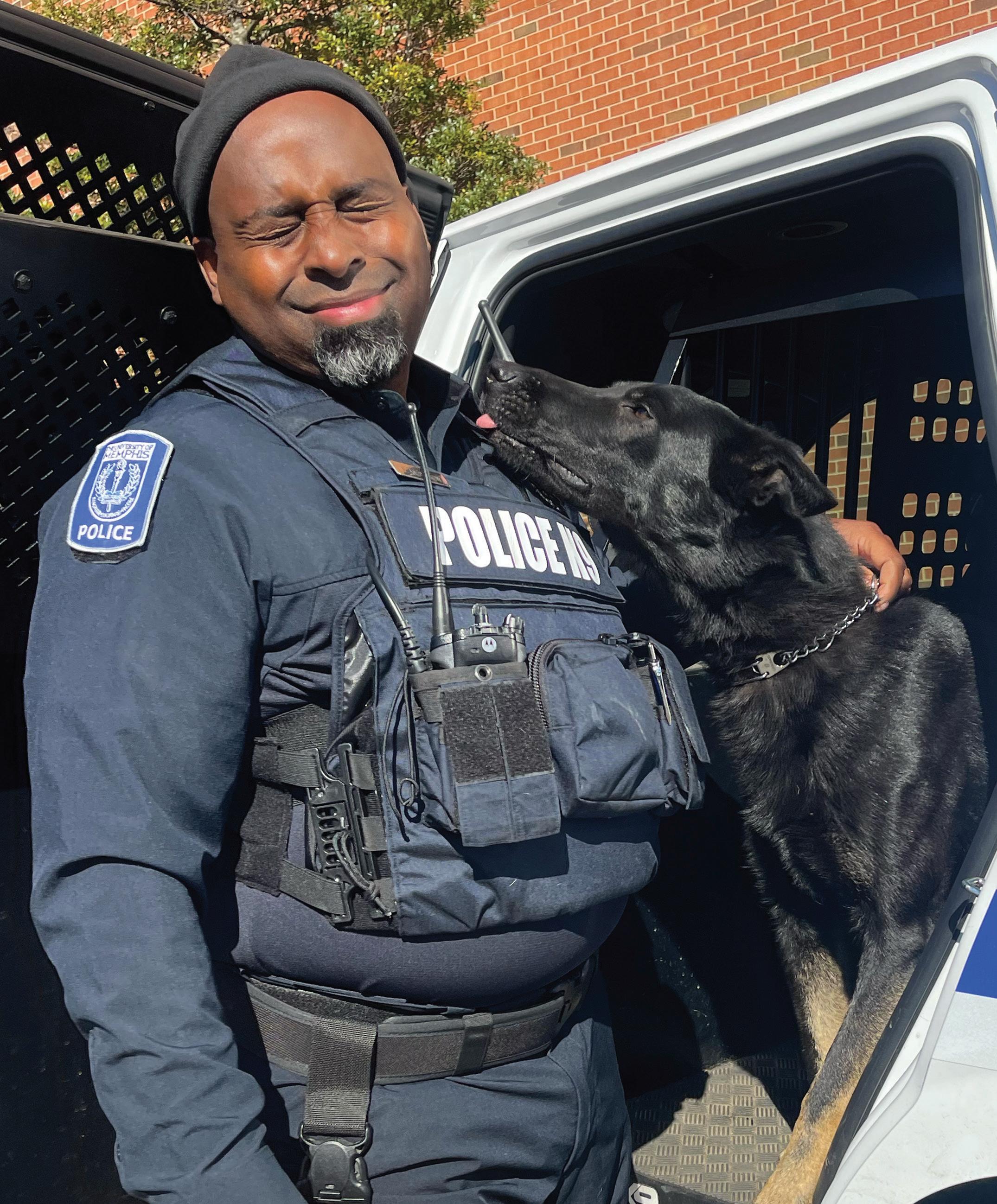

Under a sweltering summer heat, a litter of puppies was discovered in a crate between two trash cans forever forgotten.
Fortunately, these pups were saved when they were rescued by Tails of Hope Dog Rescue, a local non-profit dedicated to rescuing, rehabilitating and rehoming abused and abandoned dogs and puppies in the Memphis, Tenn., area.
Among them was a black and white puppy with a sweet disposition who would later be named Simone, after Olympic gold medalist and gymnast, Simone Biles. Her two littermates, were also named after athletes, Phelps and Kobe.
As fate would have it, around the same time Simone was found, Dr. Sally Parish, vice provost and director of schools for
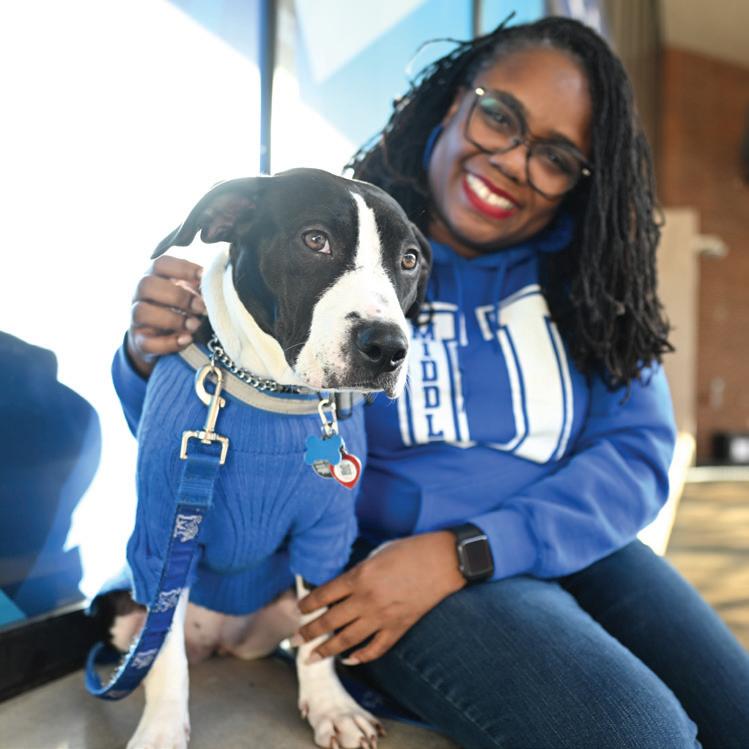
University Schools at the University of Memphis, was in search of a dog for University Middle as part of a pilot therapy dog program.
Parish, who had previously adopted her own dog from Tails of Hope, immediately reached out to the organization to see if they had any rescues who would be a good fit. Simone interviewed at University Middle a few days later, instantly capturing the hearts of students and staff.
Today Simone has a new “leash” on life as a therapy dog at University Middle.
“She was so sweet, and the kids loved her so much. I think she was here for probably five minutes when we became convinced that this is what we wanted for our school,” Kerrith Griffin, executive director of University Middle, said.
The program is made possible and funded through the Tennessee Department of Education’s Beyond Ordinary Learning Opportunities Grant, which launched July 2024.
University Middle was one of five schools in the state awarded the grant to develop and implement a therapy dog pilot program during the 2024-25 school year. West Tennessee K9 assists University Middle staff with therapy dog training.
“This grant aligns with our district mission in many ways. As the state’s first Innovative School District, a core part of our work is to try new and innovative approaches to teaching, learning and student success and to share those findings and practices with other schools and other districts,” Parish said. “In that way, what is learned here truly leaves here and can have a broader impact on education beyond our school walls. Historically that has been demonstrated through innovative instructional models — but in this case, we are one of the first schools in the region to launch a therapy dog program.”

Staff get feedback from parents daily that their children are excited to attend school just so they can see and play with Simone.
Among Griffin’s favorite stories about Simone’s impact on students is one that involved a student who wanted to go home. The student was reluctant to share the reason why they wanted to go home in the first place, so Griffin decided to bring Simone so that they could all go on a walk together. After the walk, Griffin said she would call their mom so that they could go home for the day. Shortly after the interaction, the student decided all was well and they wanted to stay in school and go back to class afterwards. “I was so excited that without effort and just by being herself, Simone was helping the student process their emotions and just feel better,” Griffin said.
Simone’s schedule includes going around classrooms to interact with students to calm them during lessons and to reduce anxiety before quizzes and exams. She can be seen roaming in the halls. Her favorites are reading time in “her chair” in Mrs. Jeanine Akers’ class and art time with Mrs. Robin Webb.
“Simone’s impact has surpassed anything we could have ever imagined,” Parish said. “I have seen firsthand the joy that she brings to our students, faculty and families alike. Students’ faces light up when they see her, and she immediately brings joy into any room she enters. As educators, we have no idea what our students have experienced at home before they get to school each day, or what they will go home to at the end of the day. And for some of our students, Simone is a reason to get up and come to school. She is an outlet for some of our students to channel their care and compassion, when perhaps they don’t have that outlet at home. And for some of our students, she is a friend to turn to when they just need a reason to smile.”
University Middle continues to partner with Tails of Hope by bringing them to campus to educate students about animal advocacy and rescue.

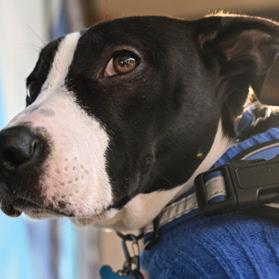
Students, staff and parents have welcomed Simone with open arms. “She has been such a gift to the entire University Schools' community, and it's exciting to consider that we get to watch her grow alongside our students in the years to come,” Kelsey Ryan, director of Student and Family Engagement, said.
Named for Olympic gold medalist Simone Biles. Loves playing with her friends at UMiddle. Loves dressing up and wearing cute clothes. Loves to chase squirrels and falling leaves. Loves doorstops and stuffed animals.
Loves reading in her chair in Mrs. Akers’ class.


By Heather Hampton
Some say that parenting is simply a long and slow process of letting go.
With the arrival of a newborn, parents settle into their roles of being total and constant caregivers for their child. Along the way are celebrations of milestones like first steps, first tooth, first foods and first words. Through each phase of a

child’s growth and development, parents adjust and adapt, making all the major decisions in their child’s best interest. They help to acquire knowledge, build skills and instill values, hoping to give them the best foundation for a good life.
As the child becomes an adult and enters college, there is a changing of the guard.
The gradual drip of this “letting go” process suddenly becomes a raging flood filled with giant waves of emotion, carrying with it the debris of stress, excitement and worry. While this transition is inescapable, it is important, and often a relief, for parents and family members to be reassured that their roles are only changing and not ending.
This is exactly what UofM parents Richard and Cheryl DeLisio experienced when their daughter, Gianna, became a student at the University of Memphis.
Gianna was their last child, their baby, and although they’d been through this transition before, they still felt an overwhelming feeling of anxiety. Watching her leave for college and start her own path into the unknown was a rewarding thing, yet it left them with nagging questions.
Would she thrive away from their home? Would she not need them anymore? Would she remember the value of hard work?
As a first-generation family, they wanted Gianna to get an education well above and beyond what they did themselves. Although he did not attend college, Richard, a 24-plus year U.S. Navy veteran, worked hard to provide a better future for their children. Hard work was at the core of all the sacrifices he made, and it proved to be a centering quality for Gianna.
“All my children are very successful because of that philosophy of hard work,” Richard said. “Gianna is the one of the hardest working people I know, and I believe my service in the Navy shows through her hard work."
Gianna chose biomedical engineering as a major because she aspired to use her love of creativity to develop innovative solutions that improve medical technology. But in the beginning, she floundered.
“When I first came to the UofM, I was anxious and did not know what to expect when it came to classes, living in a dorm or managing the new responsibilities that come with college,” she acknowledged.
Factoring in the rigorous nature of a double major in Biomedical Engineering and Mathematics and a minor in chemistry, there were numerous times that Gianna doubted herself when it came to the rigor of coursework.
"After getting through the first half of my first semester, I started to push past the anxiety and started forming connections by talking to students within my classes and my residence hall,” she recounts. She had begun to flourish through her own resilience and with her parents’ encouragement and guidance.

“Though college is about the student furthering their education and personal growth, it is important to recognize the people who helped along the way.”
“I think we were shocked but not surprised that Gianna would nominate us. However, actually being chosen as Family of the Year was a complete and utter surprise.” they said.
Gianna was also elated when she learned that they had been selected as Family of the Year.
“When I found out my parents were selected for UofM Family of the Year, I was excited to tell them because it was a way to thank them for their endless support and building a foundation that led me to the UofM,” Gianna said.
During Parent and Family Weekend, the family was recognized during the football game and the Family Brunch. The DeLisio’s said they loved the camaraderie at UofM football games and tailgates and enjoy meeting all the different families with various backgrounds between the game and brunch.
With encouragement in their hearts, the DeLisio’s want families who are facing their own “letting go” process to embrace the change.
“My parents were always there, whether by phone call, taking me out to dinner or simply buying my favorite snacks,” Gianna said.
Thinking of the unwavering support her parents had given, and their constant reminders of how hard work pays off, Gianna decided to honor them by nominating them for UofM Family of the Year.
“Though college is about the student furthering their education and personal growth, it is important to recognize the people who helped along the way,” she said. “Nominating family members for Family of the Year is a special way to allow one's family to know how truly thankful you are for their support.”
The nomination was not something Richard and Cheryl expected.
Richard and Cheryl both echoed the sentiment: Our dreams should not become our children’s. Let them go out and discover this world on their own. Let them face their own challenges and make mistakes.
Supporting Gianna from afar and seeing her success as a student has even sparked its own kind of inspiration.
“Watching her become a successful young lady has inspired me to go out and not be afraid to try new and uncomfortable things,” Richard said.
While letting go is hard, it is an act of love that always leads to living.
The University of Memphis announced the development of the Liza Wellford Fletcher Stadium – a state-of-the-art facility dedicated to the memory of Liza Fletcher, a former UofM soccer player.
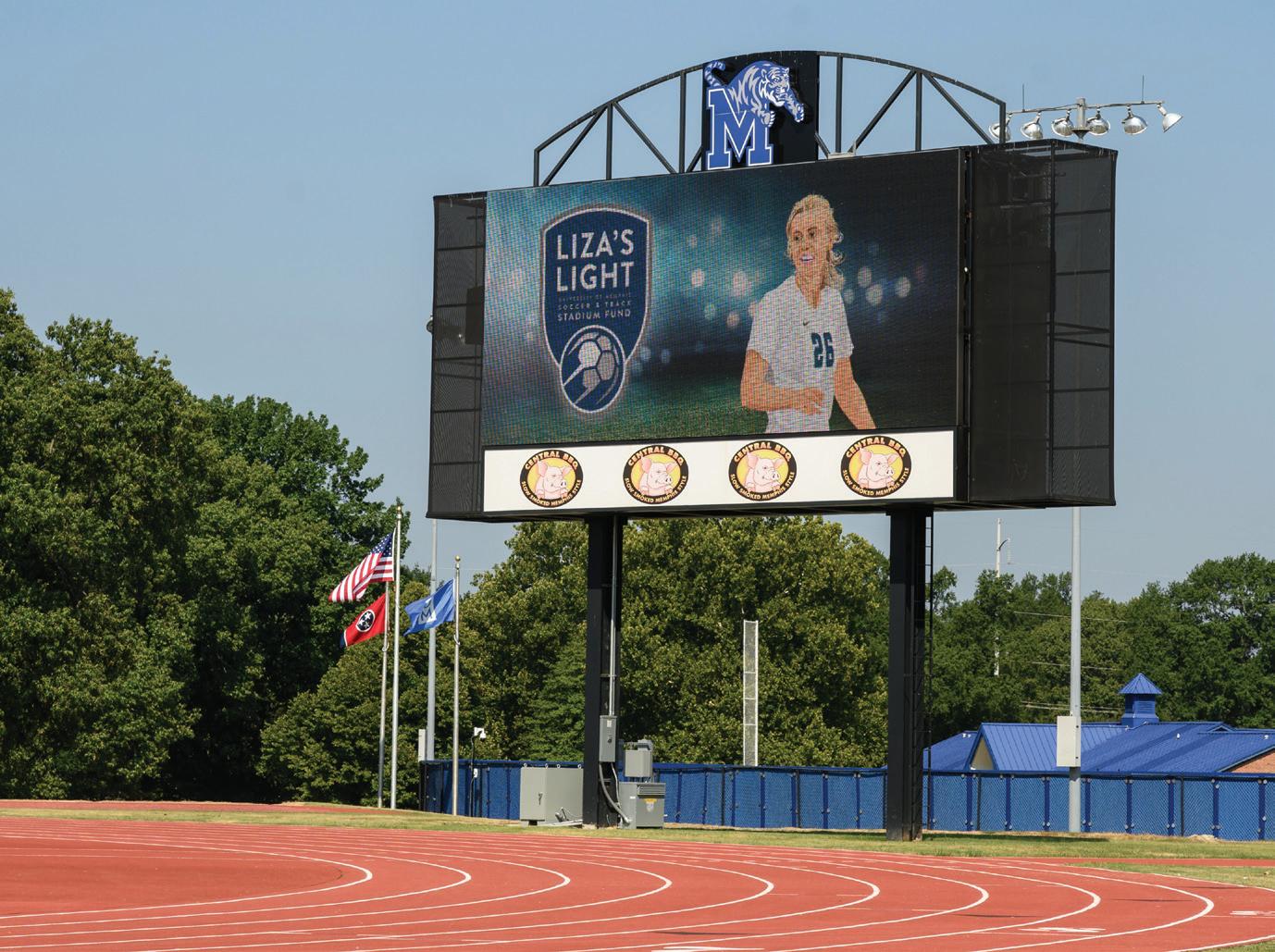
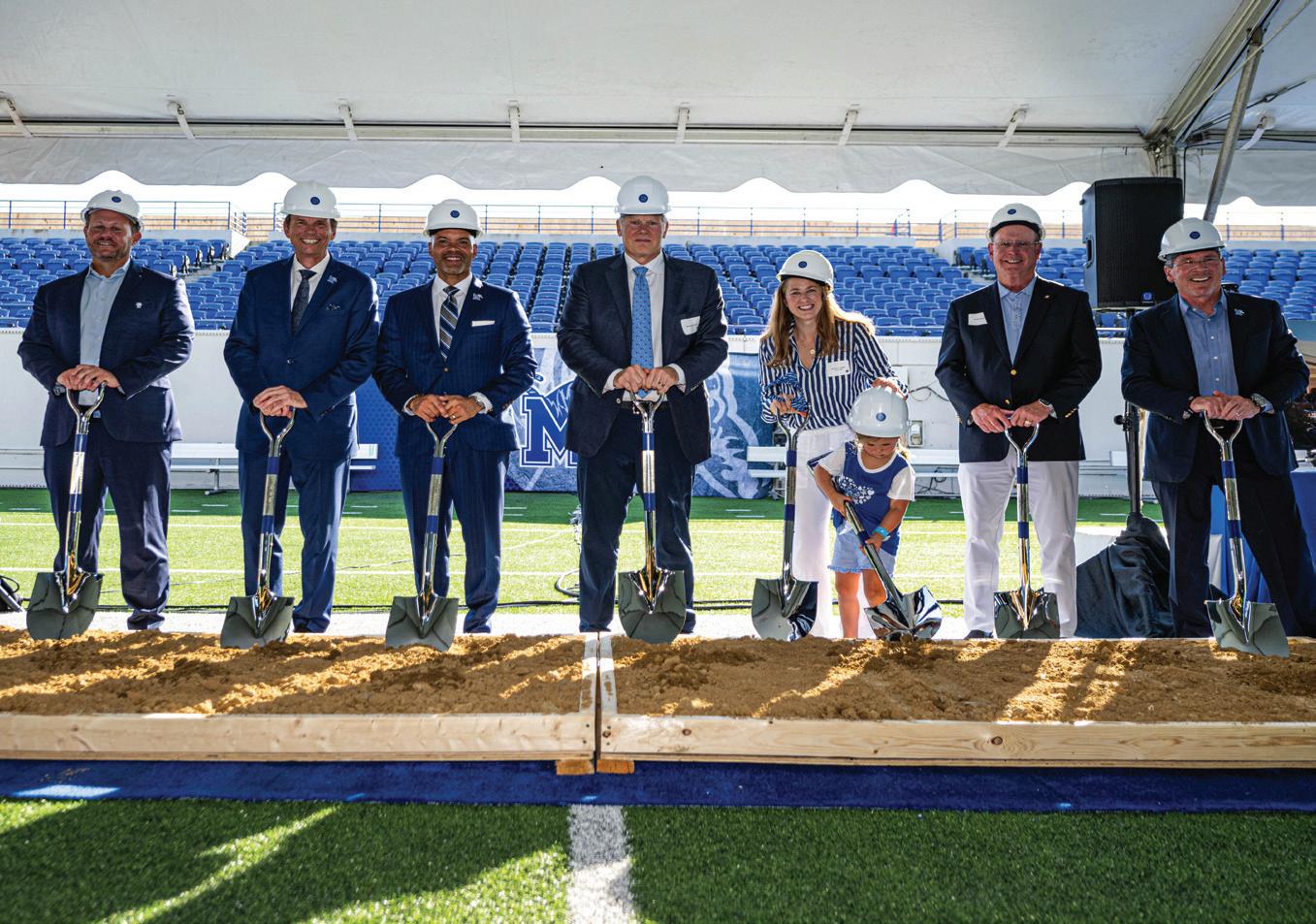
FedEx honored memory of alumnus and longtime FedEx employee, Gene Williams, with a scholarship for three things he loved — the UofM, FedEx and the Boy Scouts of America (BSA). Mechanical Engineering student and Eagle Scout Brian Cassady was the recipient.
The UofM celebrated Phase 2 of the Simmons Bank Liberty Stadium renovations with a groundbreaking.
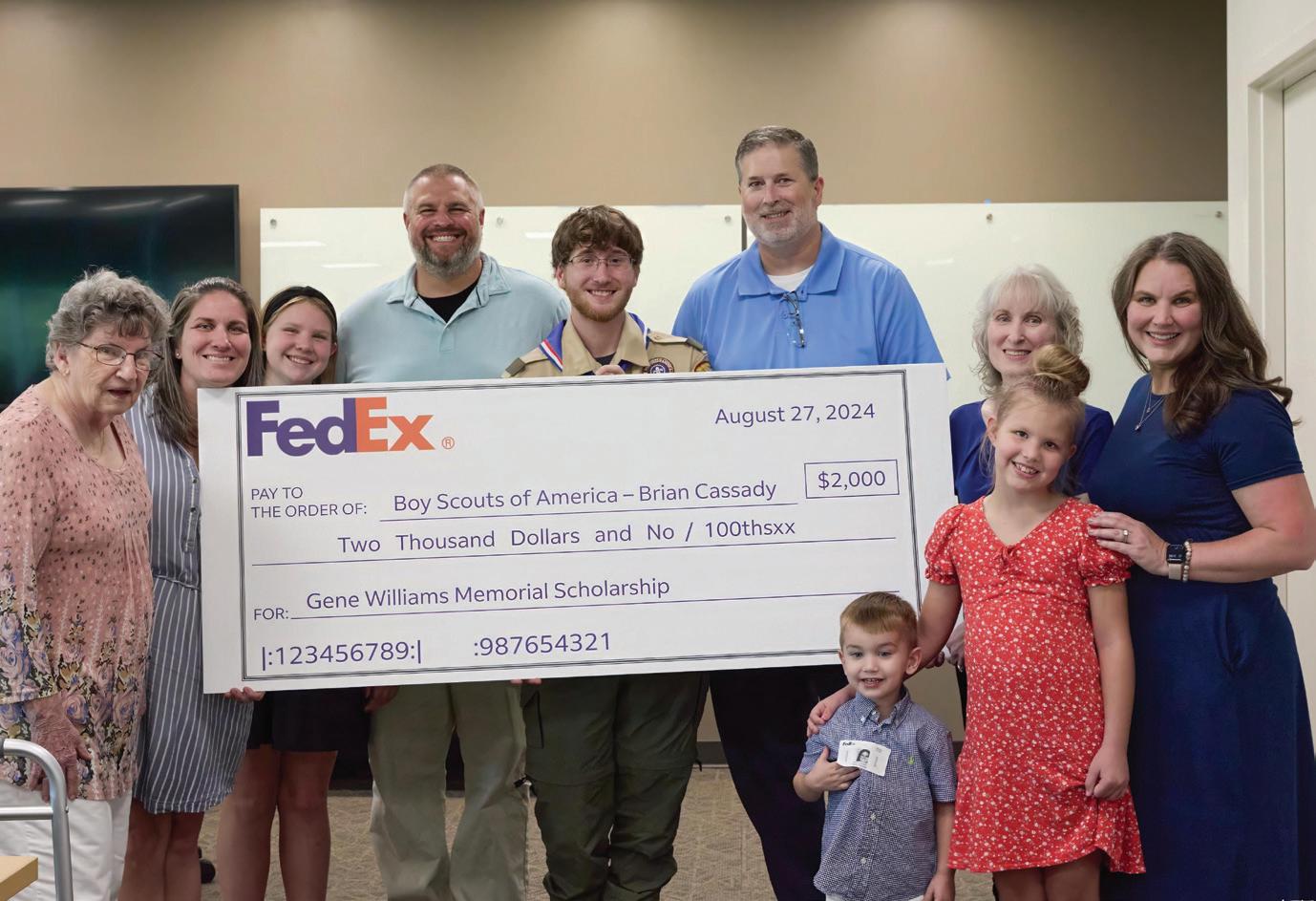

Oct. 9: Premiere
Amazon Prime’s “The College Tour” premiered at the Scheidt Family Performing Arts Center. The episode featured 10 UofM students sharing their Tiger student experience.

Dec. 11:
Several families shopped alongside the Tiger basketball team as the UofM joined forces with Kroger and the Boys & Girls Clubs of Greater Memphis, providing $1,000 to 25 families to shop for groceries during the holidays.
The University of Memphis athletic department recorded the highest departmental GPA ever during the fall 2024 semester, recording a 3.404 grade point average with 16 teams coming in at a 3.0 or higher for the term.
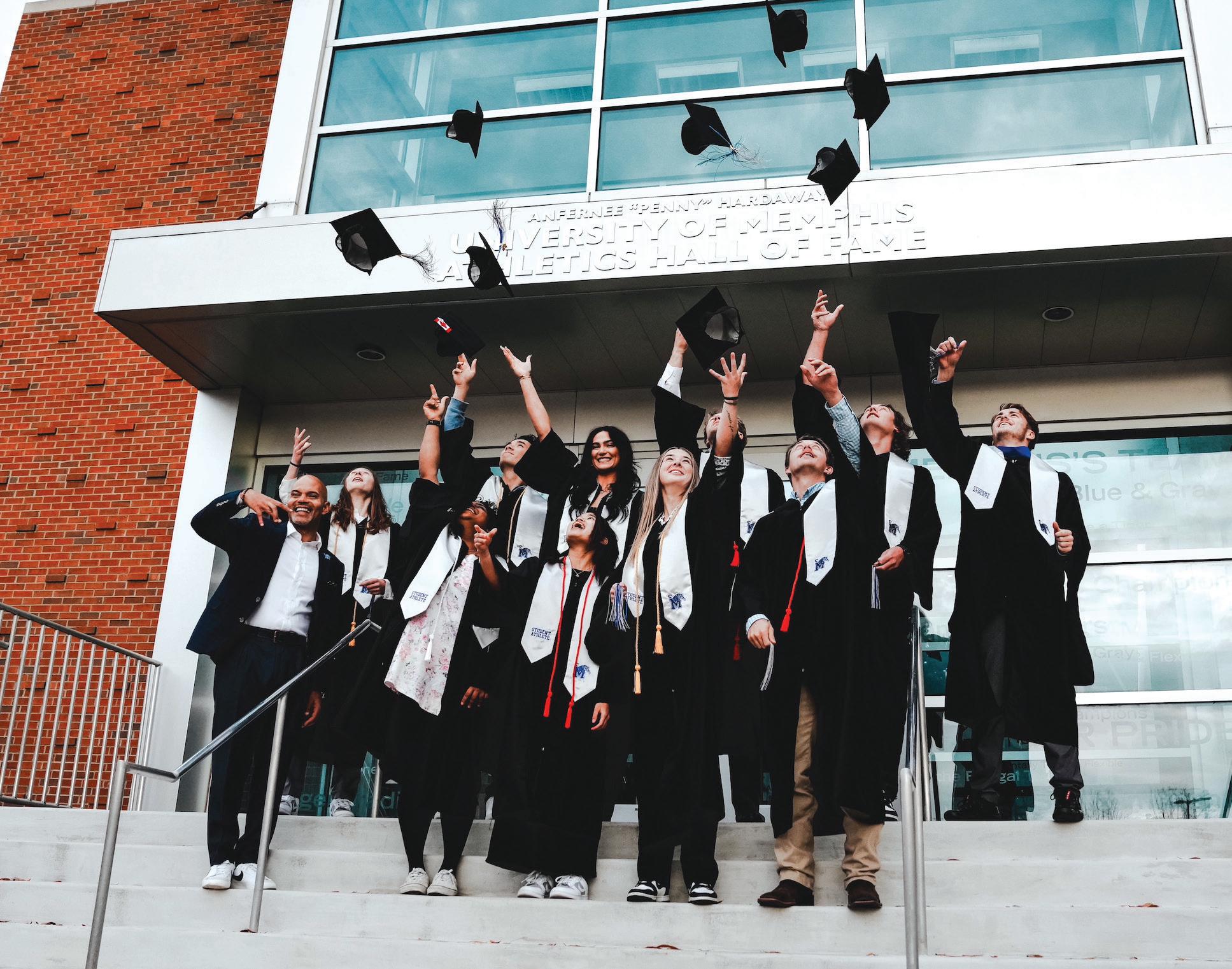

The Central Campus is blanketed in snow.
After an 11-2 season that saw Memphis secure its fifth-straight bowl title with a win over West Virginia in the Scooter's Coffee Frisco Bowl, the Tigers finished the season ranked in both the US LBM Coaches Poll and AP Poll.
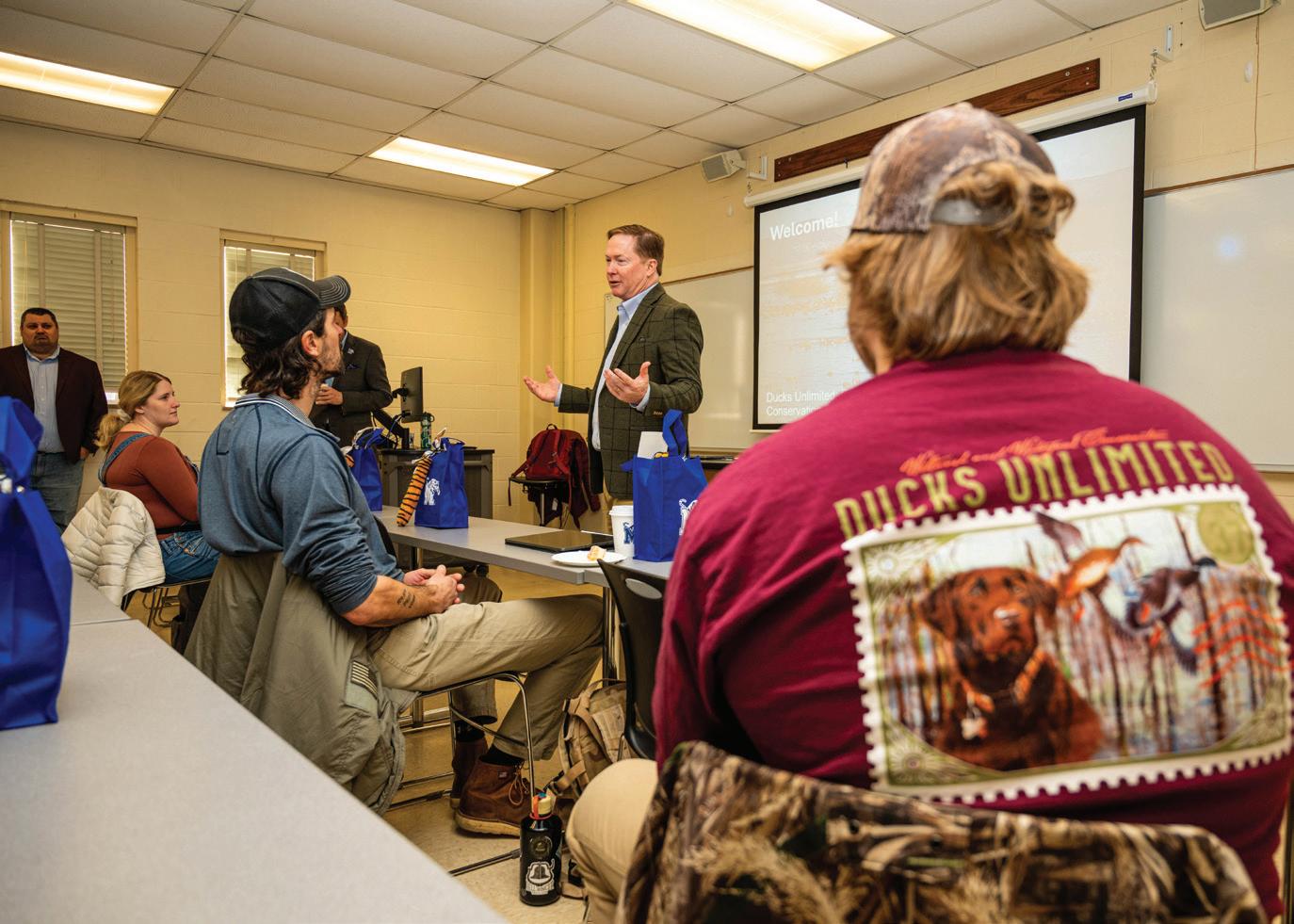
The Maxine A. Smith University Center celebrated the grand opening of the Ron Hart Foundation Market Nxt which uses an innovative technology called “Just Walk Out” by Amazon that allows students to enter and exit the store with a payment method and bypass the checkout lines altogether.

Ducks Unlimited CEO Adam Putnam stopped by on the first day of class of a new course at the UofM that gives students the opportunity to earn an Ecology Conservation and Management Certification while also gaining course credits toward graduation.

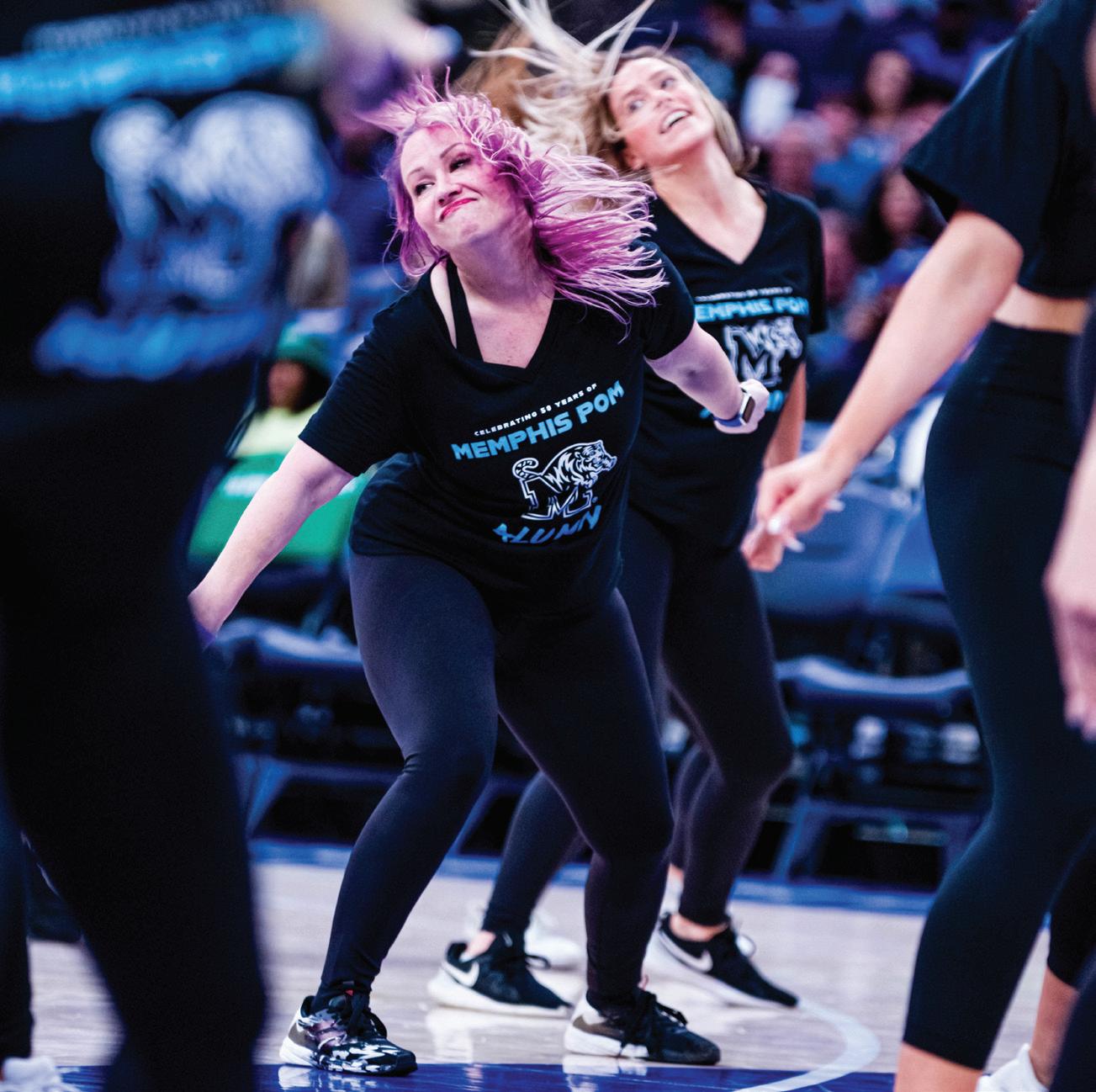

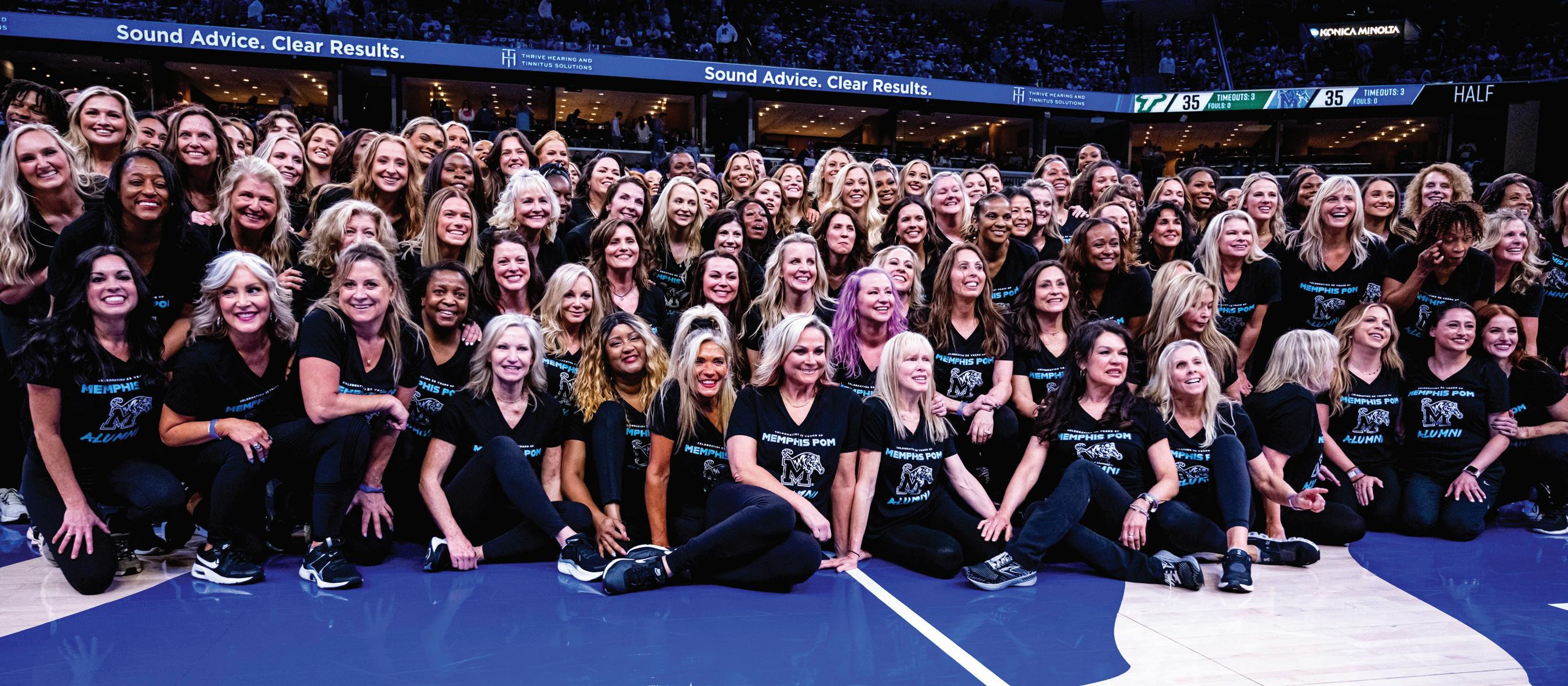


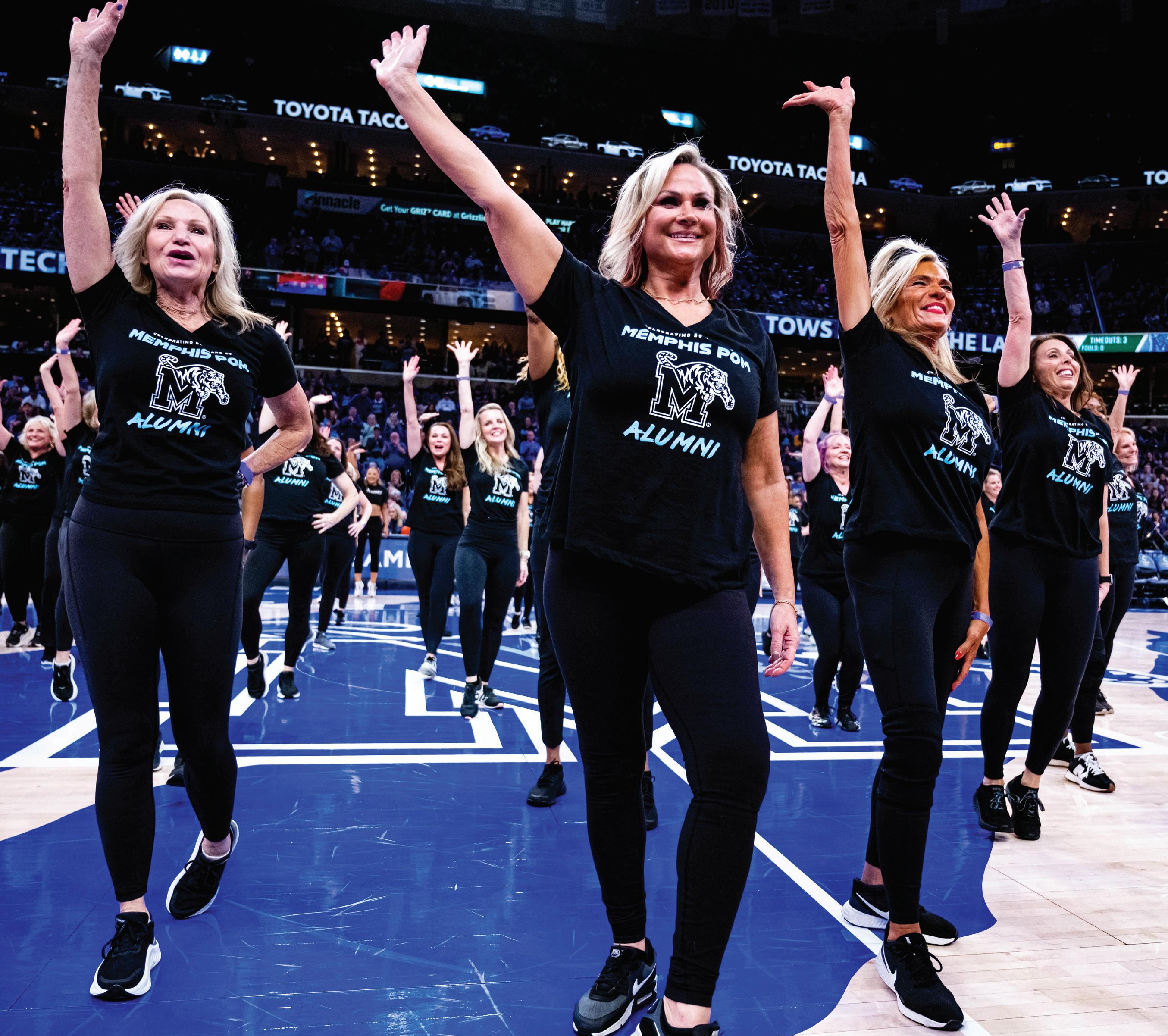

Memphis Pom celebrated their 50th Anniversary with nearly 150 Pom Squad alumni performing during the halftime show.
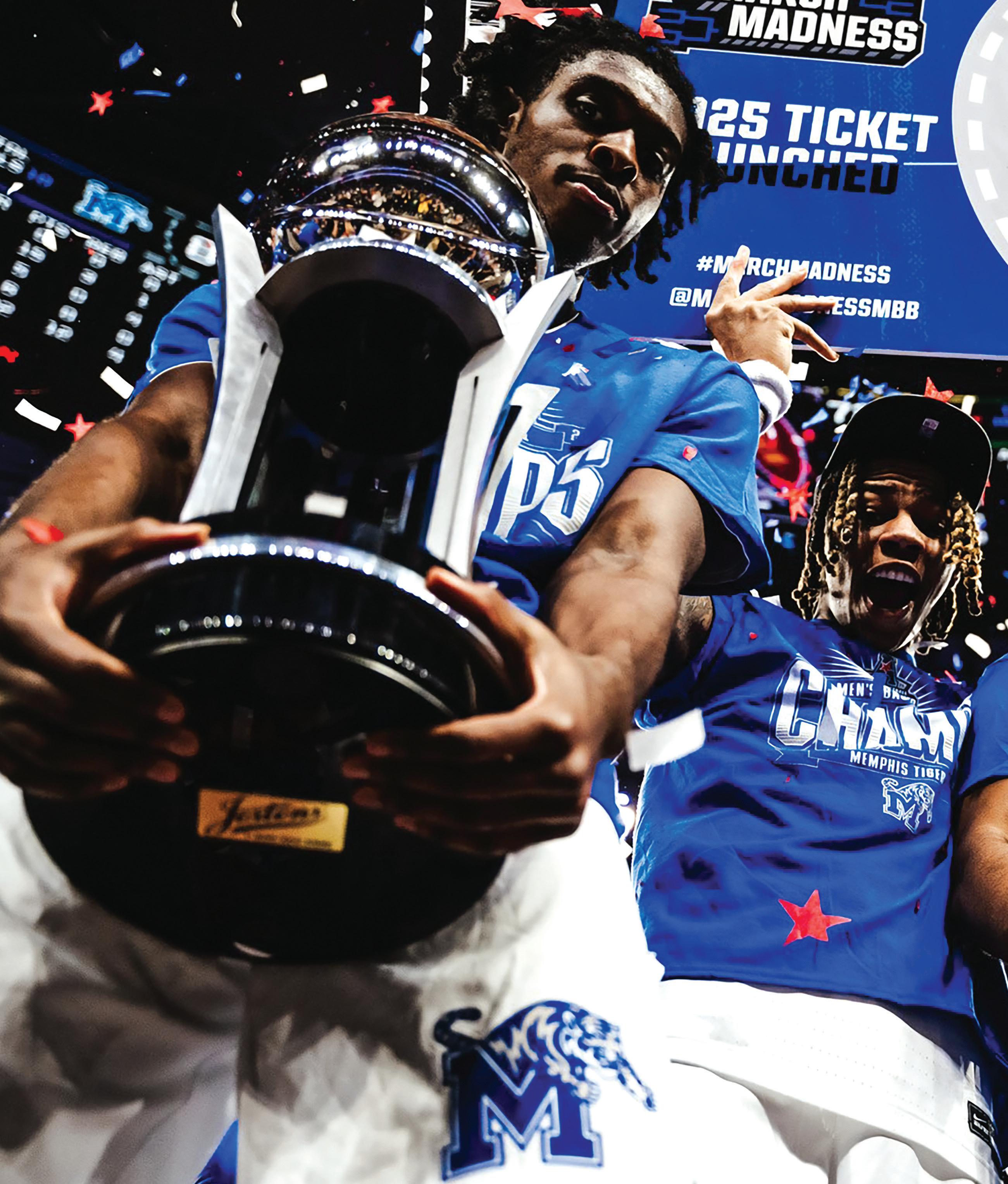
March 16: Conference Sweep
Memphis becomes the first AAC team to win both the regular season and tournament crowns in the same season.


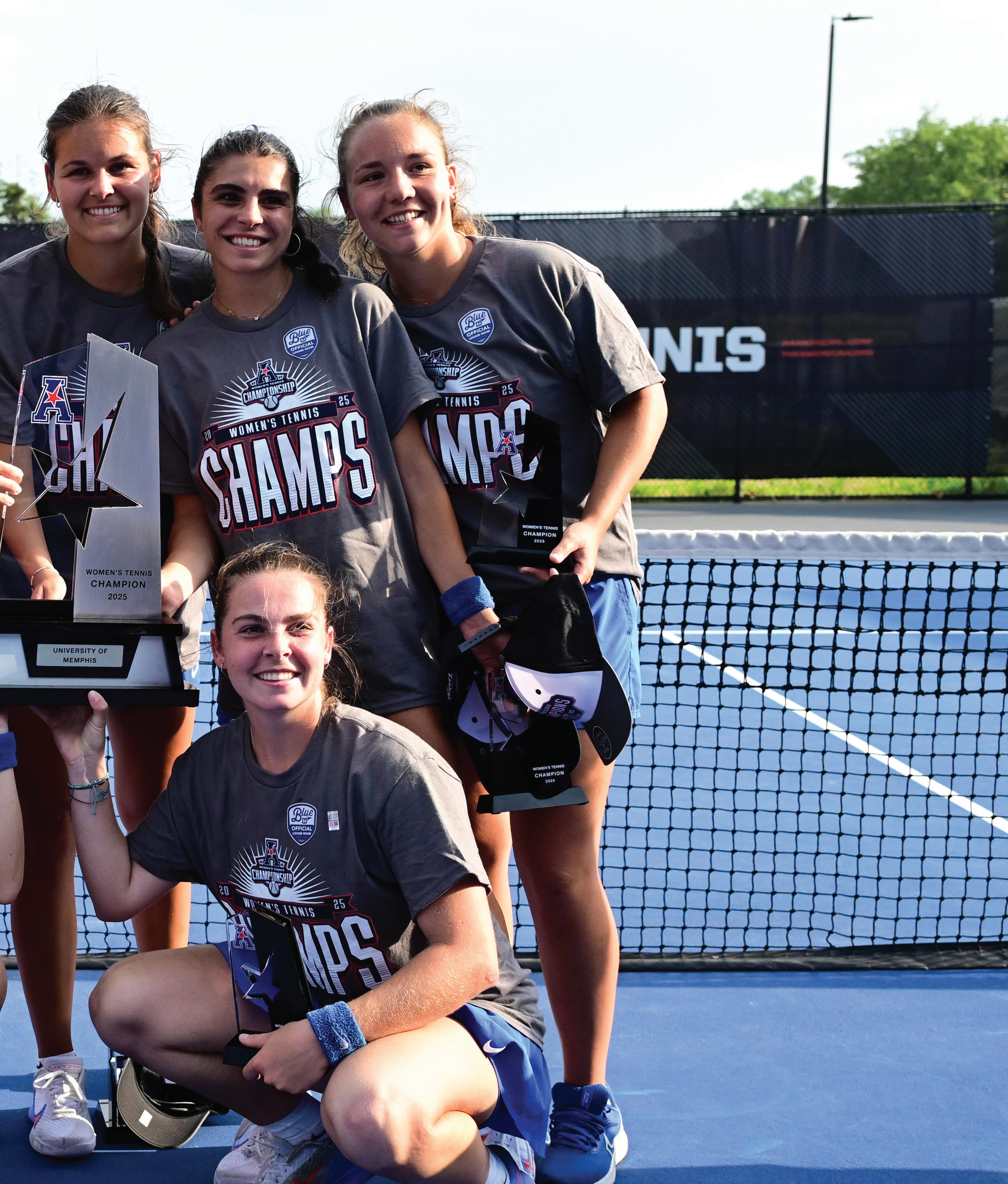
Women's tennis defeated Tulsa 4-2 in the American Athletic Conference championship match at the Leftwich Tennis Center.






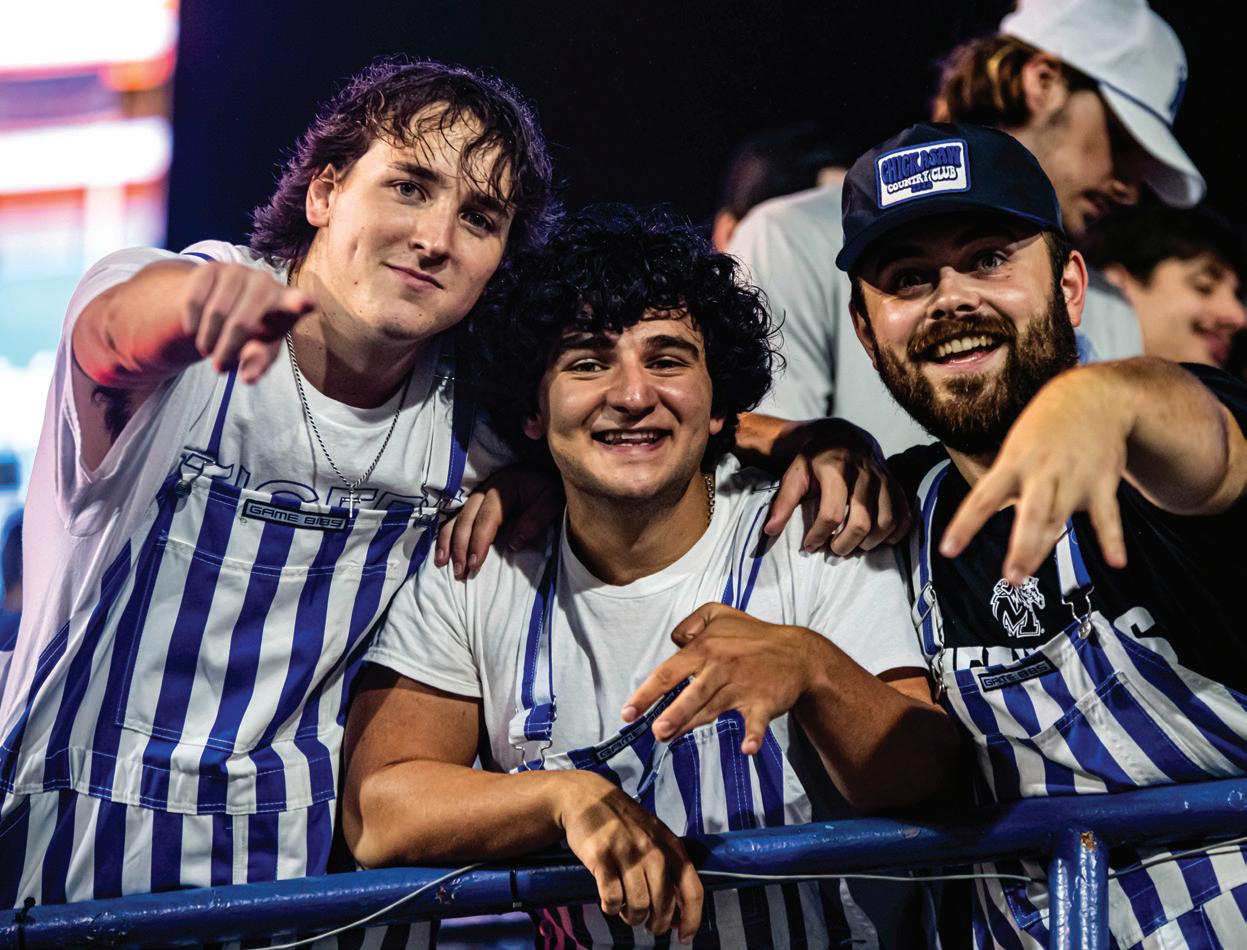
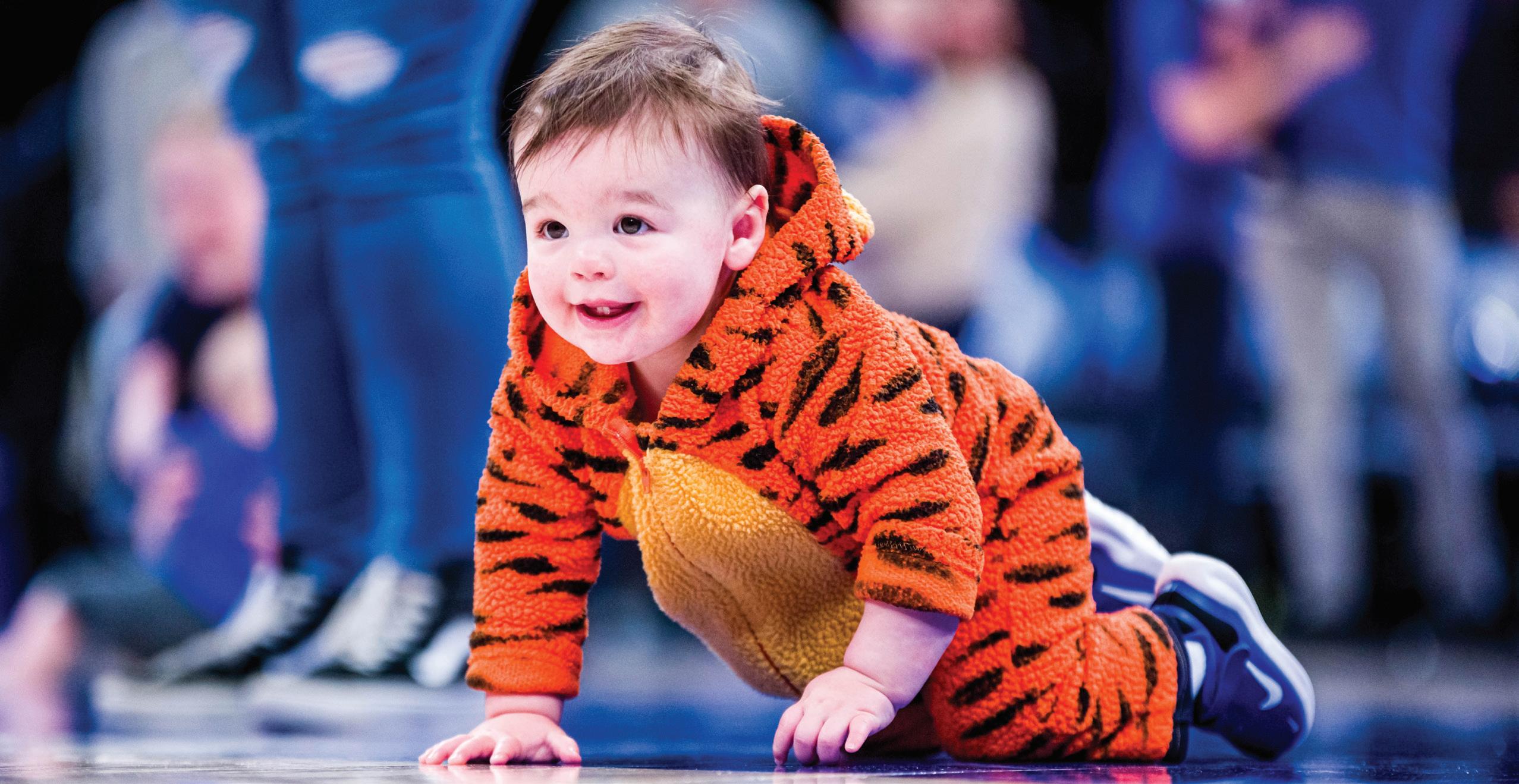
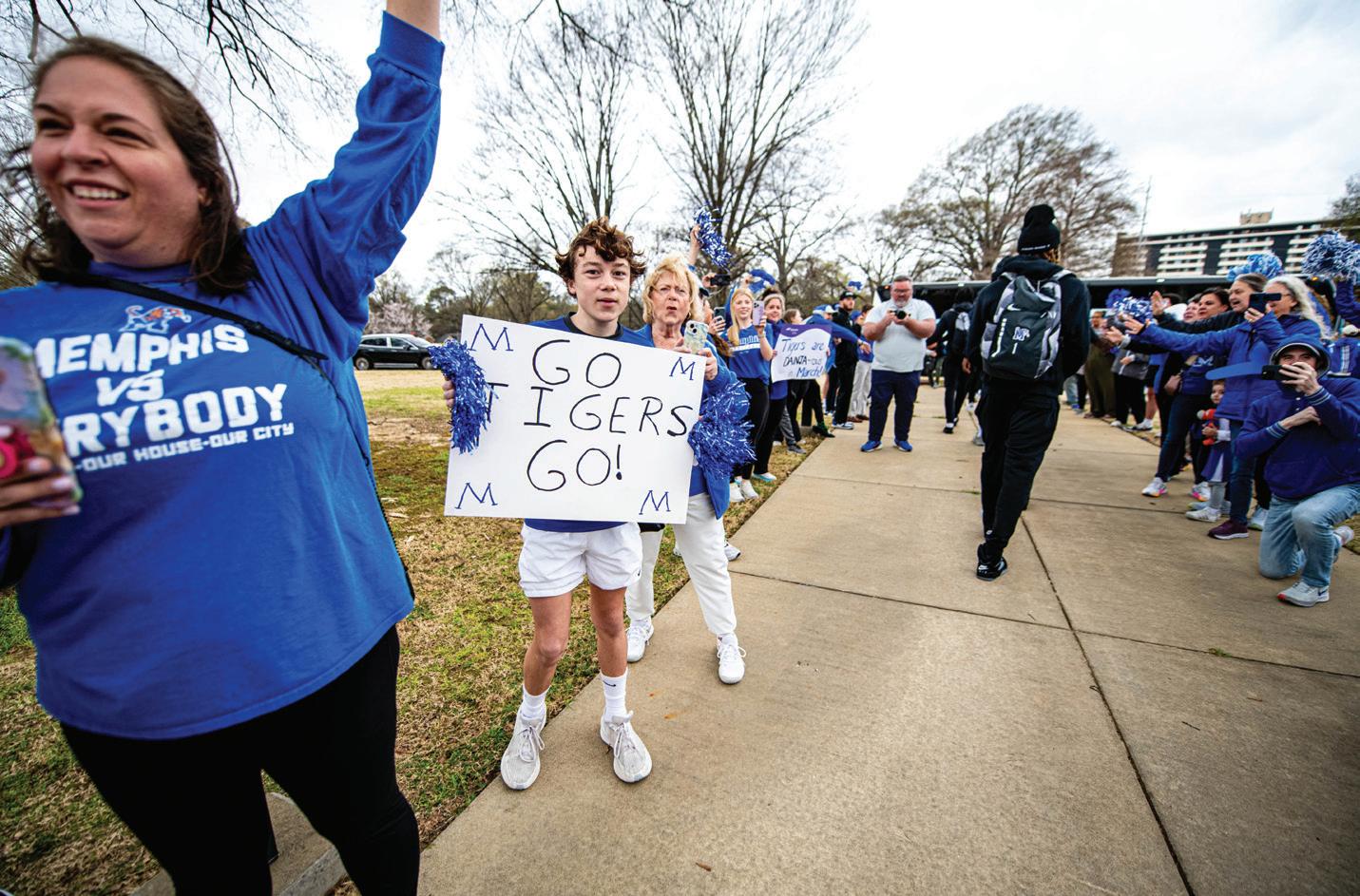

(Aug. 12, 1940-July 12, 2024)

The University of Memphis mourns the passing of Luther C. McClellan. As a member of the Memphis State Eight and the first African American graduate at our institution, Luther was a trailblazer for our University and a beloved member of the Tiger Family. His perseverance paved the way for many and allowed the UofM to become the institution it is today. He will be missed and forever remembered.

(August 6, 1951-April 4, 2025)
The University of Memphis is deeply saddened by the passing of Dr. Tom Nenon. Since joining the faculty at the UofM in 1985, Dr. Nenon served as a passionate advocate for our institution in a variety of roles over the past 40 years. His impact on the University was significant, and he will be remembered as a dedicated mentor, leader and friend. Our thoughts are with Dr. Nenon’s family.
